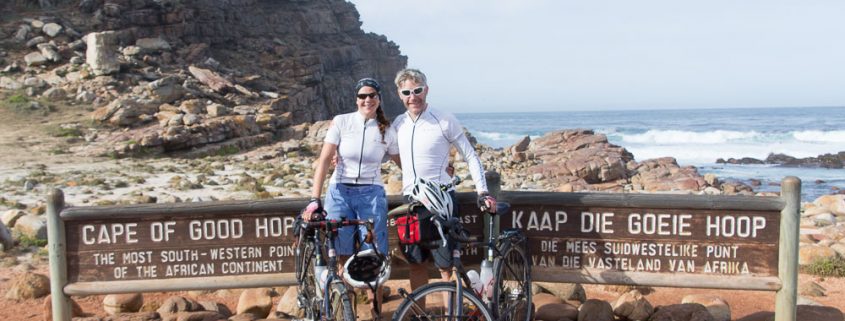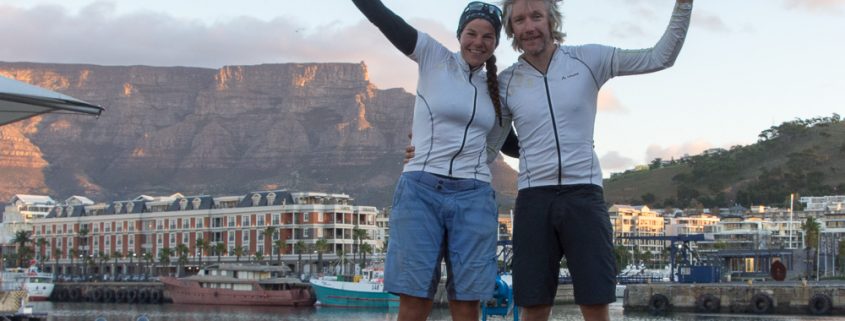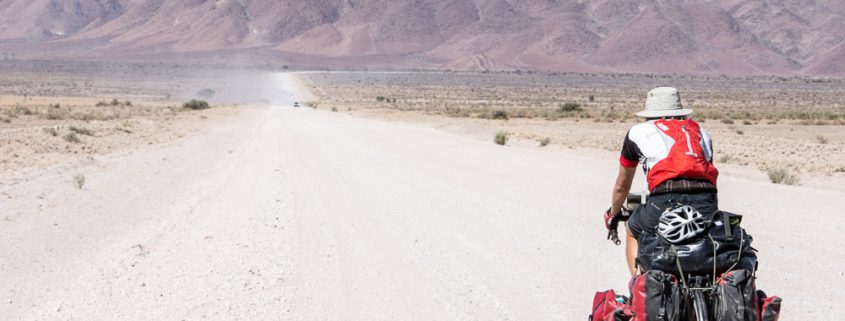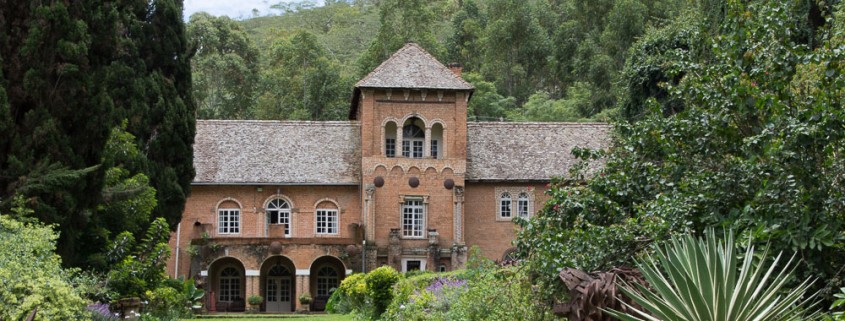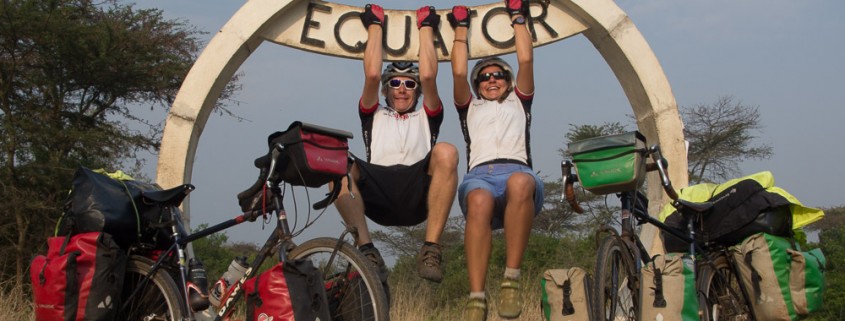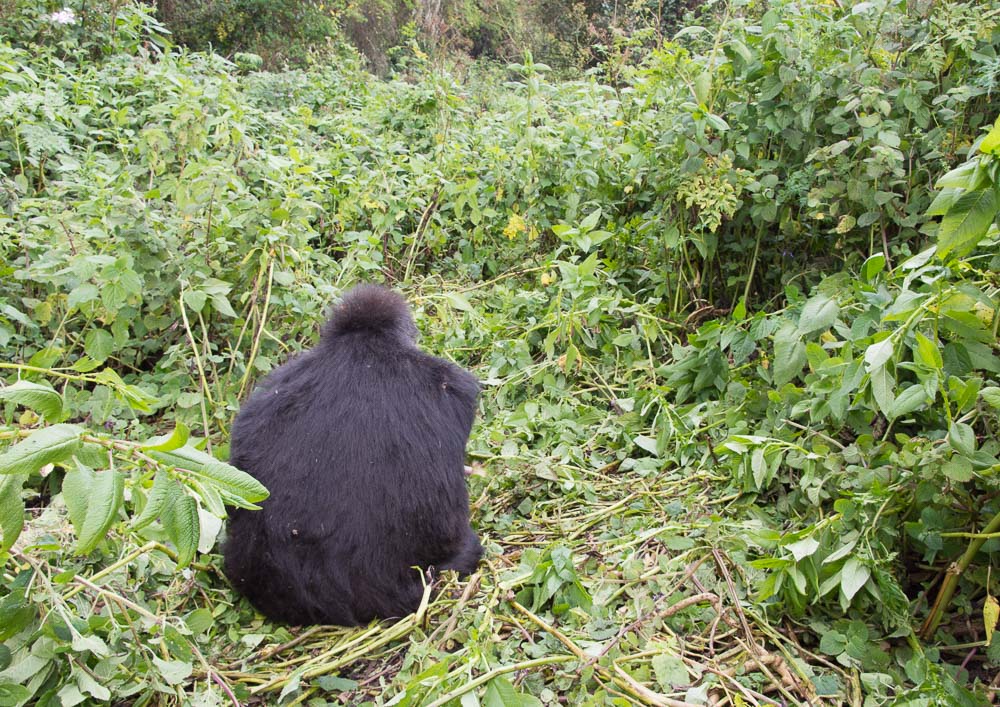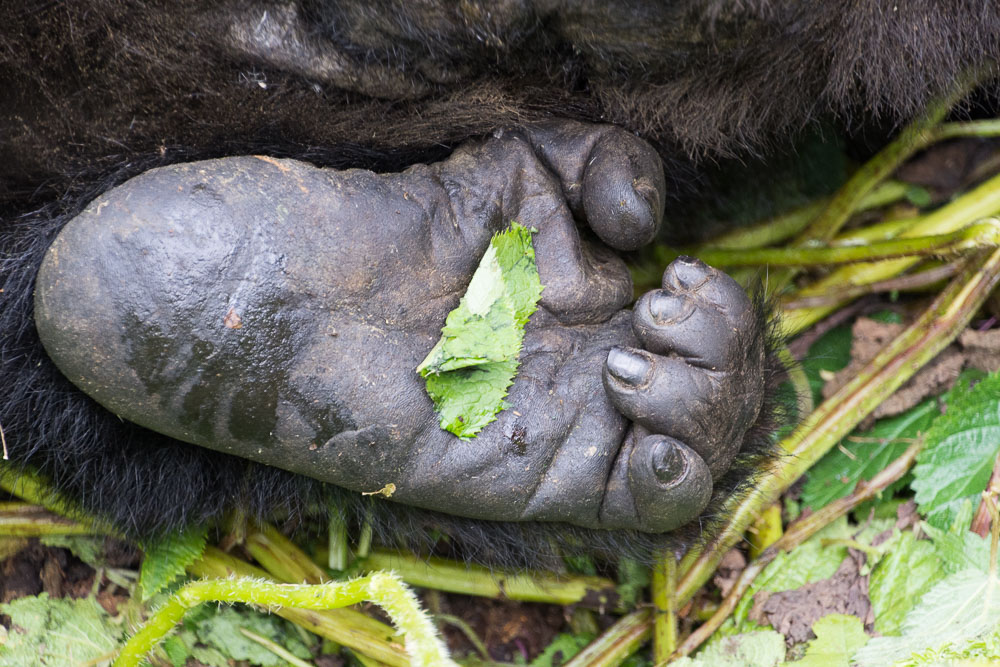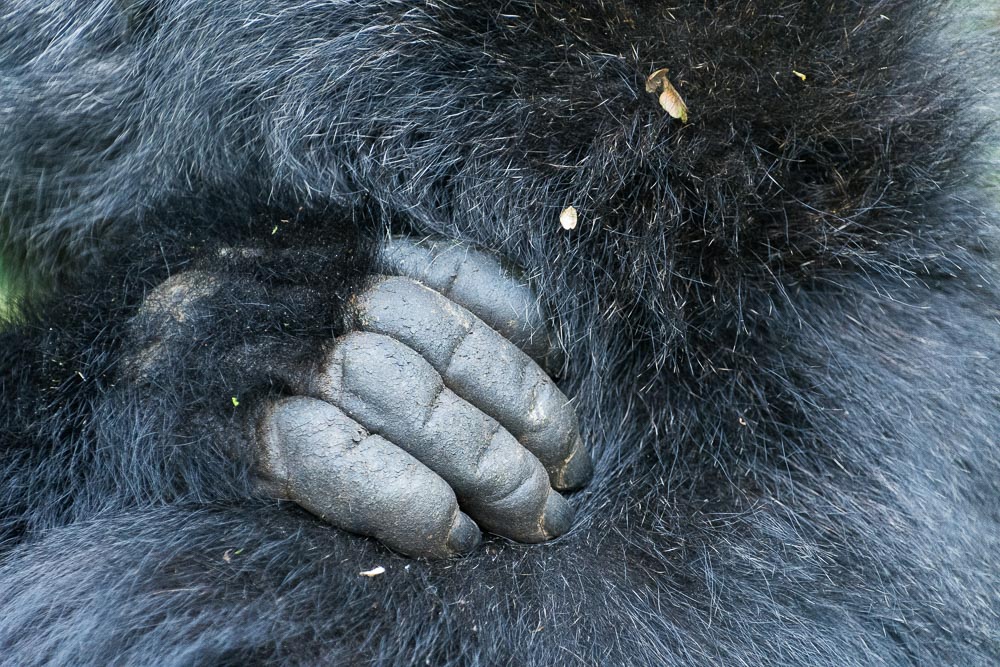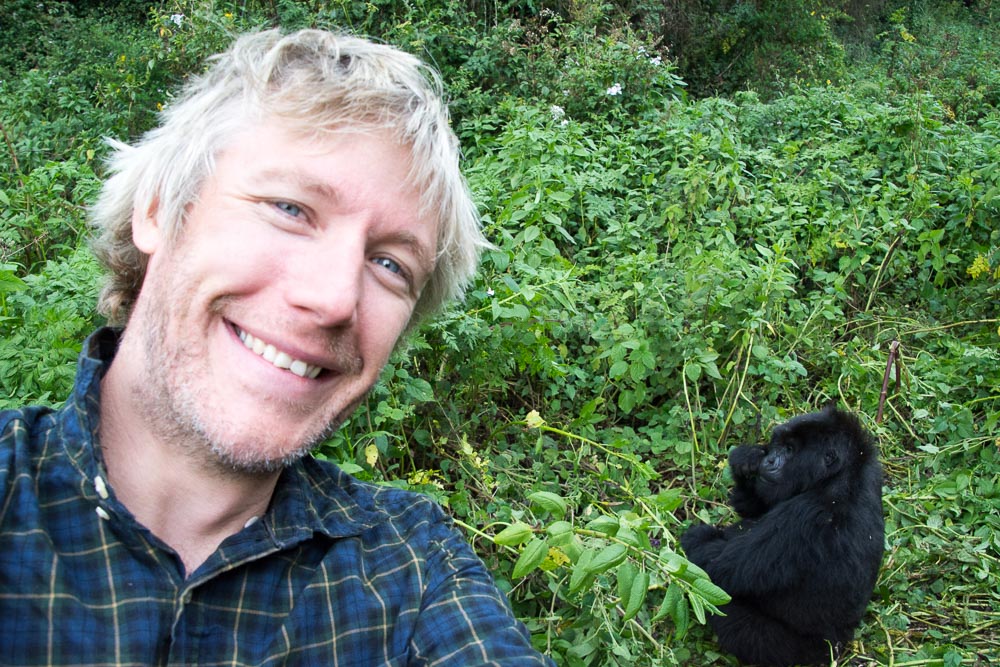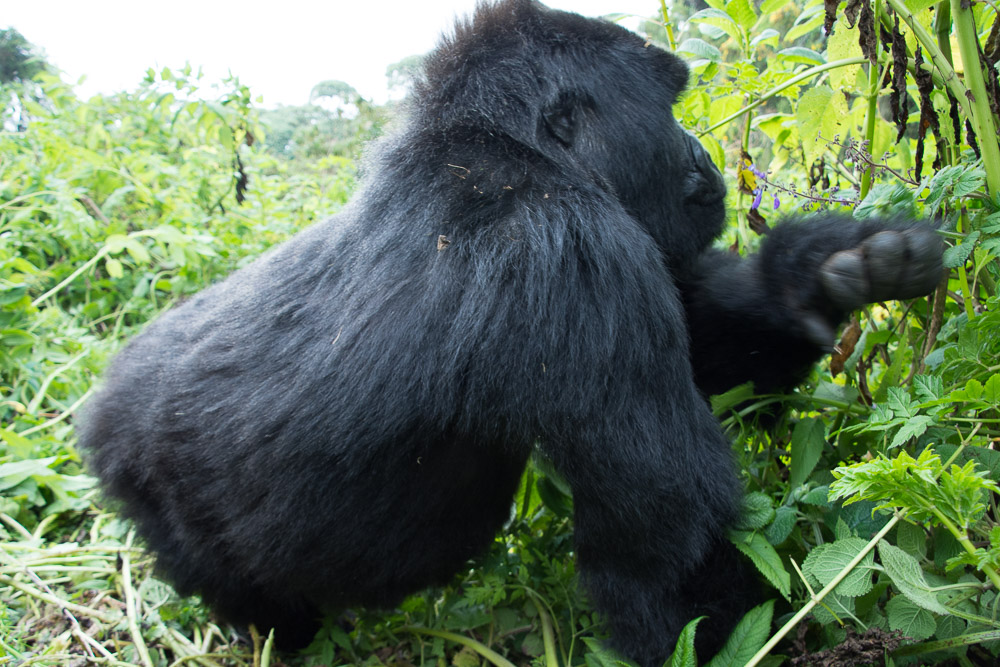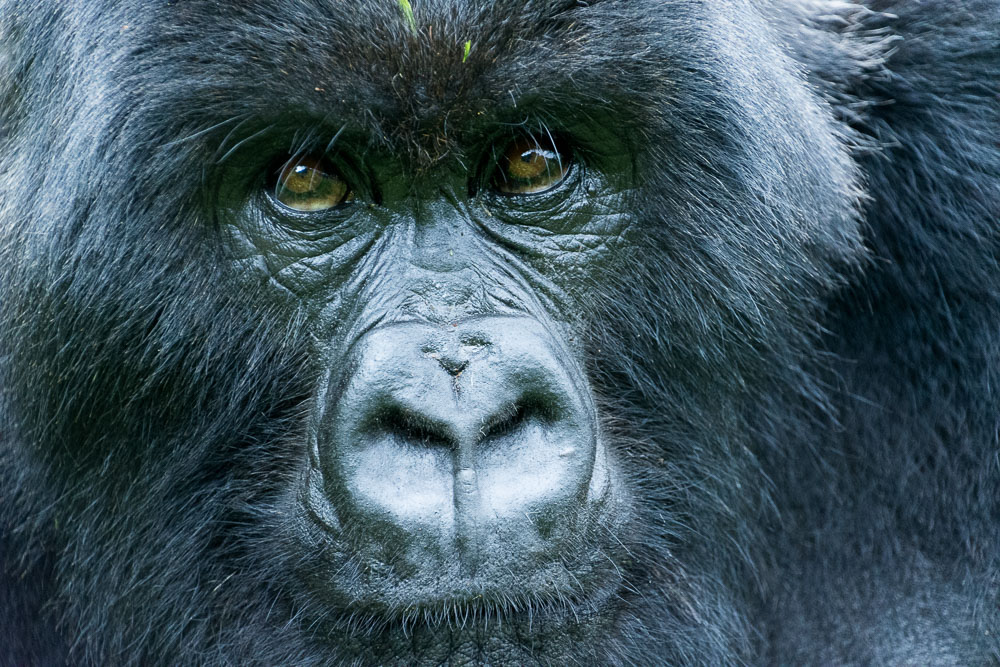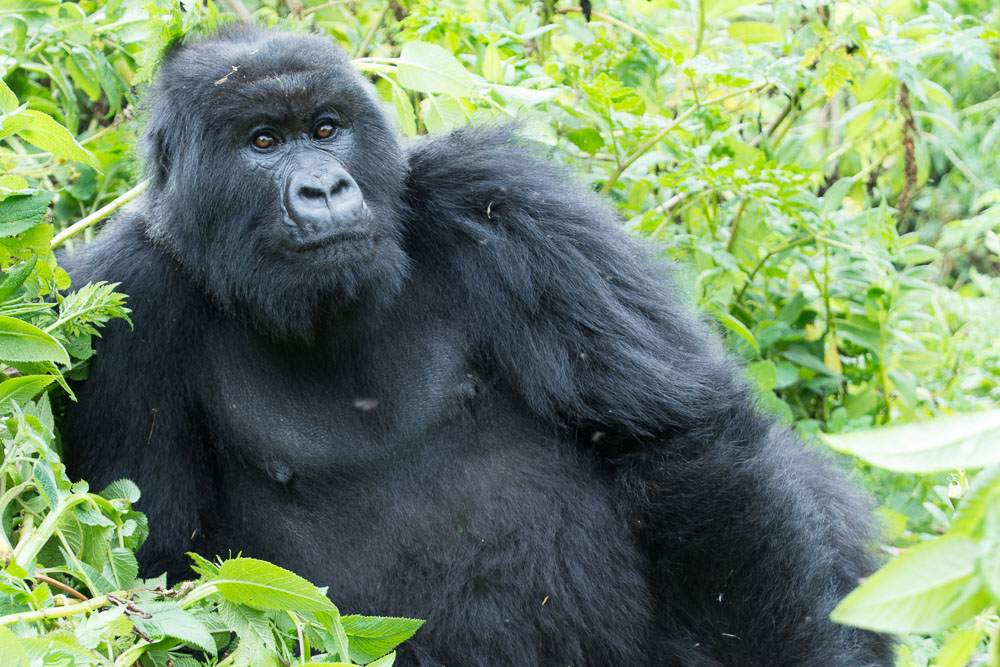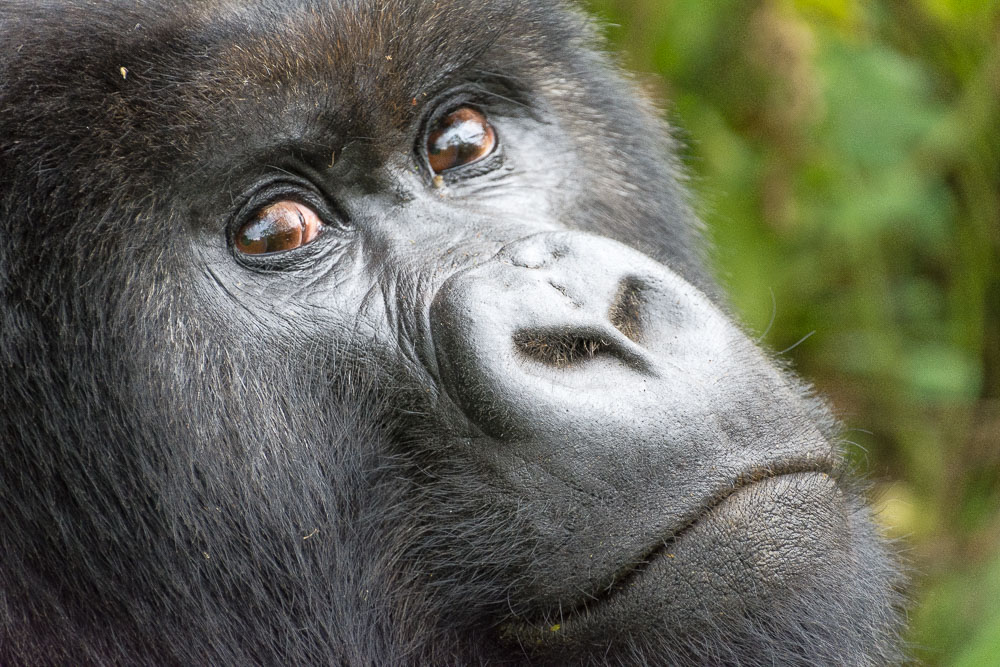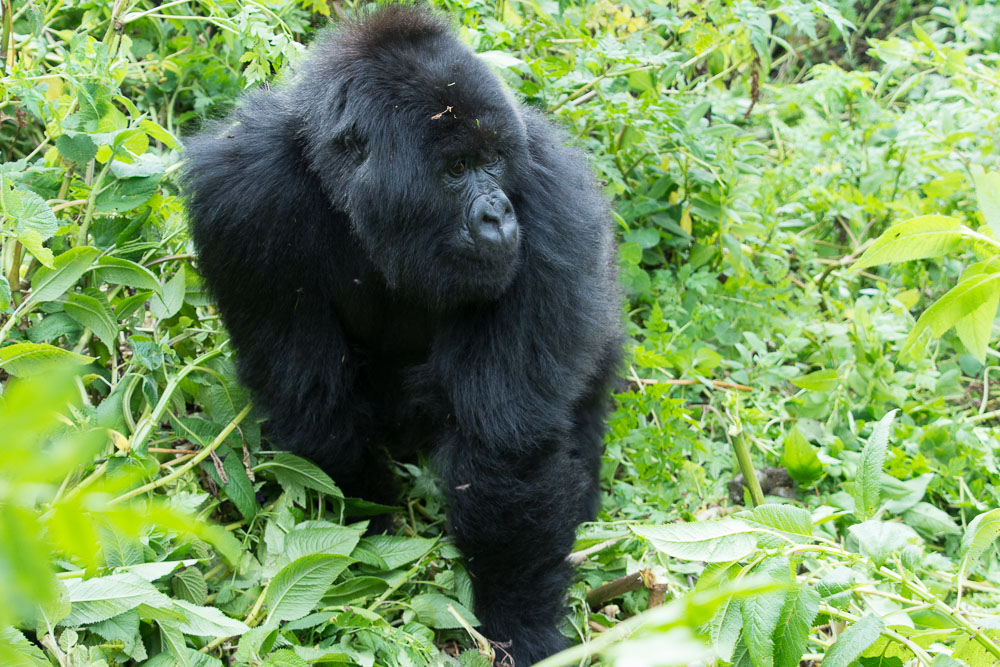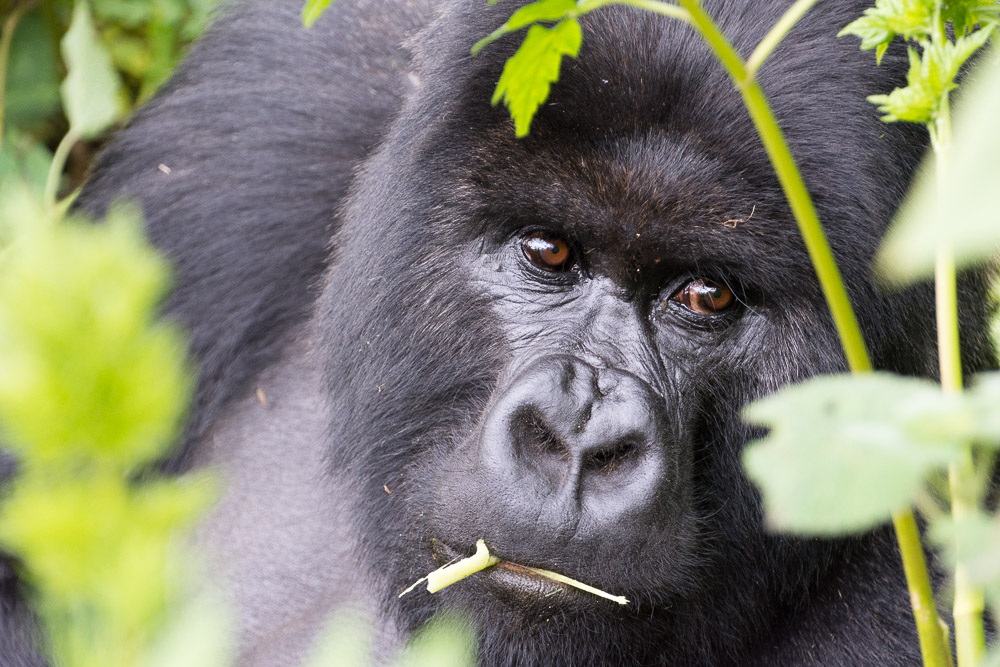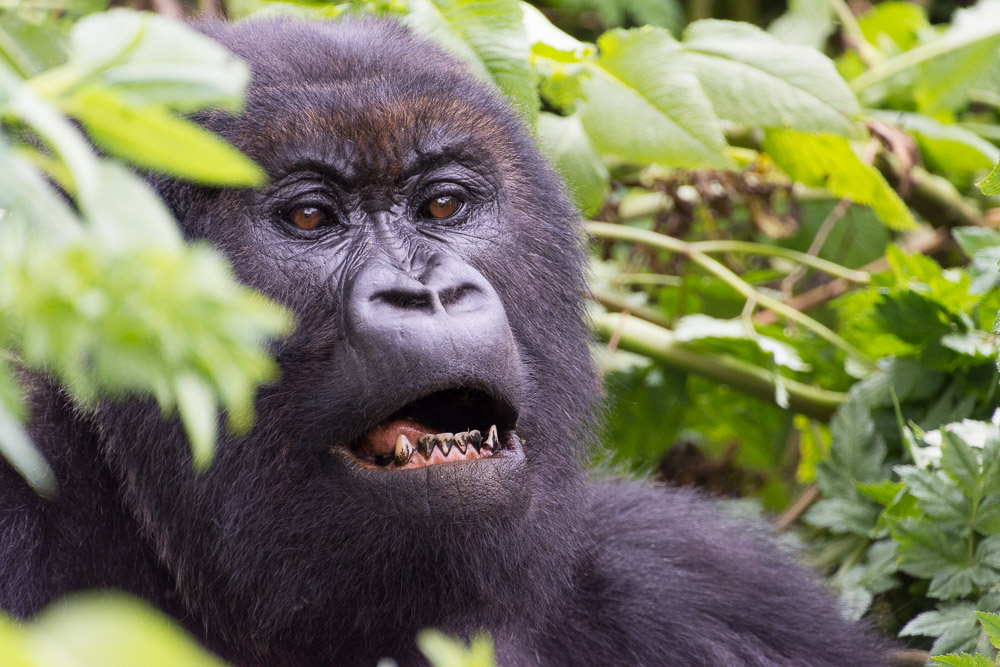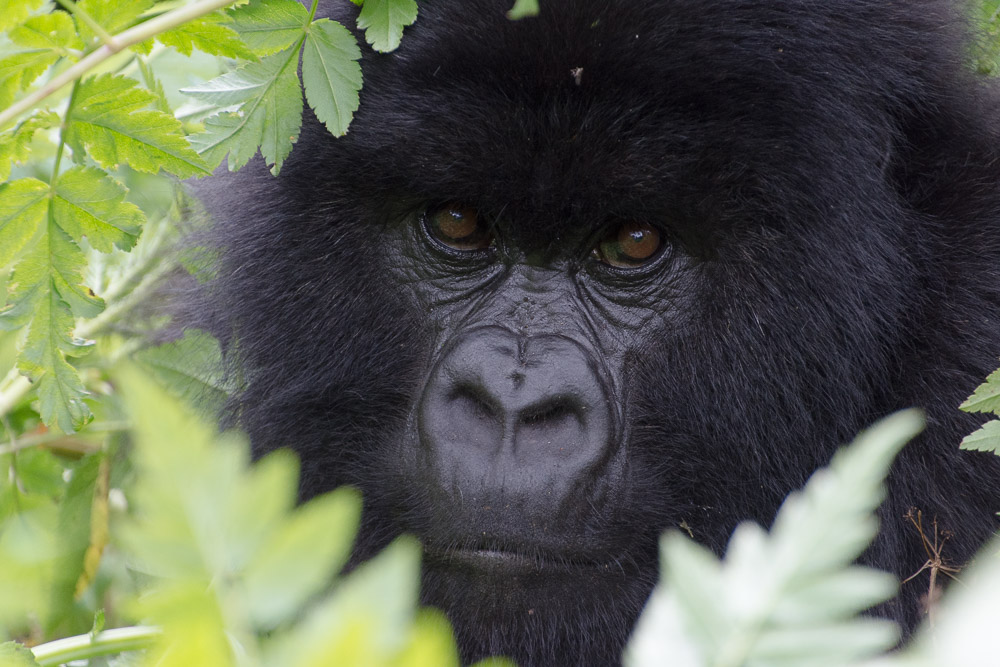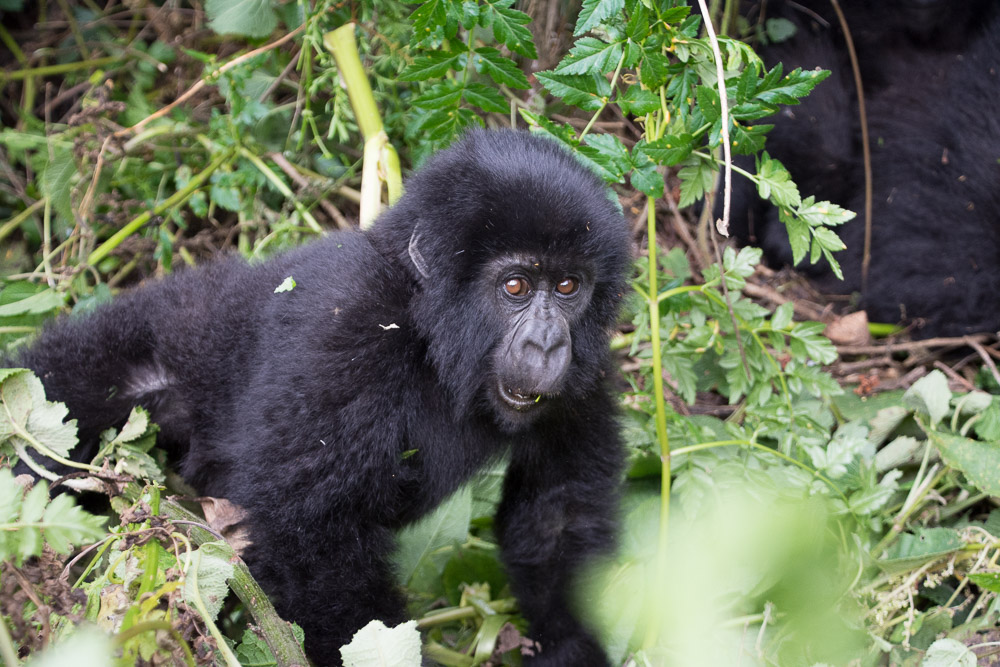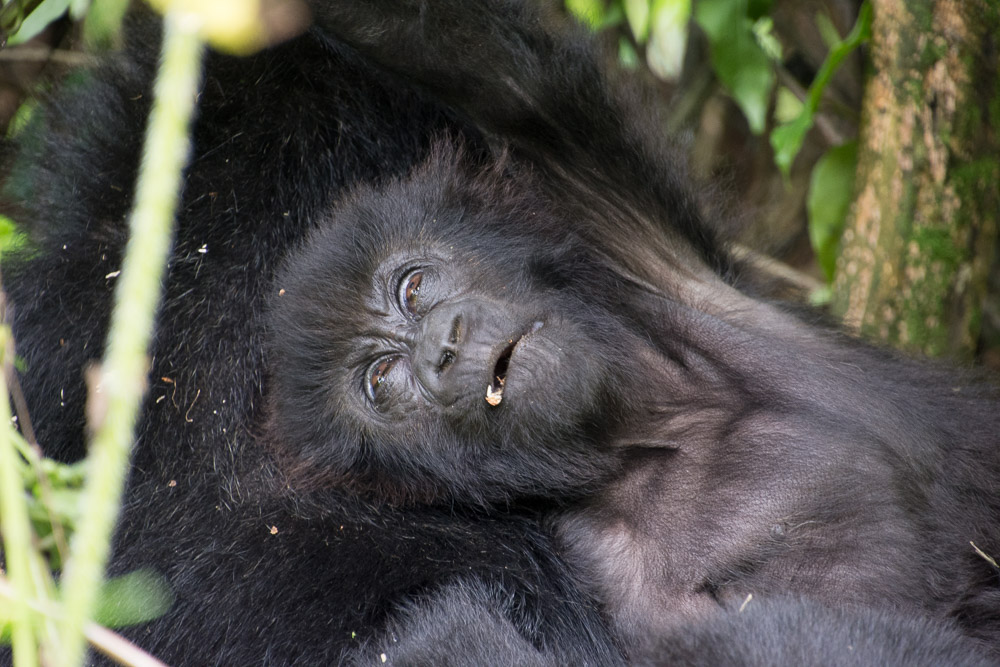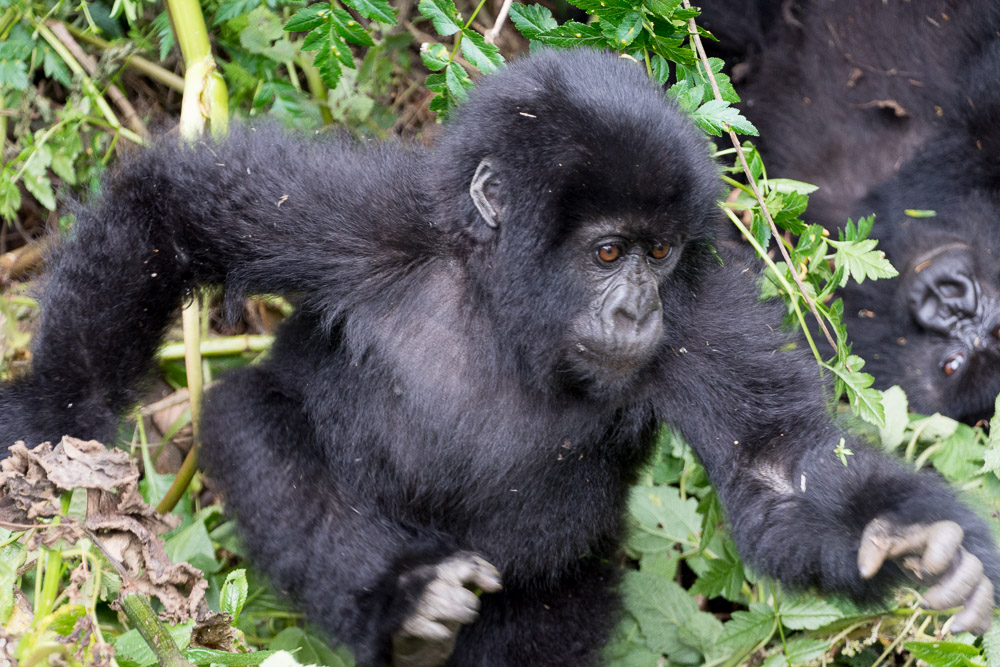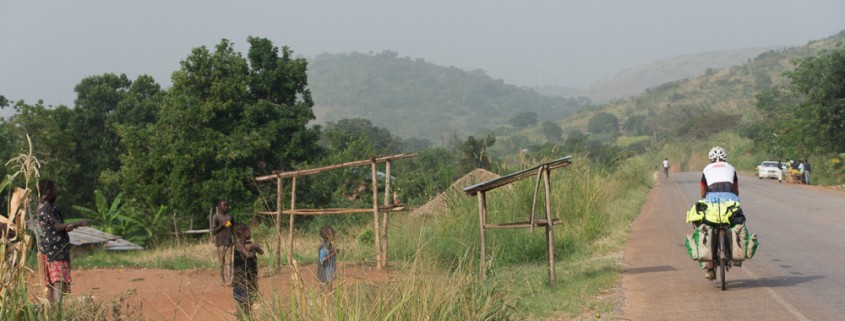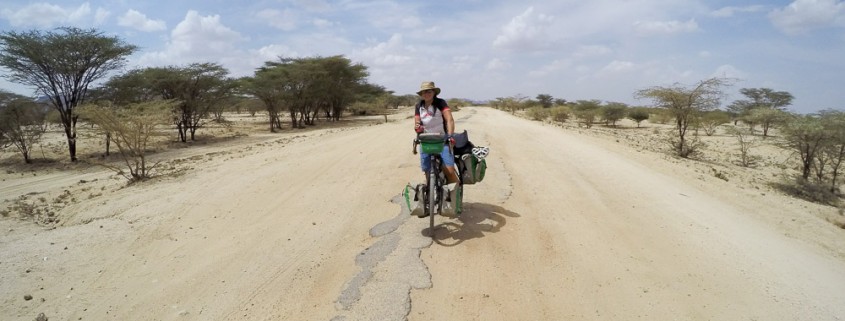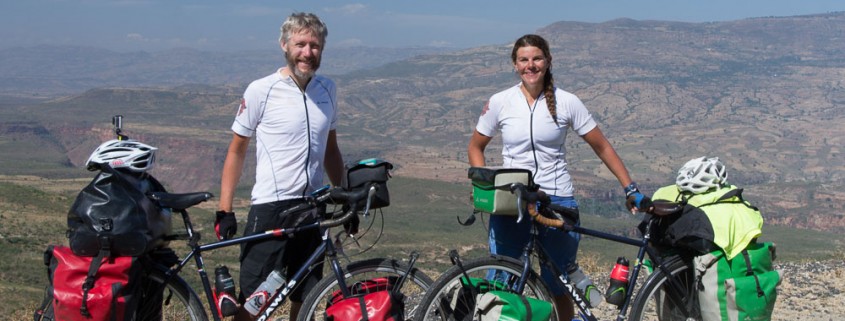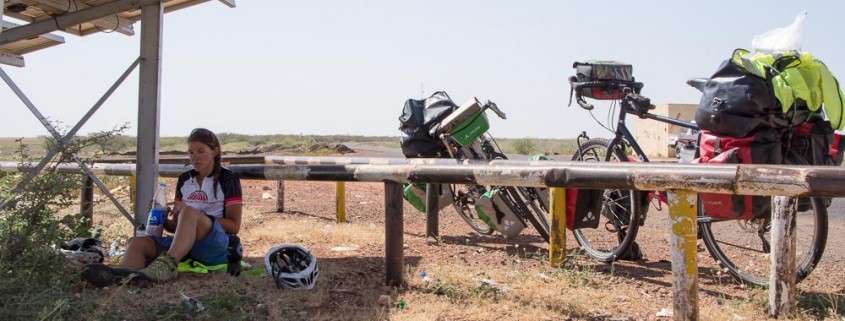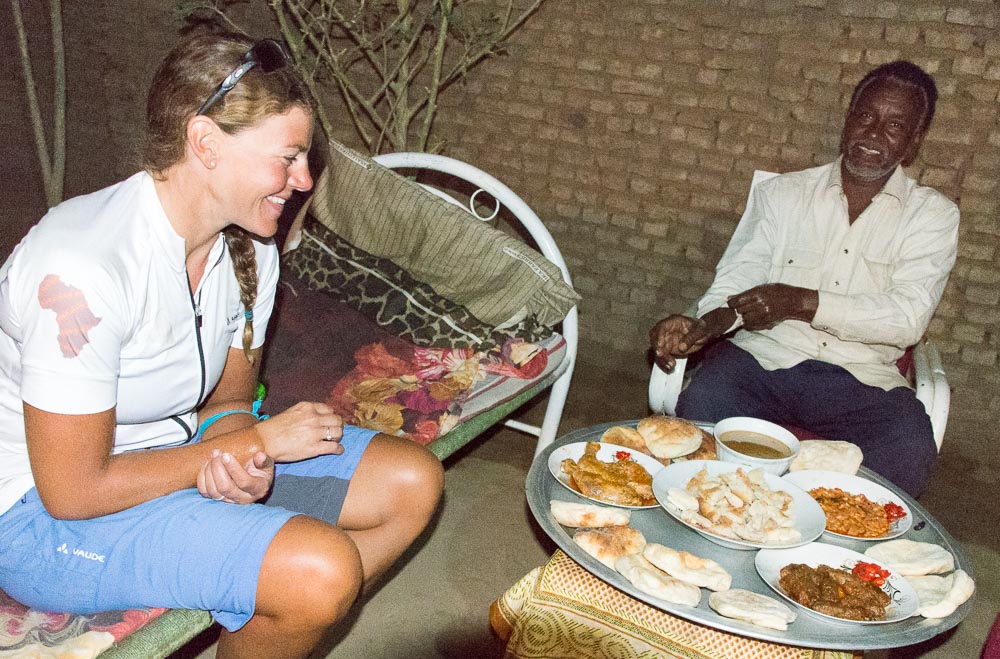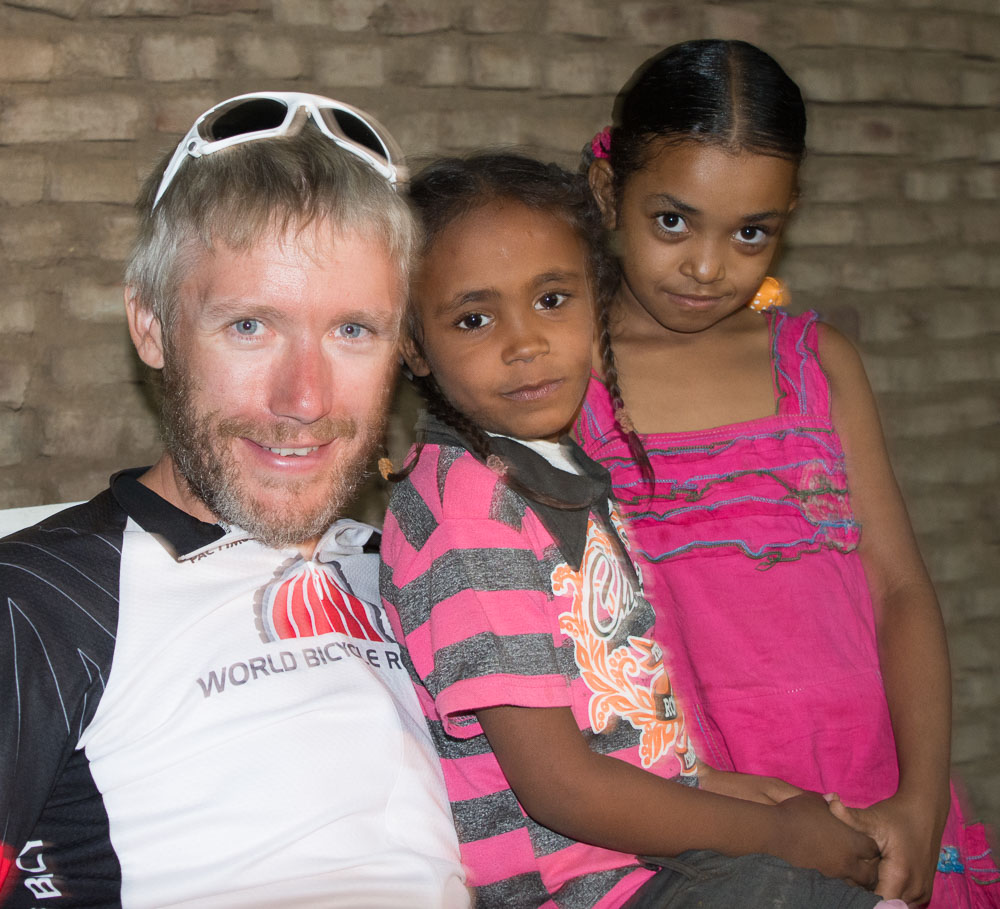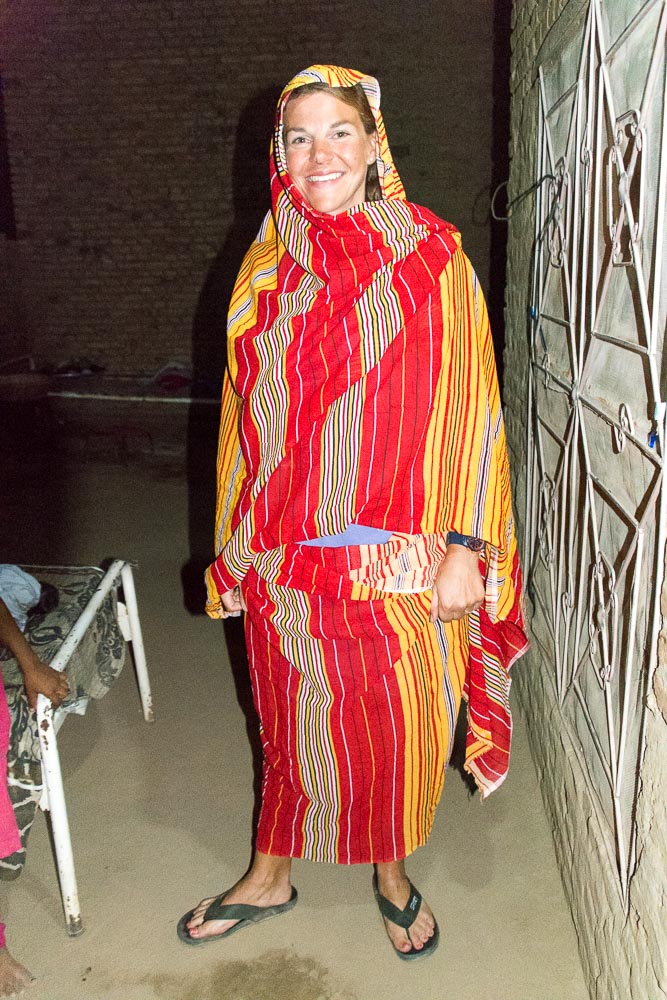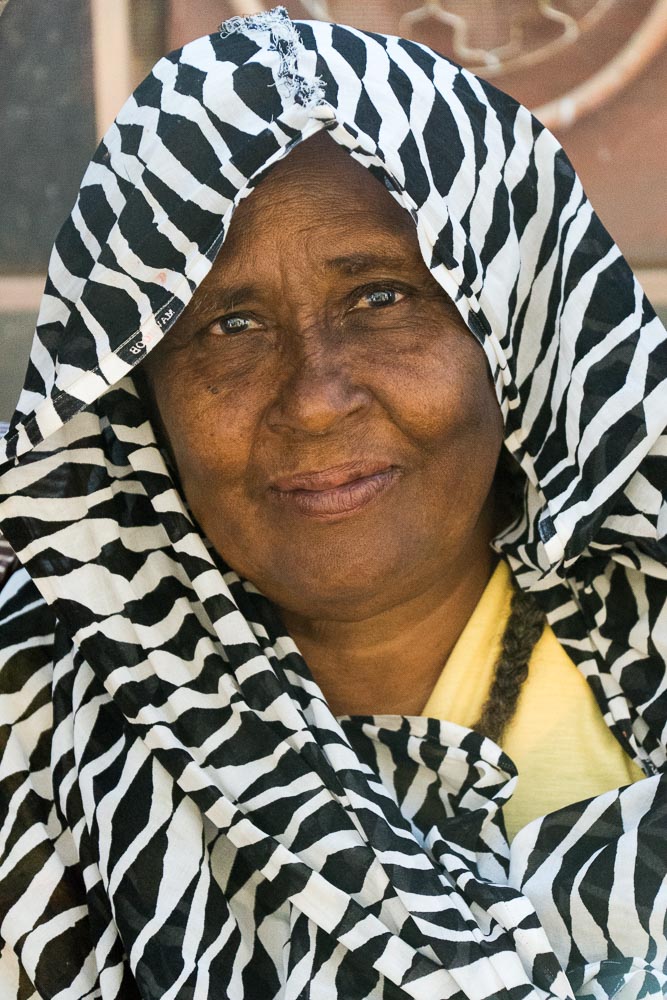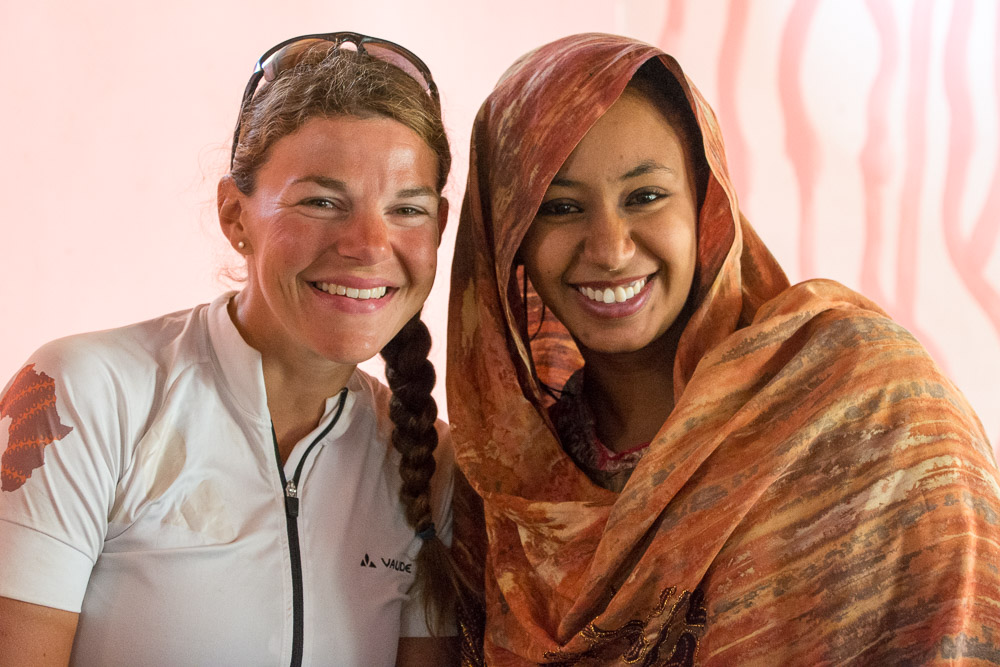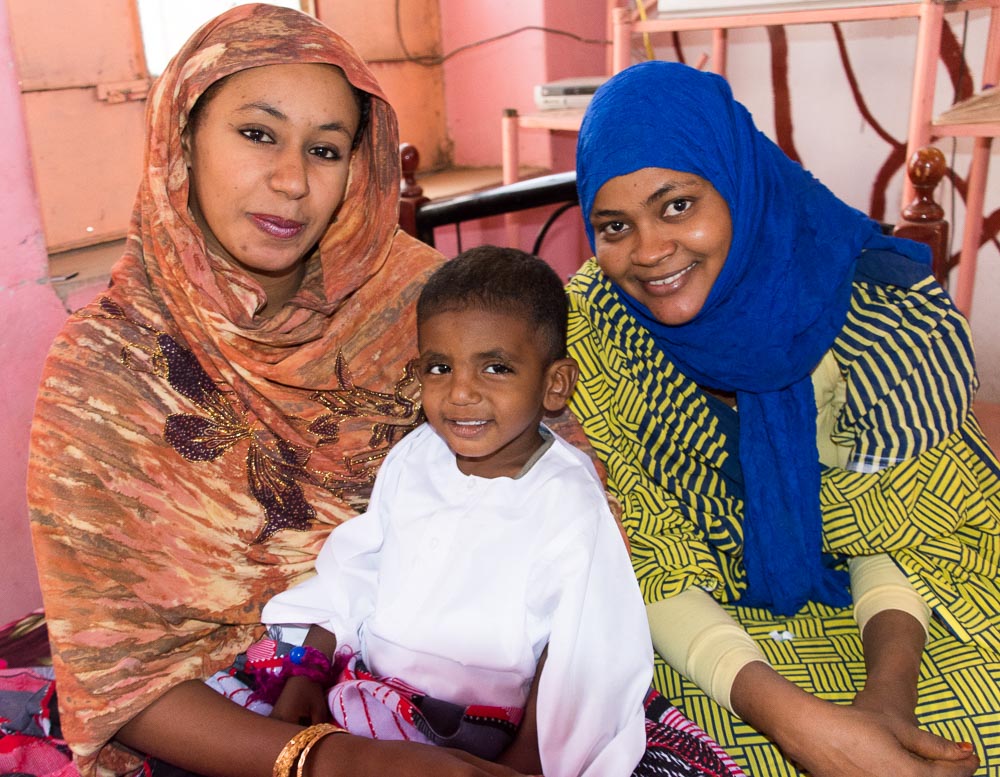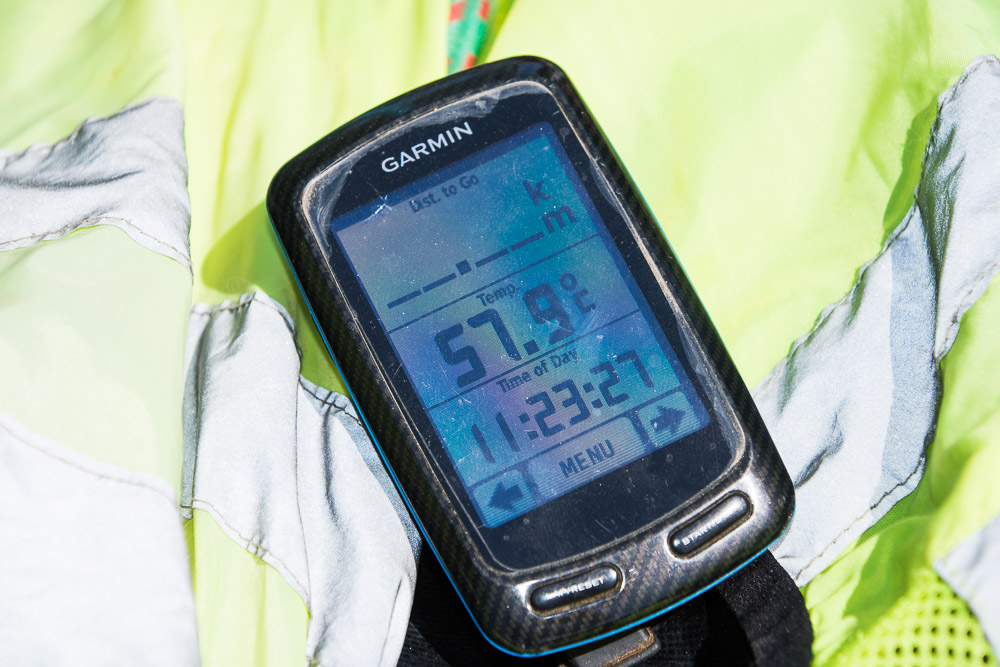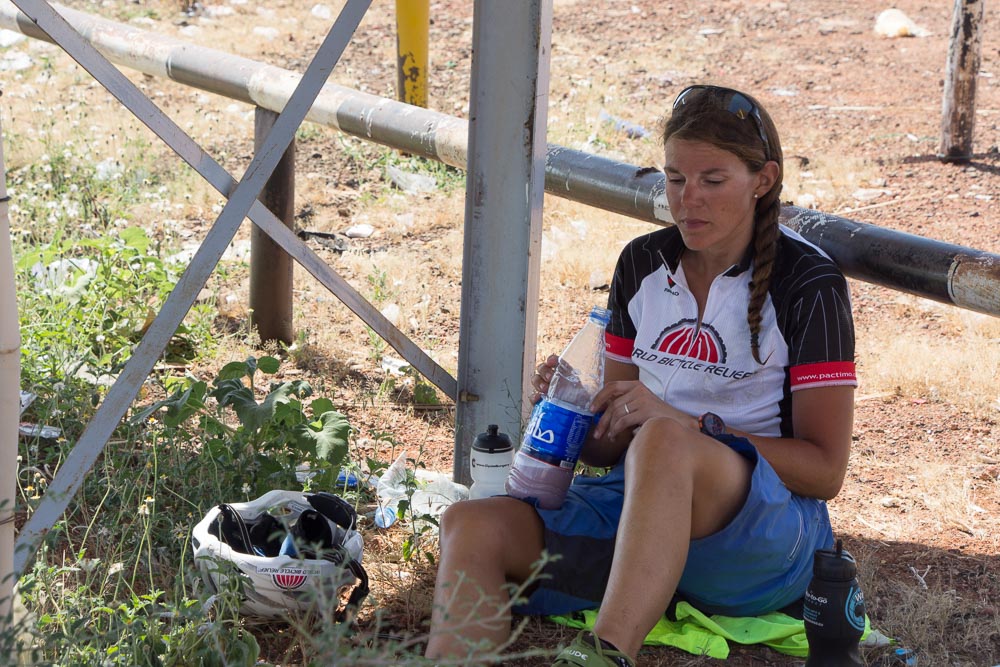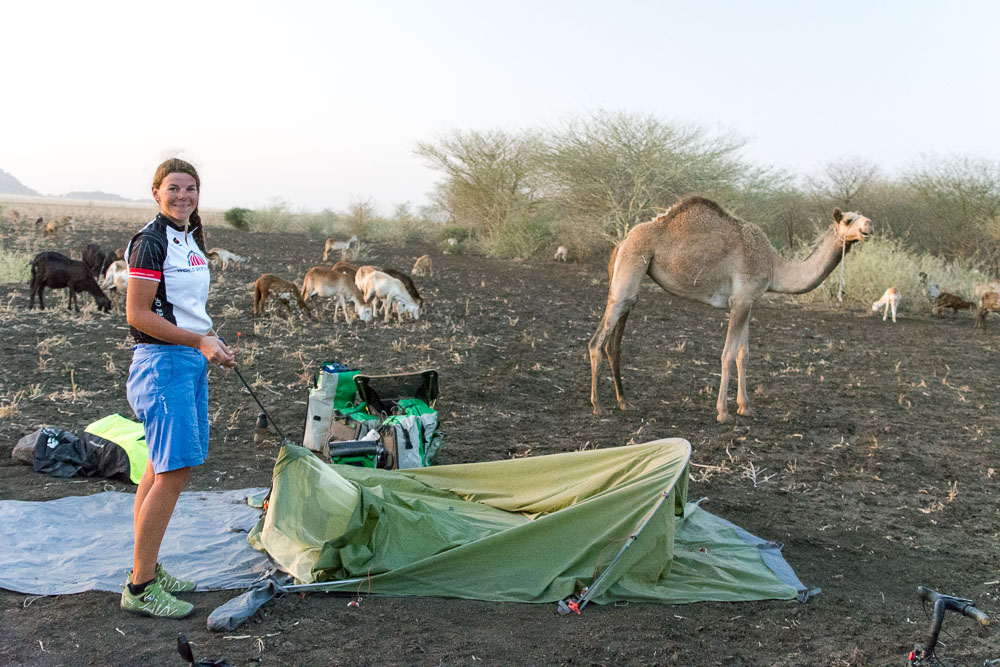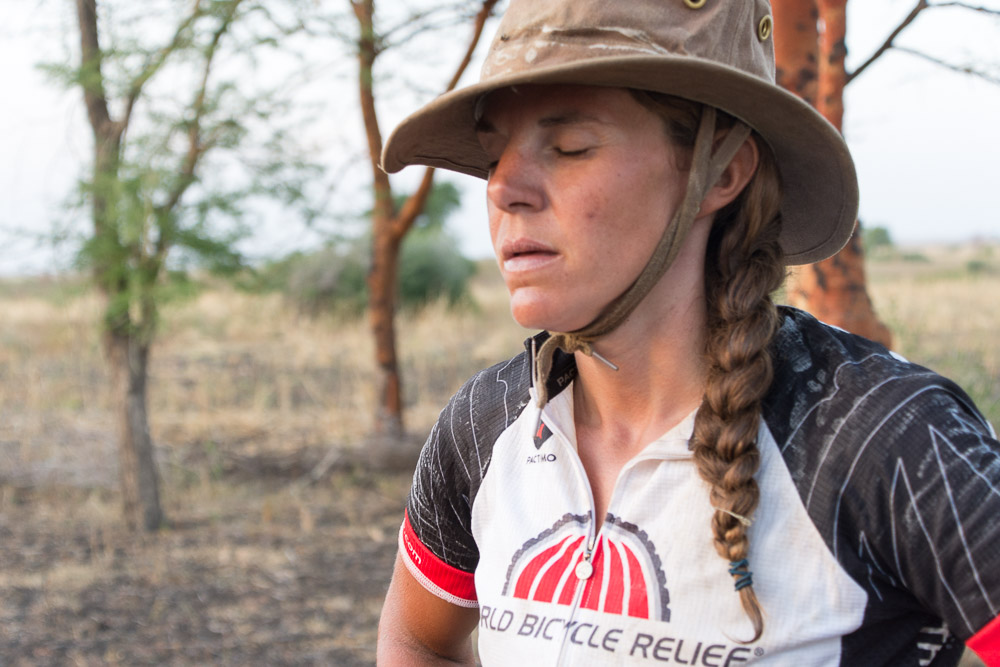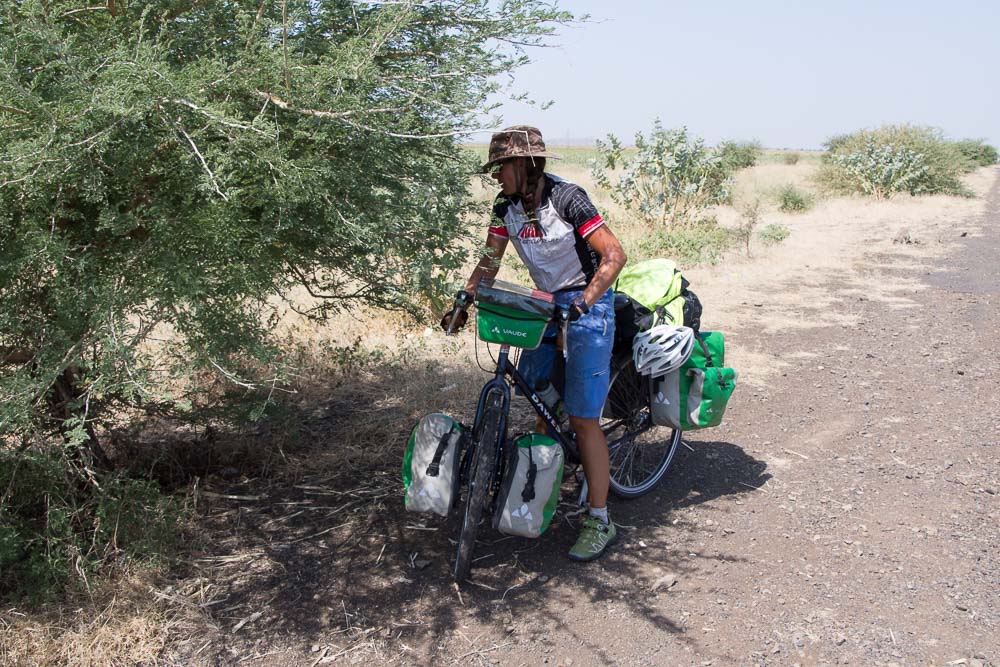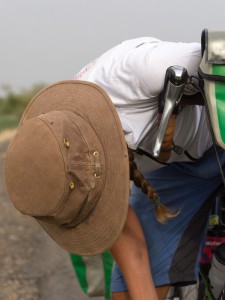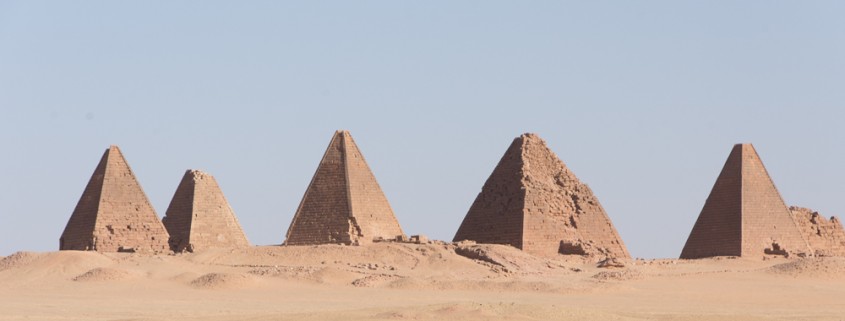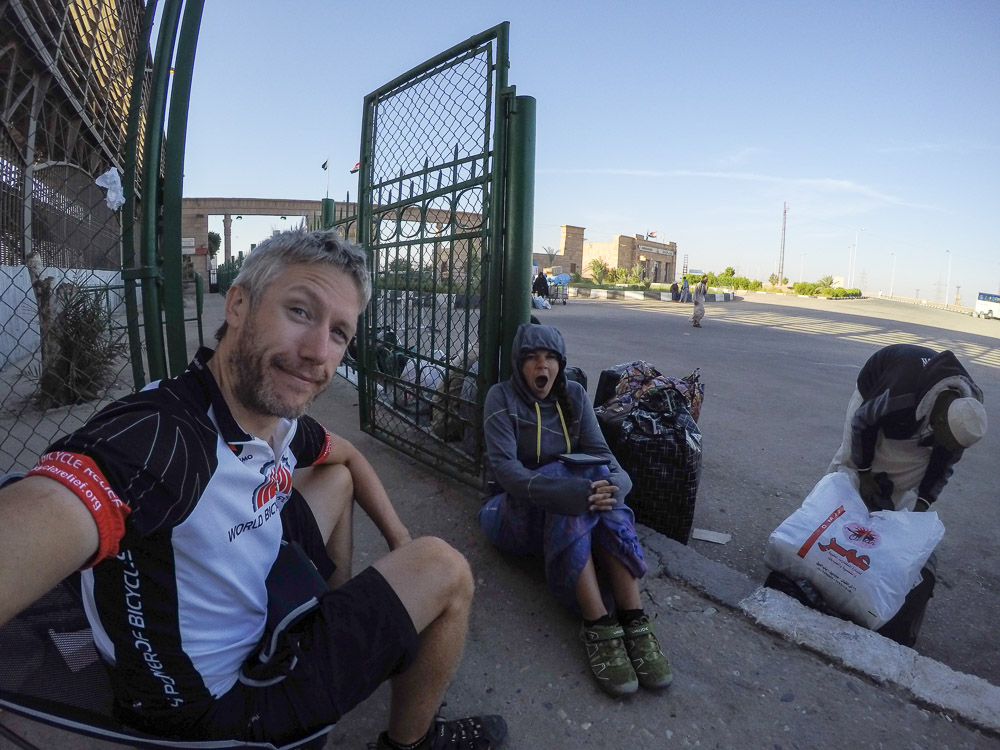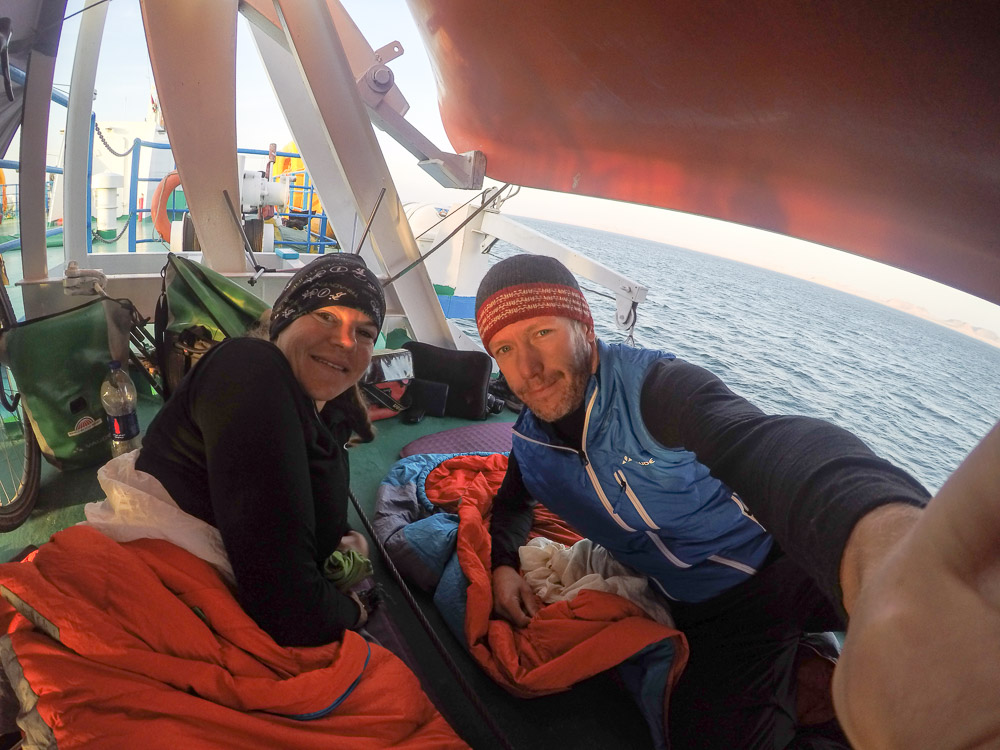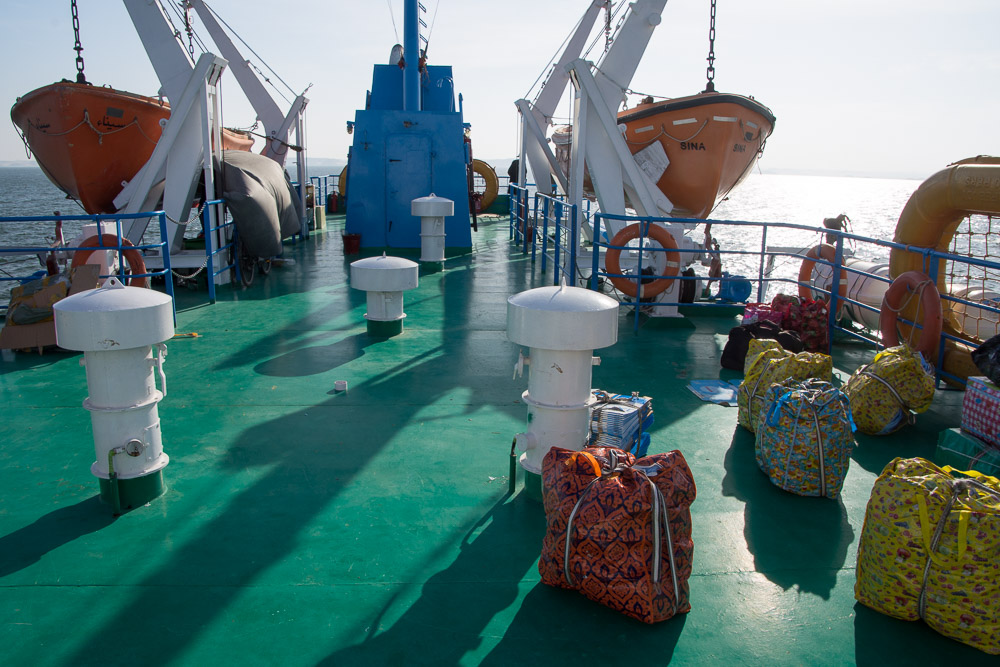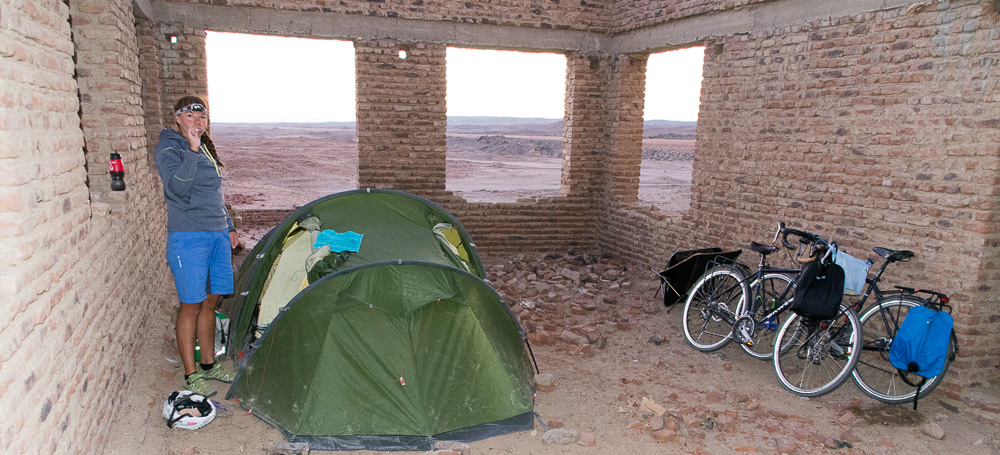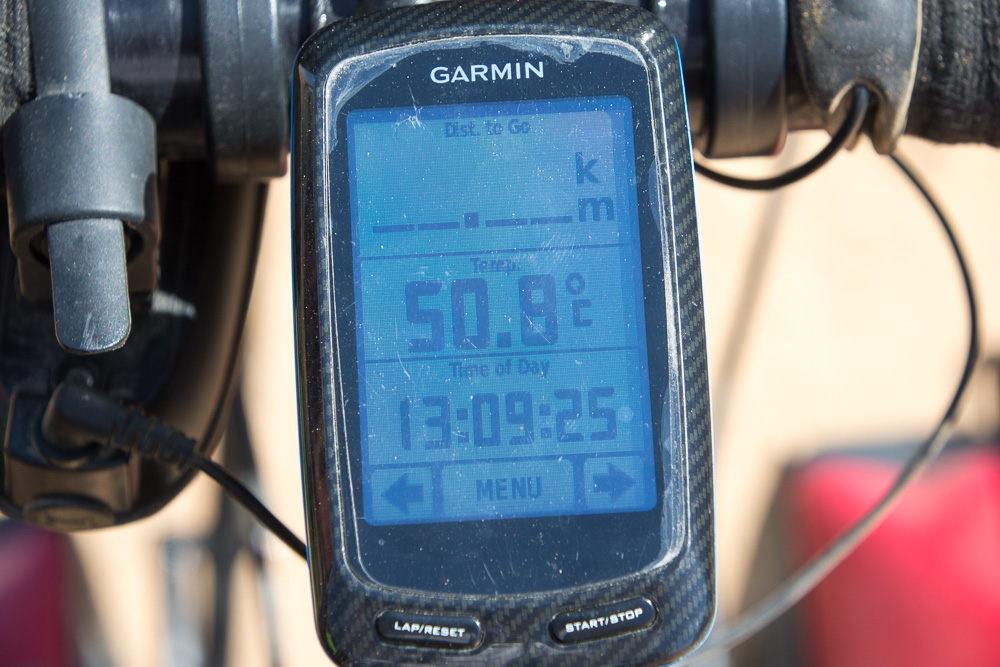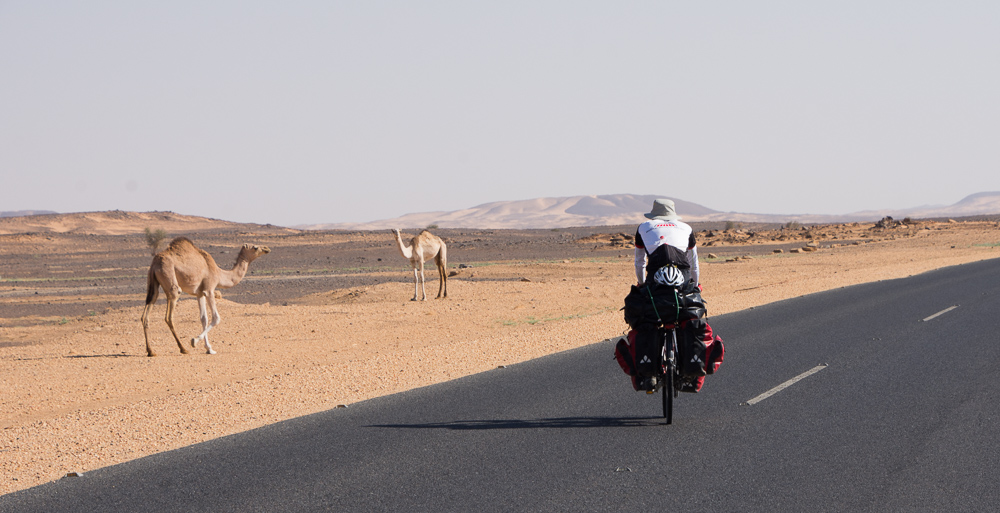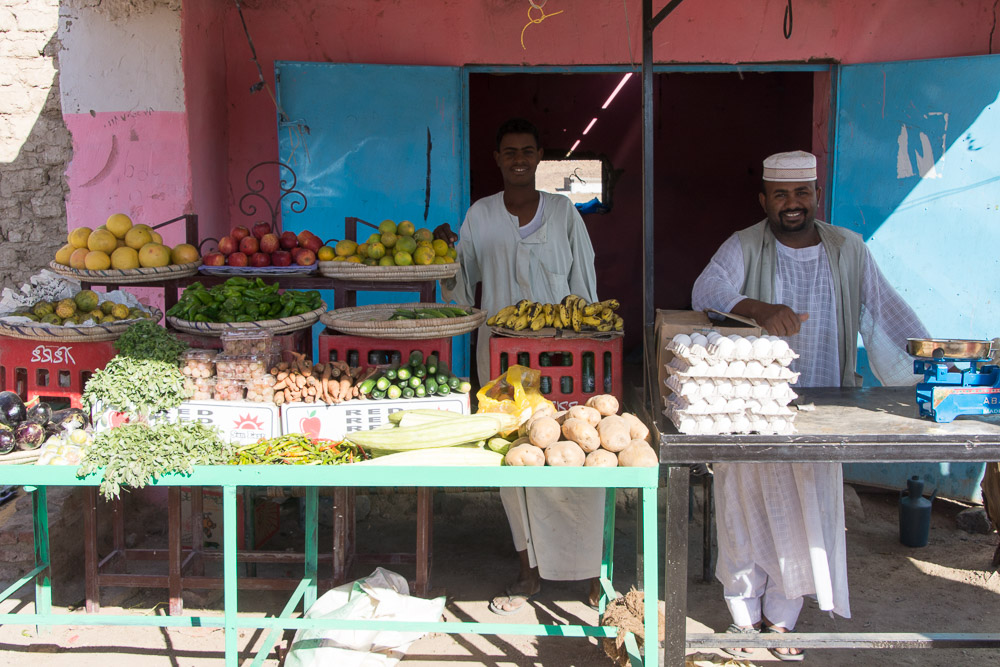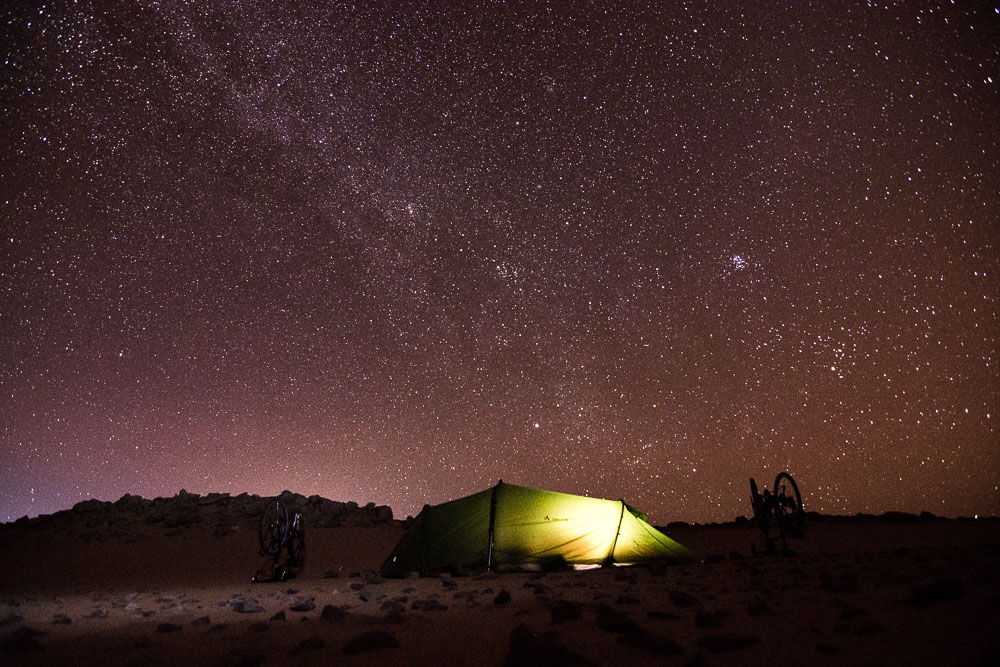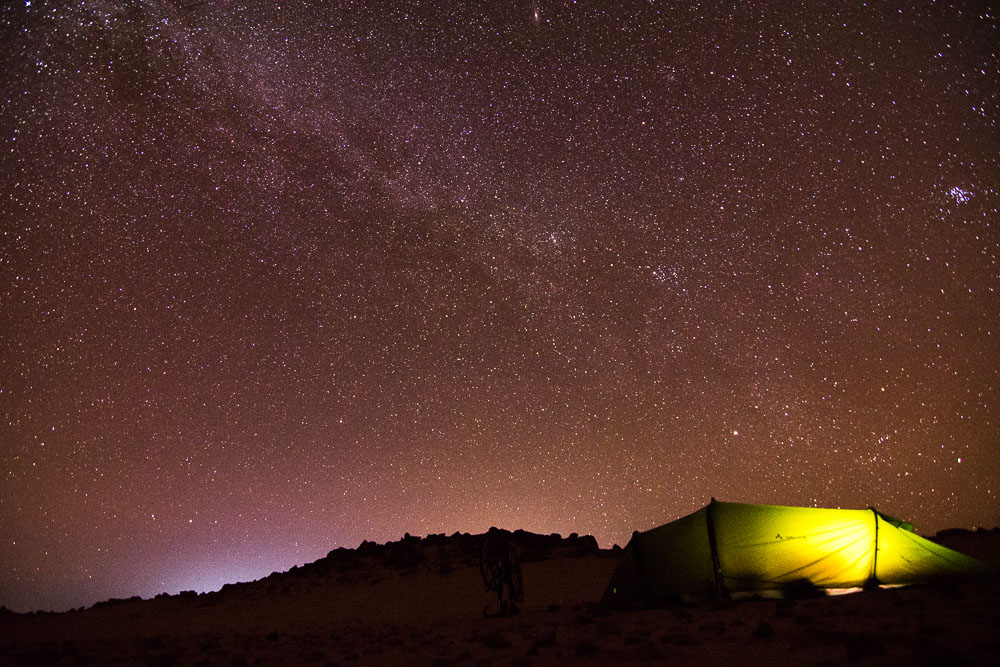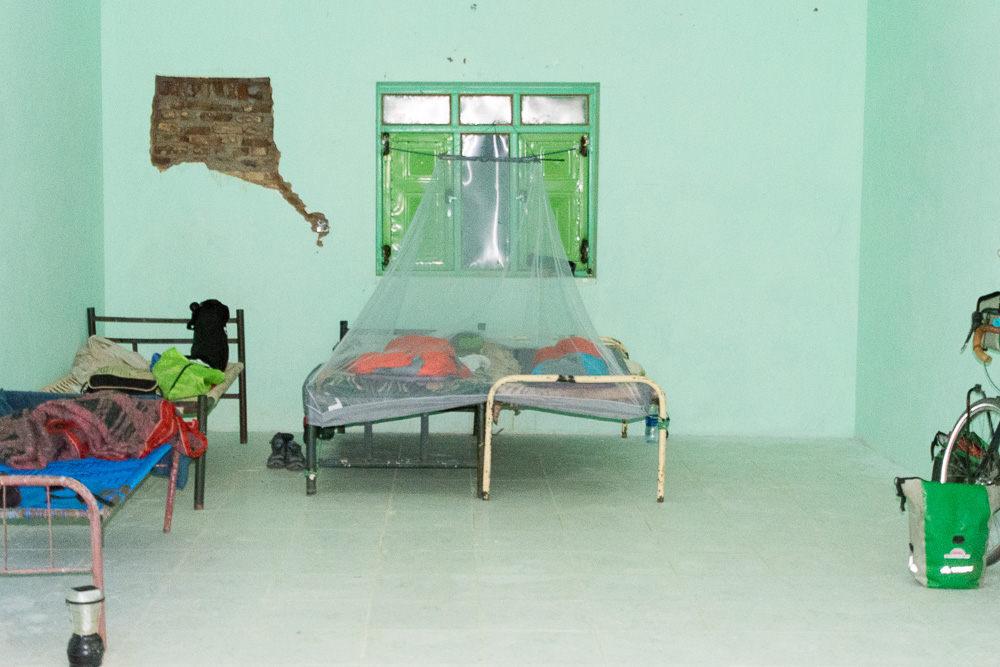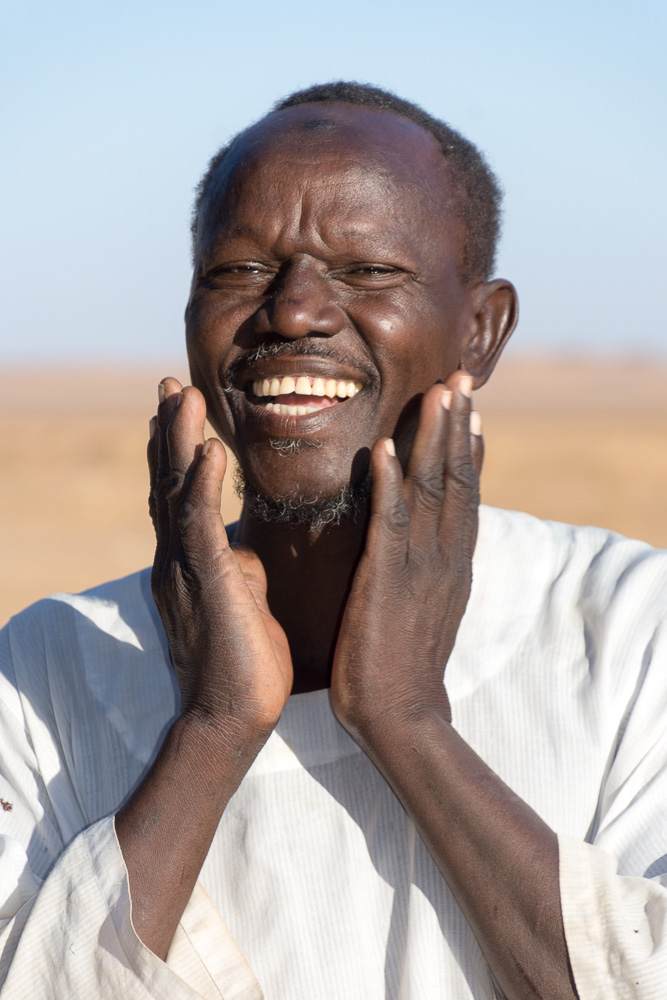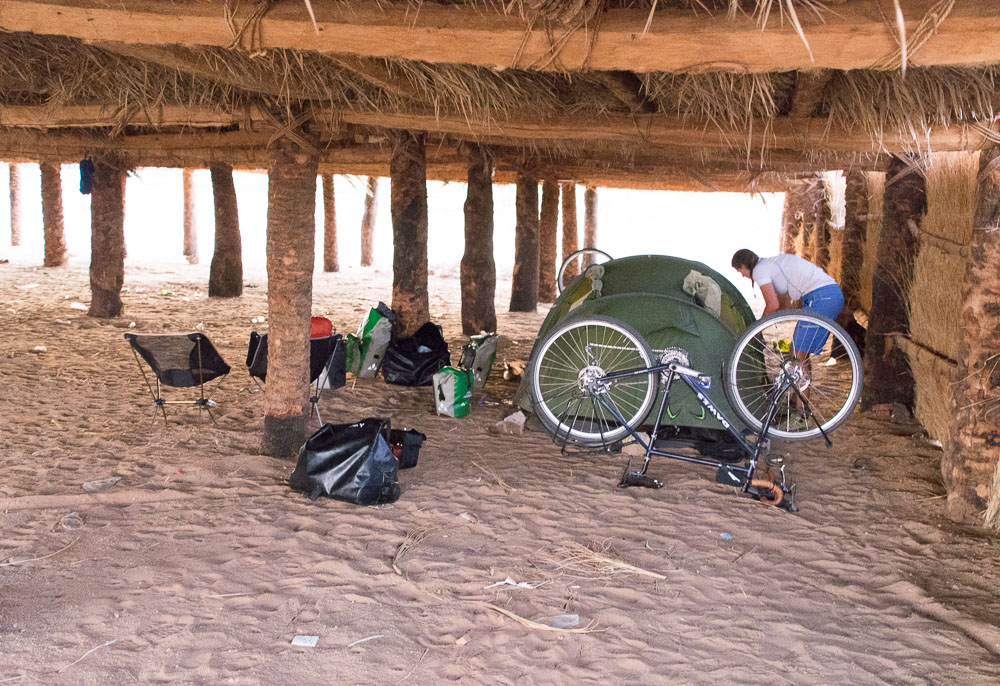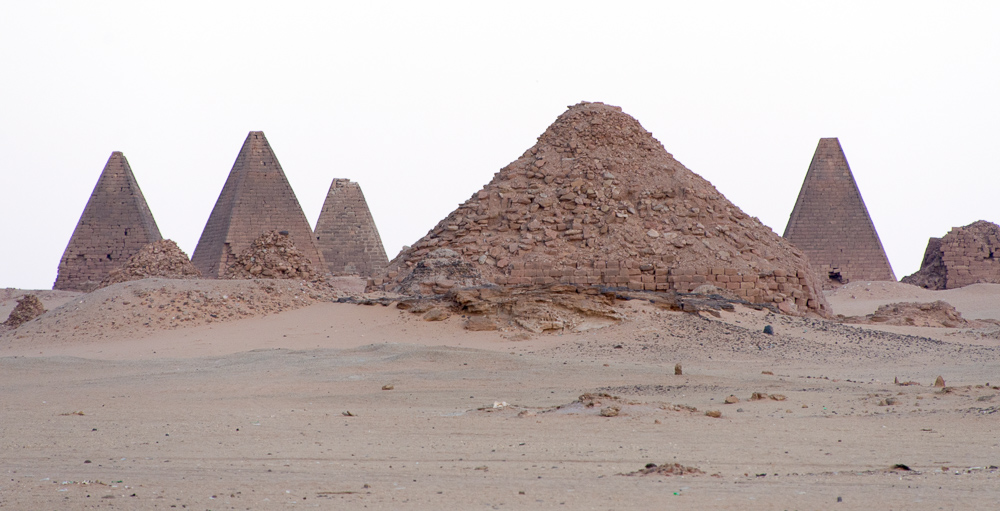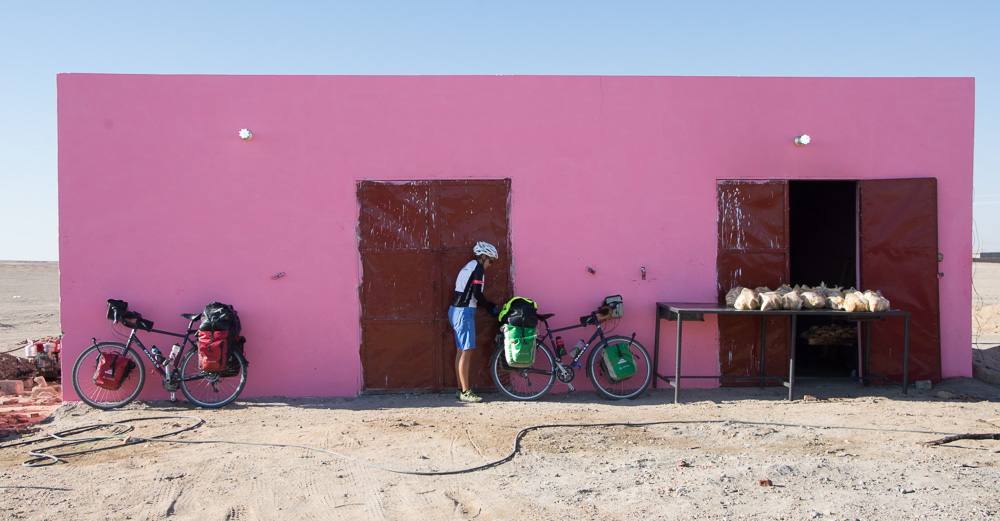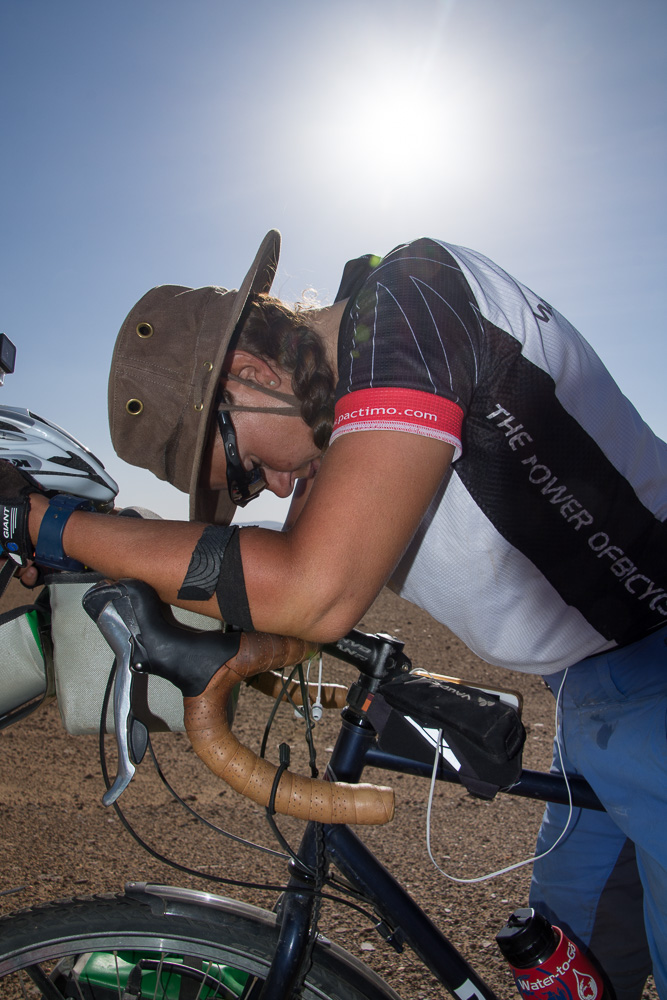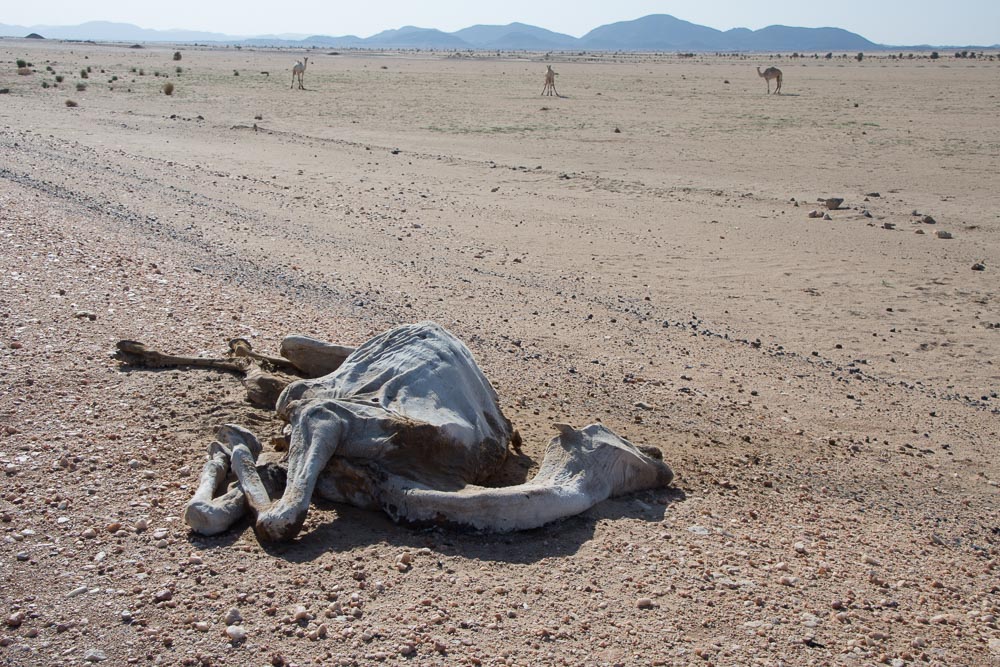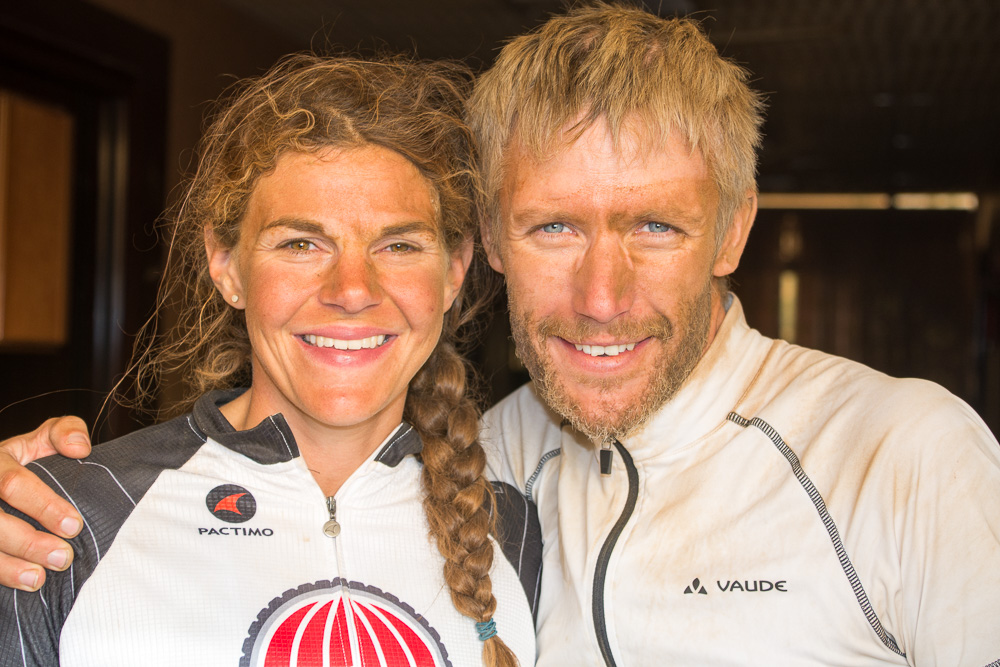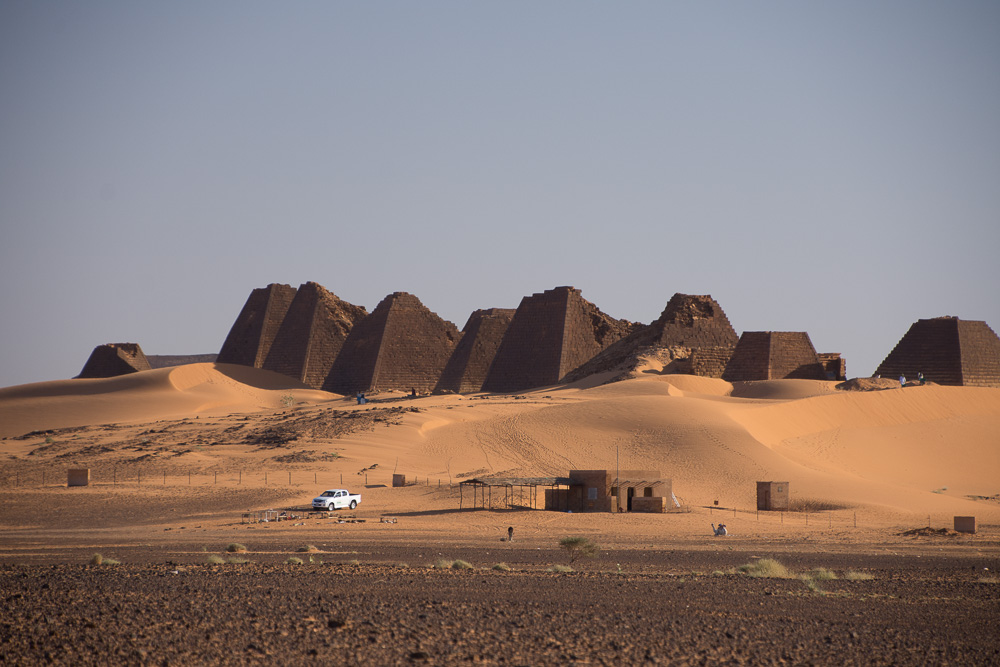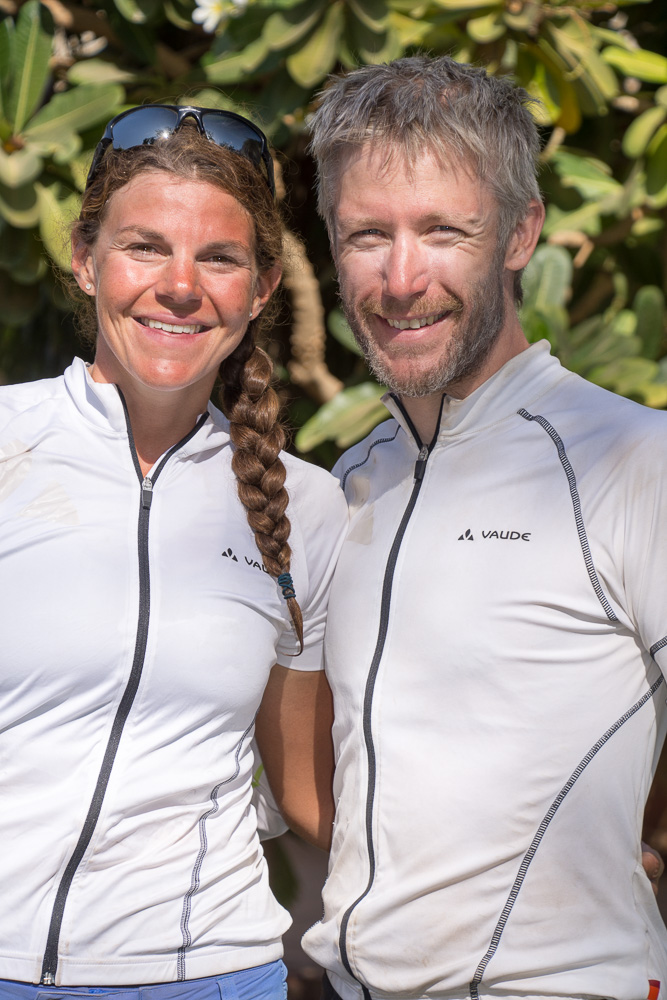Posts
London to Cape Town Cyclists arrive in Cape Town
/in Cairo to Cape Town, London to Cape Town /by James DavisCycling Namibian deserts and the last push to Cape Town
/in Cairo to Cape Town, London to Cape Town /by Emily Conrad-PicklesCycling back in time to Shiwa and Lwitikila, Zambia
/in Cairo to Cape Town, Kindness of strangers, London to Cape Town /by James DavisCycling a thousand hills from Uganda to Rwanda
/in Cairo to Cape Town, Kindness of strangers, London to Cape Town /by Emily Conrad-PicklesWe left Fort Portal on the promise that “It’s all downhill” to the Queen Elizabeth National Park. We’d looked at the map before we left and saw that the elevation did drop by around 1,000 metres, but in Uganda that means that you’ll have to climb over 1,000 metres as well because the roads are continually undulating. The mind is a funny thing though, because it was nothing that we were not usually used to and, secretly, we knew that there would still be some climbing, it seemed so much harder because all we could think about was that is was meant to be all downhill!!
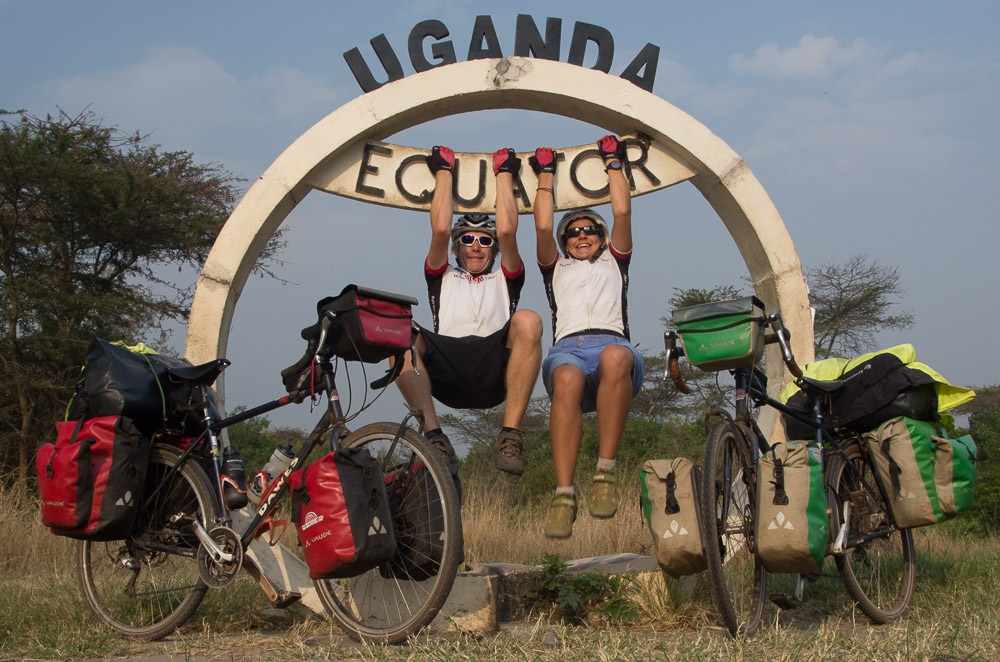
Momentous occasion as we pass from northern to Southern Hemisphere. Nearly 12,000km on the clock.
As we travelled, the landscape began to change from tropical lush green jungle to dry savannah as we approached the Queen Elizabeth National Park – famous for its tree-climbing lions. We spent the night at Simba Camp just outside the park gates, but sadly we did not have the time nor budget to stop and enjoy this park – we can’t do it all.
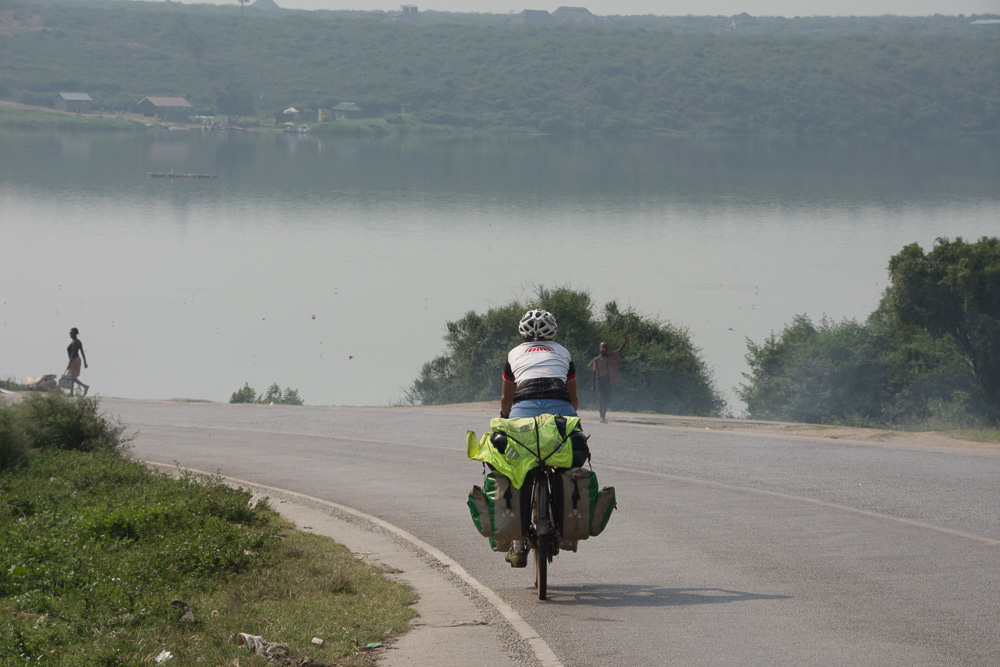
Descending into the National Park
The next morning, we cycled along the road that runs through the park hopeful that some of the elephants might have taken a wrong turn and decided to hang out near the road. [Would that make it a trunk road? – James]. The reality is that this road is the main trucking road to the DRC border and, although we did see some water buffalo and impala, it’s no surprise we didn’t see much else with the huge trucks carrying shipping containers blasting pass. We then endured a long winding climb out of the park. Actually, despite the road surface deteriorating into patchy tarmac, sand and gravel, the climb meant we were able to enjoy some stunning views over the savannah as we climbed back into the tropical zone and passed hundreds of small hold banana plantations. Our day ended at the Cielo Country Inn in Ishaka; a lovely little hotel where the manager Ben hosted us for the night – thank you!
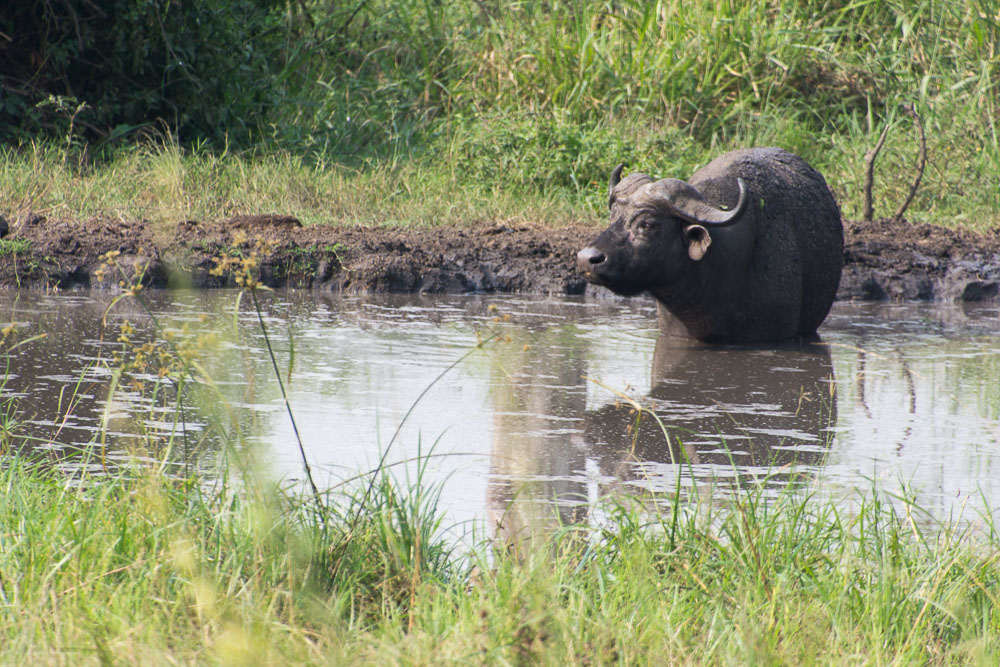
We saw plenty of wildlife on the road past Queen Elizabeth National Park, Uganda
From here we travelled through the hills for two days to Muko, a small village on the banks of Lake Bunyoni, the second deepest lake in Africa. The road to Muko was breathtaking as we passed through tea, banana, coffee and cotton plantations on a brand new tarmac road (thank you Ugandan Government!). Despite the terrain providing challenging cycling, the views more than made up for it and when we turned the final corner of the day we had arrived at the shores of the lake where we would camp for the night.
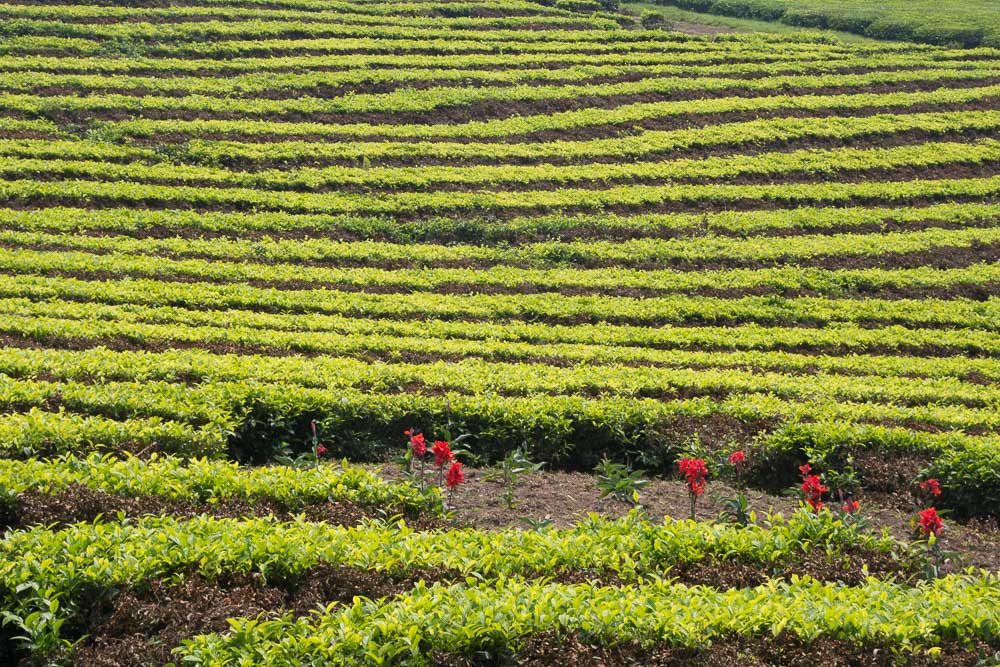
We cycled through stunning tea plantations in Western Uganda
We woke the next morning to stunning views of the mist rising off the lake; it seemed a great way to spend our final morning in Uganda, a country that we have so enjoyed cycling through. Everyone seems so cheerful, happy and helpful here and we had such a blast. It’s been great feeling fit again too – definitely helped by some great new roads, but I’d go as far as to say I’ve enjoyed almost all the cycling – no major heart palpitations and I even beat James cycling up a hill which has not happened since Bulgaria!
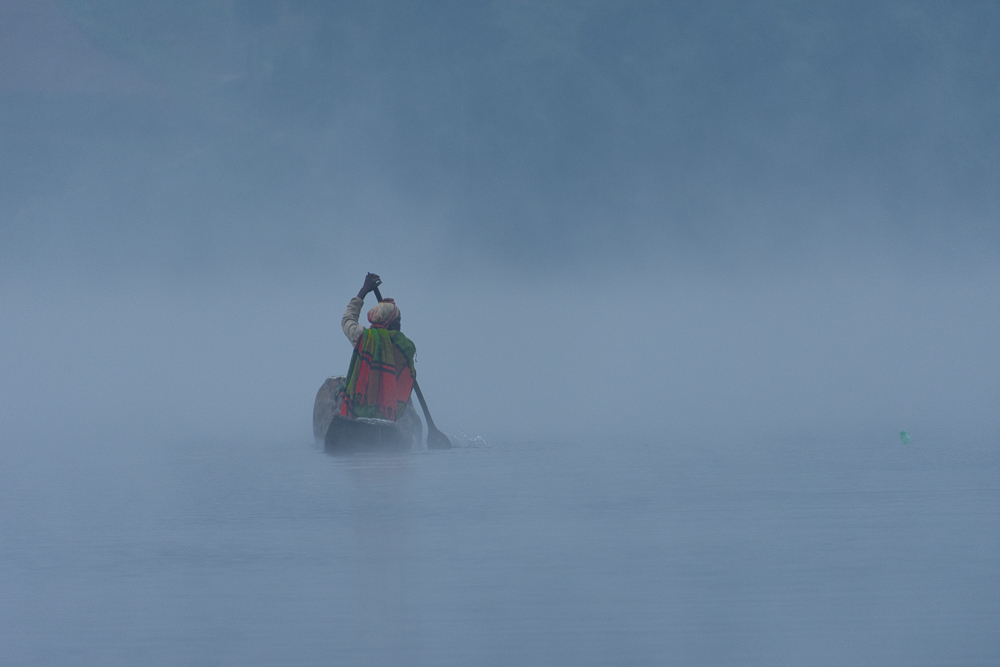
The stunning morning mist
After a seamless border crossing into Rwanda we had arrived in “The Land of a Thousand Hills” and our first stop was a much-anticipated stay with Team Rwanda, Rwanda’s cycling team, in Musanze (Ruhengeri).
We’d been invited to stay at the Africa Rising Training Centre where the team was in the middle of a tough training camp. Some of the team is in preparation for the African Continental Championships in 2 weeks’ time. As the team was in really focused training we did not spend much time with them other than at meals, respecting their privacy and the focus they required. We did, however, have a great time meeting Kimberly Coats, the team’s marketing director, finding out more about the team and its ambitions. Of particular excitement was meeting Team Rwanda’s first female rider, Jeanne D’Arc. Jeanne is working hard as we speak to qualify for the Olympics in Rio and a win at the Continental Champs, which she is expected to do, will guarantee her that place. She’s recently competed at the UCI TT championships where she was the only female rider from Africa in the field – this young lady has incredible promise and we cannot wait to follow her career with interest. As it stands, Team Rwanda will now have two cyclists attending the Olympics in Rio.
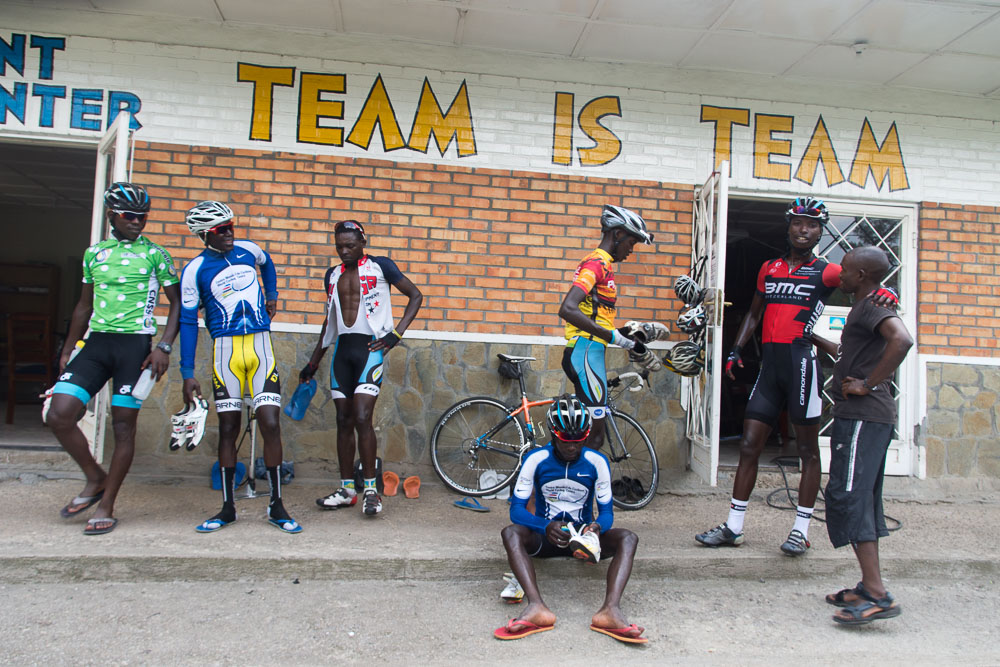
Team Rwanda return from a hard training ride
Team Rwanda shot to fame at the London 2012 Olympics as they fielded Rwanda’s first ever cyclist at the games, Adrien Niyonshuti who competed in the cross country mountain bike event. The team was established in 2007 by ex-pro cyclist Jock Boyer, the first American to compete in the Tour de France, and is going for strength to strength with Jock and his wife Kimberly at the helm. The centre now has a strong men’s team and their first female rider and hope to have three athletes competing in Rio this summer. The team is based at a complex called the Africa Rising Cycling Centre just outside the Volcanoes National Park in North West Rwanda where they run intensive training camps for Team Rwanda as well as camps for riders from other African countries. We could not help but be impressed with everything we saw there with a hugely dedicated team of cyclists who, through cycling, have united their country in pride and passion for cycling.
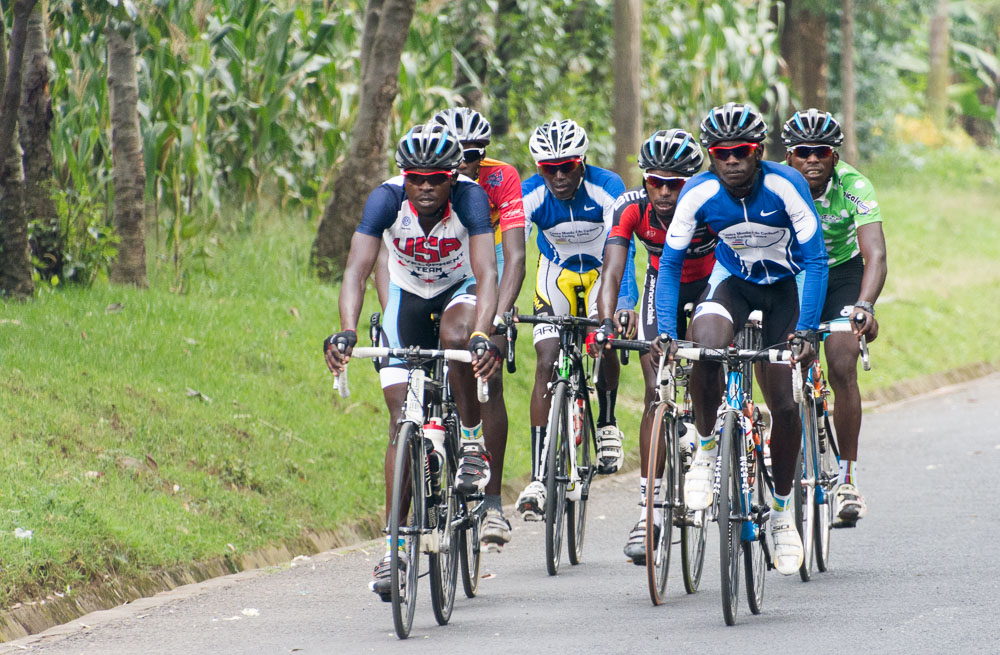
Team Rwanda
That does not mean, however, that it does not come without its problems and the team struggle daily with the pressure of professional cycling in a country like Rwanda. It is particularly hard for Jeanne D’Arc, the team’s first female cyclist. She’s the only girl on the team and would absolutely love to have some female compatriots but finding women who cycle in this country is tough. We learned that throughout East Africa that many girls are made to stop cycling when they reach puberty, because it is commonly believed that riding a bike would lead to a young girl loosing their virginity. It’s such a sad belief and we can only hope that as education levels rise, this will one day become a legend and we hope successful young women like Jeanne will be able to become confident female role models in Rwanda.
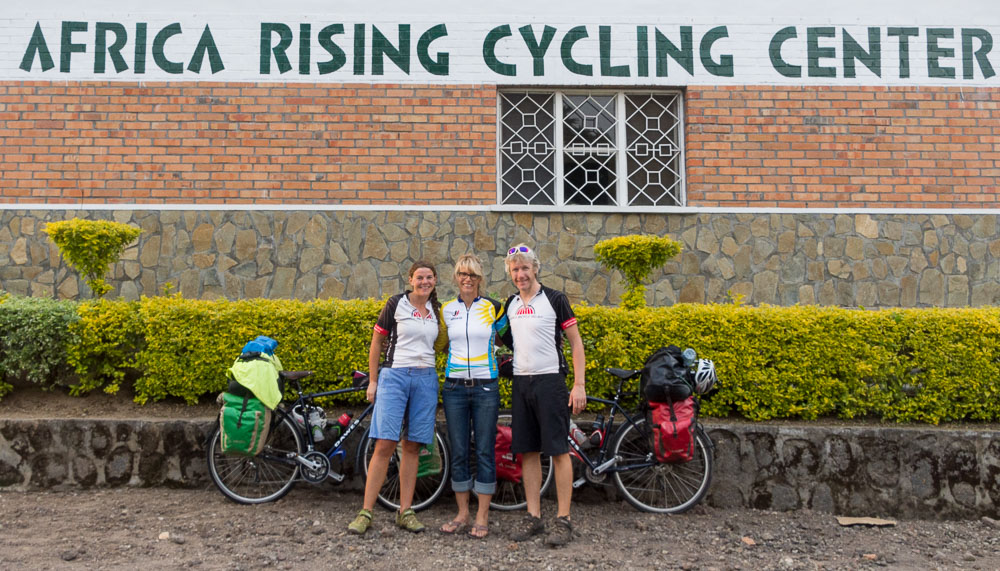
Meeting Kimberly Coates at the Africa Rising Cycling Center, Musanze.
The UK arm of World Bicycle Relief, who we are raising money for, provide their Buffalo bikes mainly to young girls to help them get to school and remain in school longer will help to improve education levels in rural communities where it is most needed – never have I felt so passionate about helping girls get an education.
From Team Rwanda we spent a truly magical day trekking to see the mountain gorillas; a day we will never forget. Before we left home we outlined a few things that we really wanted to do, regardless of cost on this trip and although this was by no means a cheap day, it was incredible to have the opportunity to spend some time with these unbelievable creatures. Sharing 97.2% of our DNA, they really are just like big hairy versions of us. The day involved a 14km trek through the bamboo forests and into the jungle where we hacked our way through dense jungle to find the Susa family of gorillas.
Gorilla Trekking Slide Show
What made it better was that we had such a great group of people with us – Matt, a Canadian living in Kigali with his young family and his parents and uncle and aunt who were over visiting from Canada. An highly successful and lovely group of people. It really is a small world as we discovered that Matt actually met his wife whilst cycling across Canada and they spent their honeymoon cycling from North to South America! We are now spending a couple of days with Matt and his wife Jenna in Kigali before we make our move to Tanzania.
We decided to split the journey to Kigali because, although it was only 100km, there is a lot of climbing and we wanted to go to the Genocide Memorial Museum on our way into town so needed enough time to do this. Our ride out of Musanze (Ruhengeri) was awesome as we passed Team Rwanda on their way home from a training ride – a great way to say wave them all goodbye!
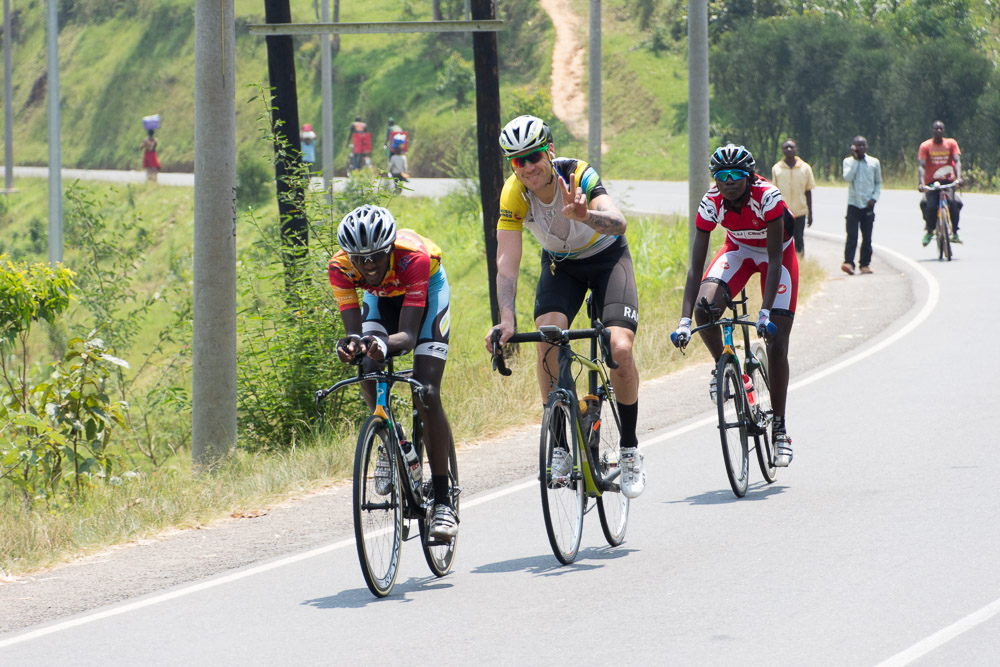
Coach Sterling Magnell in the middle, with Jeanne D’arc Girubuntu following closely
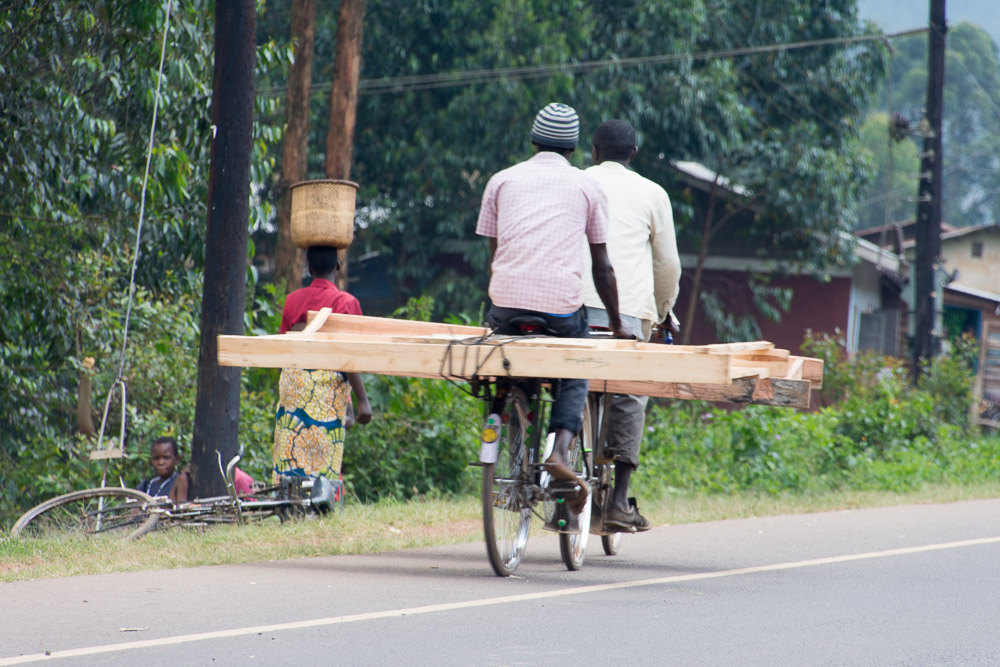
Bikes are used to carry everything here!
After a 7km climb we passed a small guest house around 50km from Kigali and decided, as we did not think we would pass anything else on the way, we’d take a look to see if we could stay the night there and have some time to do some much needed admin before arriving in Kigali. All was looking good – they had a simple room for $5 and a quiet beer garden where we could set up camp and get our work done – we just needed to pick up some food to cook as they didn’t have a functioning restaurant.
Once we’d settled in, the manager arrived and decided that, as we were Muzungus, we should pay extra for the room, no room for negotiation. Now don’t get me wrong, it was not much money more but the room was pretty gross and we were not going to pay more just because we had white skin so we decided to leave, thinking that they would change their minds. They didn’t. We took back the money we’d paid and set off.
One small problem, however, James’s helmet seemed to have disappeared…it was definitely there when we arrived but, having searched everywhere, we whizzed back to the nearest town to see if we had left it there instead but no joy. It was only when we cycled back past the guest house we saw that it had miraculously turned up – and, funnily enough, they were happy to give us the room at the old price. Too late. We decided to wild camp instead so cycled along for a few more kilometres until we found a (very rare) patch of flat land with no houses or crops on it – just outside a church. We found some water from a spring and set about pitching our tent. Rwanda is incredibly populated so it was no surprise that within minutes we had an audience of around 100 people watching us! Even when I popped into the tent to put some trousers on I noticed the local women trying to peer into the tent to watch me. They stayed with us until sunset when we met the local pastor who kindly asked them all to leave us in peace! It was the same the next morning and when I emerged from the tent at sunrise, there was a new audience ready and waiting for us! We didn’t mind too much though, they quietly watched us, clearly fascinated by what on earth we were doing – it just made the morning loo visit a little awkward…!
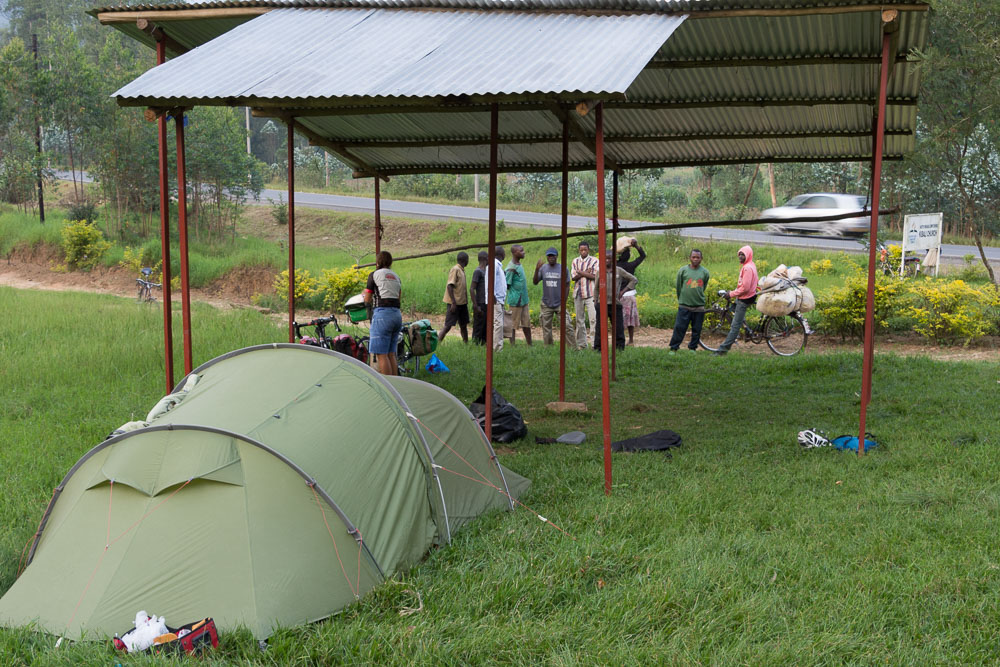
Within moments of arriving, our presence drew a crowd of people which grew to be as large as 100 by sunset time!
Although brief, it is great to be in Rwanda, the second time for me. Aptly named the Land of a Thousand Hills, it is incredibly hilly on bikes but incredibly beautiful. In a country with such a dark recent history, it is humbling to meet so many optimistic, friendly people who all take the time to tell us that we are welcome in their country. Their recent past will never be forgotten, it’s hard to when so many people were affected by the genocide here is 1994 however the country is moving forward in the right direction.
For us, we have a few more days here before we hit remote Western Tanzania where we hope it will stop raining soon so that the clay road we intend to take remains a viable route for us!
If you’ve enjoyed reading this blog post, please donate to World Bicycle Relief. Every penny goes to the great work the charity does in Africa – not to fund our expedition in any way.
Cycling Uganda
/in Cairo to Cape Town, London to Cape Town /by James DavisEmily was terrified. She’d been saying to me for weeks that she didn’t want to do it. And now, as we teetered at the top of a 10-foot drop, she was regretting that she’d ever followed my lead by agreeing to go white water rafting.
We were facing upstream but were stuck on rocks at the top of one of the most notorious grade 5 rapids on the White Nile near Jinja, Uganda. Behind and immediately below us, the water tumbled down as a ferocious force of froth and foam.
Further below, those in the other raft in our party looked up at us. For the group that had, up until now, been the boisterous banter boat, they were eerily quiet. Nervously watching us as we awaited our fate.
The guide had his leg out of the craft and eventually pushed us free from the rocks. The current caught us and we tumbled backwards down the rapid. A wall of water hit us full in our faces. Crouched low into the raft I clung on for dear life.
When the rush of water subsided I opened my eyes. Emily had vanished.
I looked across and I could see her head bobbing as she was swept along in the turmoil of the white water. Her eyes wide as she saw the rocks that were ahead. Emily was now being tossed about in what was known as “the washing machine”.
We all shouted for her to swim to the raft. As if a switch was flicked, she appeared to snap our of her panic and swim towards us. With a few powerful strokes, she was back at the boat and we hauled her into the raft.
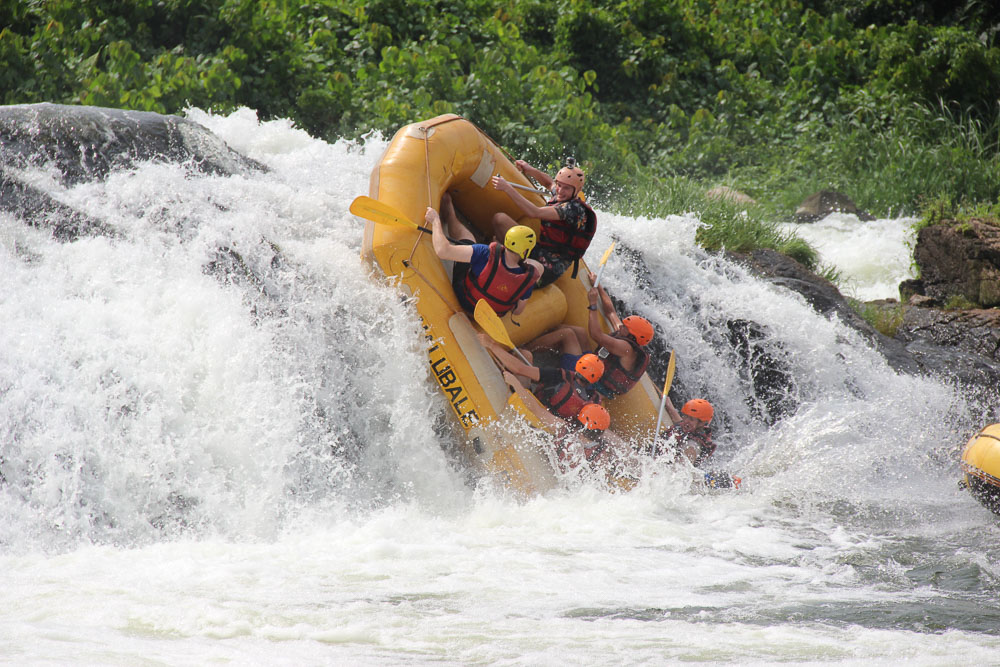
After an age, we went down the rapid…backwards!
This was just one of the rapids on our daylong white water rafting trip on the White Nile. I too took many a tumble out of the raft on the trip. Although I’d rafted before, I’d never rafted it in warm water with warm sun on my back so I didn’t really mind if I fell in. In fact, on the traverse between rapids, we all got into the water and swam alongside the raft rather than cruising slowly.
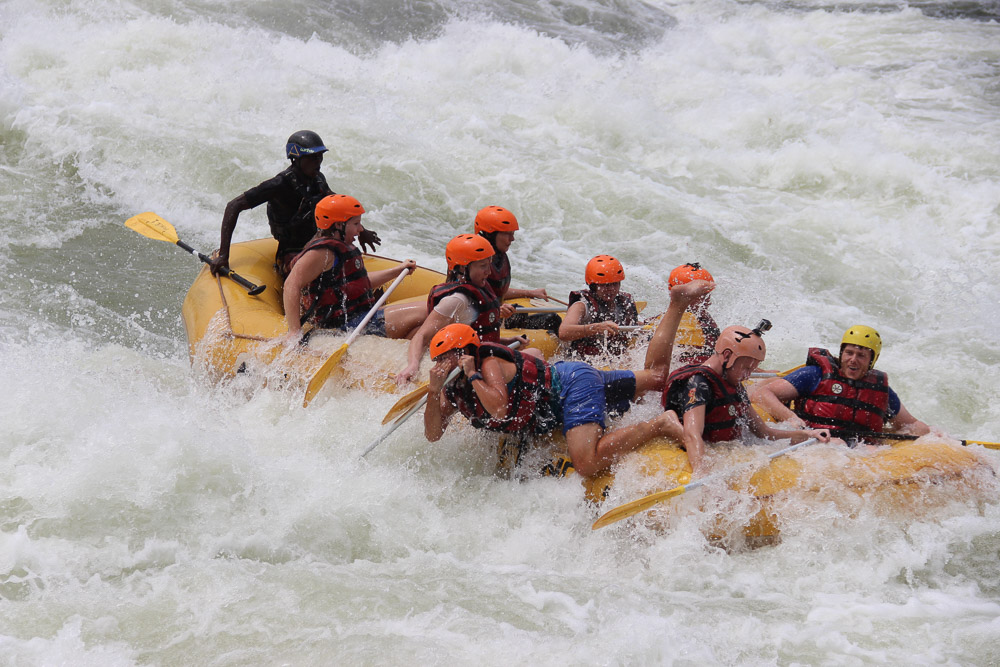
Emily (in the blue shorts) manages to hold her nose as she takes another tumble form the raft
We’d spent a few well-needed days off the bike at the Nile River Camp in Jinja, which is a secluded and peaceful backpackers that overlooks the White Nile. The rafting was of the many activities in the area they offered. I’d only ever rafted in the freezing waters of New Zealand, North Wales and Northampton before, so I couldn’t resist the warm waters and reliable rapids of the White Nile.
From Jinja, we made our way towards Kampala. But we had an important stop to make first.
When my camera smashed in Ethiopia, I needed to get a replacement sent to me quickly and, crucially, without being liable to a ludicrous amount of import tax. My mum swung into action and contacted Sister Mary Costello, a nun she knew from her time working in Zambia 50 years ago but who now lived in northern Uganda. Sister Mary put her in touch with someone she knew was travelling from Dublin to the convent in Mukono, near Kampala and also to another nun who was to travel from London to Dublin. The new camera thus made the trip from Hampshire to London, then from London to Dublin and on to Kampala.
We stopped in Mukono to meet Sister Mary – a name I’d heard over many years. It was great to meet her and learn of her order’s work with disadvantaged children across Uganda. Sister Mary also told us many stories from Lwitikila; the village in Zambia where my parents lived and where we are to visit in a couple of months’ time. Thank you mum for your work behind the scenes and to Sister Mary, Kay and the other nuns for welcoming us in Mukono.
After saying goodbye to the nuns and Kay, we continued our soggy ride towards Kampala. For the remaining 25km the traffic was some of the worst we’d experienced in the whole trip. Although the volume of traffic meant speeds were relatively low, the impatient drivers tried anything to make an advantage that meant they drove perilously close to us. We were limited to cycling well off the road on the potholed and rutted dirt. Progress was slow. On reaching Kampala city, it was rush hour so, instead of battling against the motorbikes, cars and trucks on the packed roads, we walked the remaining 3km to our central hotel on the pavement.
In Kampala we met with Anna, an old friend of Emily’s who just happened to move to Kampala a week before we arrived to start a new job. We’re thankful to Anna because she used some of her precious luggage allowance to bring out couple of essential items for us: we now have a chain whip!
We also met up with ‘Pikey’, another friend of Emily’s who’d made the trip down from his home in Juba, South Sudan, to see us for the weekend. ‘Pikey’ has been pivotal to our journey through East Africa and we can’t thank him enough for sharing his knowledge and contacts in the region. It was great catching up although quite a bizarre experience playing croquet in a garden in Kampala whilst being watched over the fence by the locals.
Whilst in Kampala, we visited the Rainbow International School to tell the kids about our trip. We knew that a couple of journalists would be there but what we didn’t expect was that a full press conference had been organized. We sat at a long table and spent half an hour or so fielding questions form the journalists lined up on chairs facing us. As a result, we made the Ugandan national TV news on their prime time news program. Sadly, the message about the charity element of our trip and the work of the Rainbow International School in supporting us was lost from the badly edited segment. And phrases such as “on the cusp of history” and “swashbuckling adventure” were used.
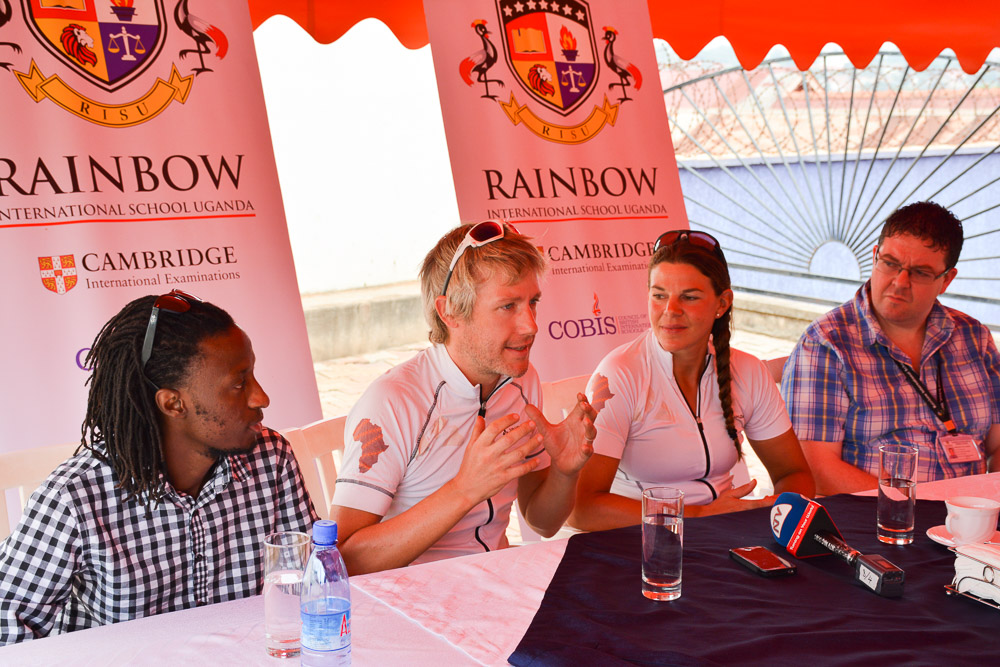
Fielding questions at a press conference at the Rainbow International School.
We spent the afternoon the as guests of the school’s directors, Mr and Mrs Kotecha and met the teachers and some selected pupils.
We are grateful for Mr and Mrs Kotecha for putting us up for the night in a great hotel that overlooked Lake Victoria and we returned to the school the next day to take part in an assembly that had been organized on our behalf.
Once again we were blown away by the facilities and ethos of an International School and how bright (and well-behaved!) the students were.
From Kampala we headed West towards Fort Portal. We spent nights in Mityana, Mubende, and Kyenjojo. The road was in good condition so progress was reasonable, although the terrain in Uganda makes cycling difficult. There’s no flat whatsoever and countless hills to climb – never more than 7% in gradient, but it meant that 50% of the days’ rides were uphill with no real time for recovery. For a 100km ride, 50km is uphill with no real time to recover on the disappointingly short descents.
The kids at the side of the road greeted us warmly although, in these Western parts, they tend to say “goodbye Muzungu” as we approach.
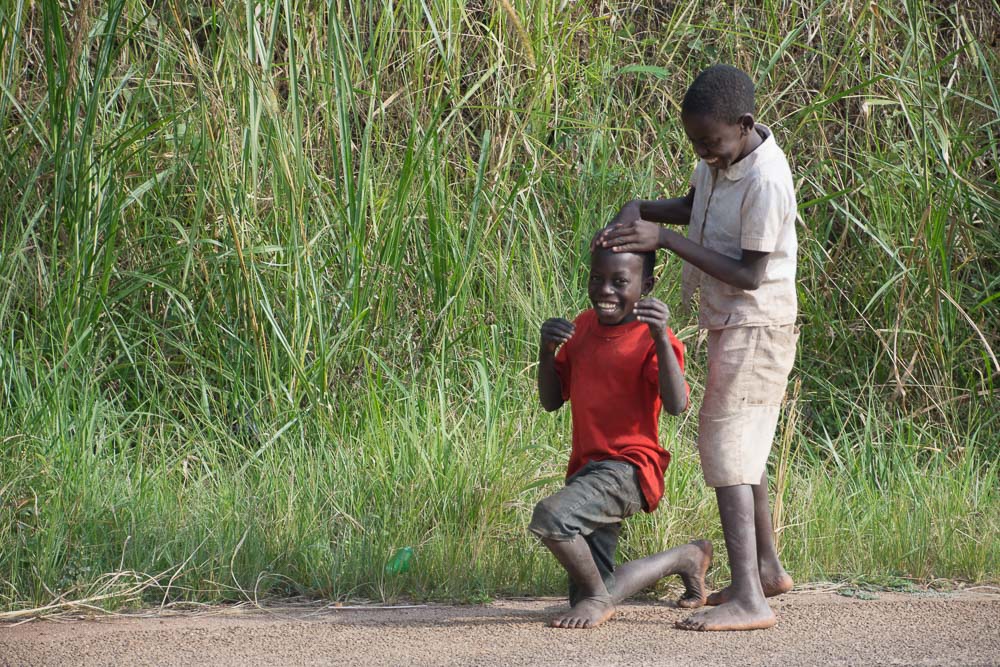
Friendly kids in Uganda. “Goodbye Muzungu!”
We passed miles of banana and tea plantations and also a forest reserve where the sounds of birds and monkeys in the trees made us feel as though we were deep into tropical Africa.
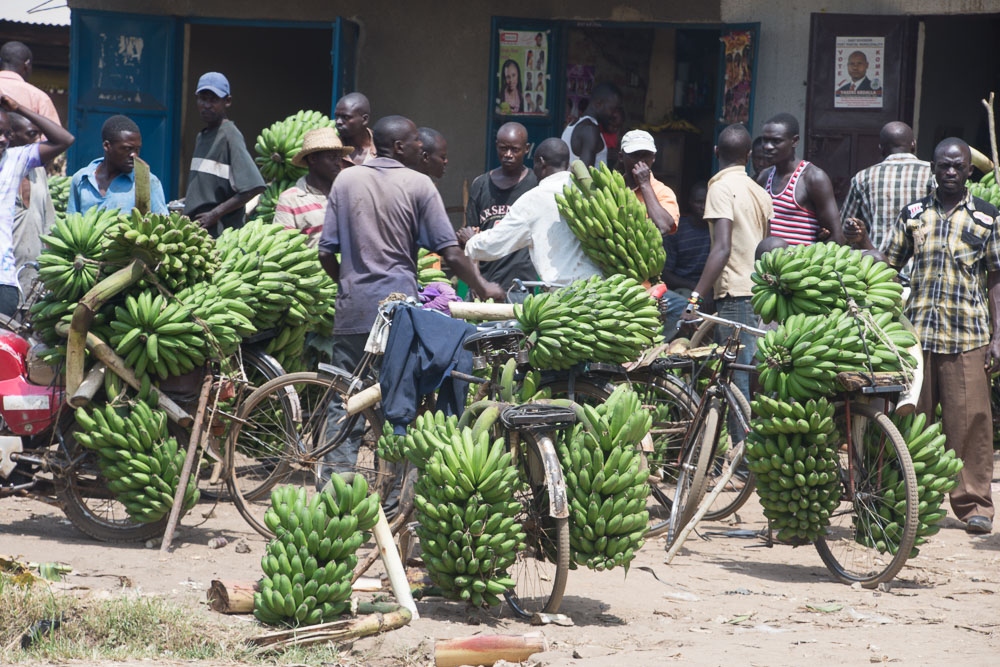
Banana Market
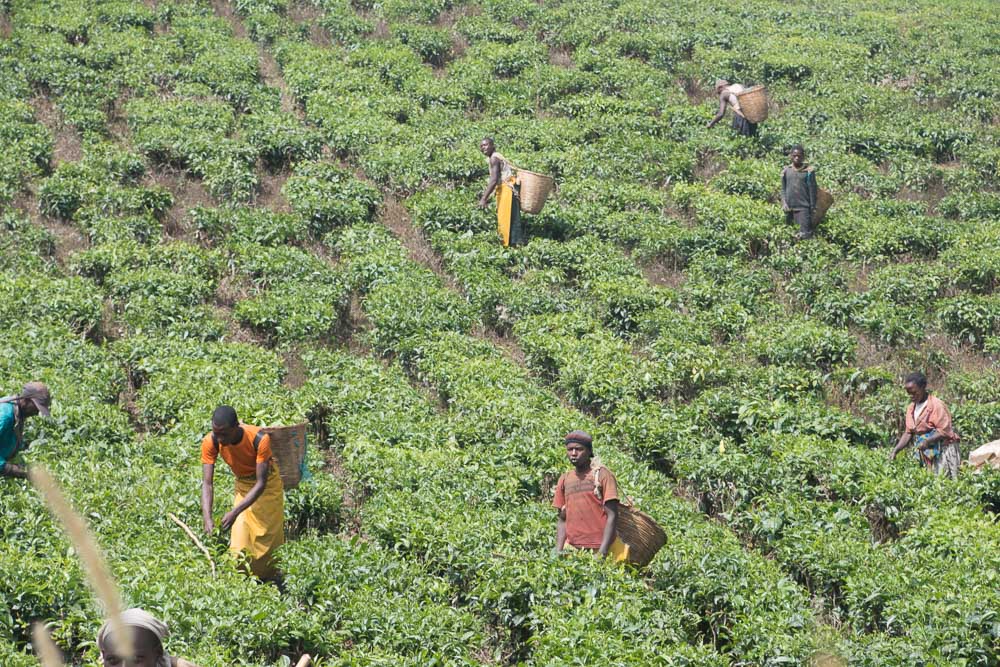
Tea pickers hard at work
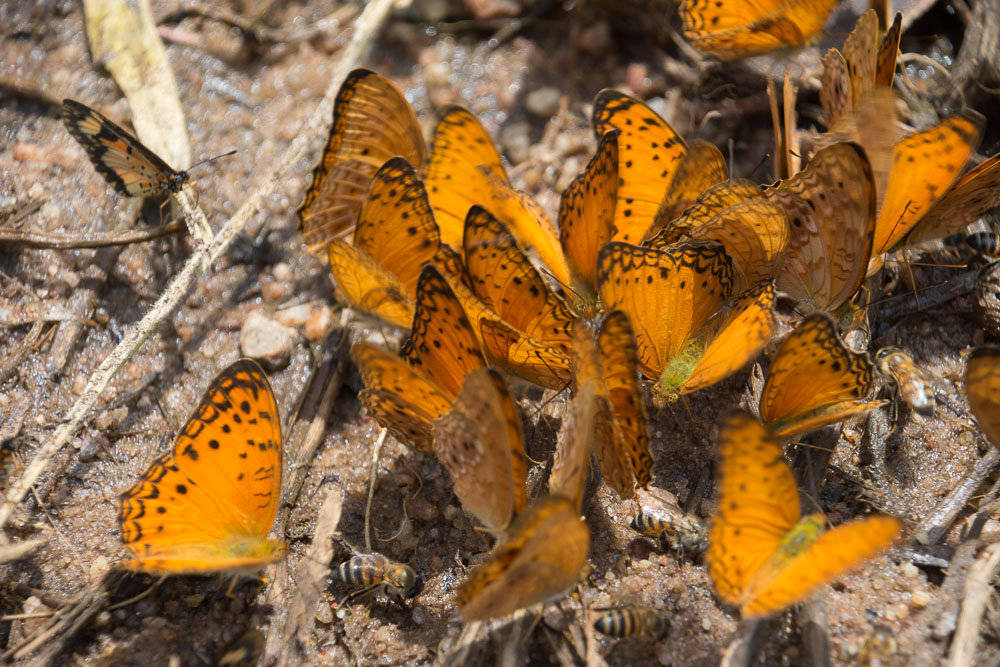
Butterflies
Now in Fort Portal, we’re staying two nights at the RuwenZori View Guest House; a beautiful and peaceful place. We sat at a huge table and enjoyed a sumptuous 4-course dinner whilst chatting to other guests about there travels and work in the area.
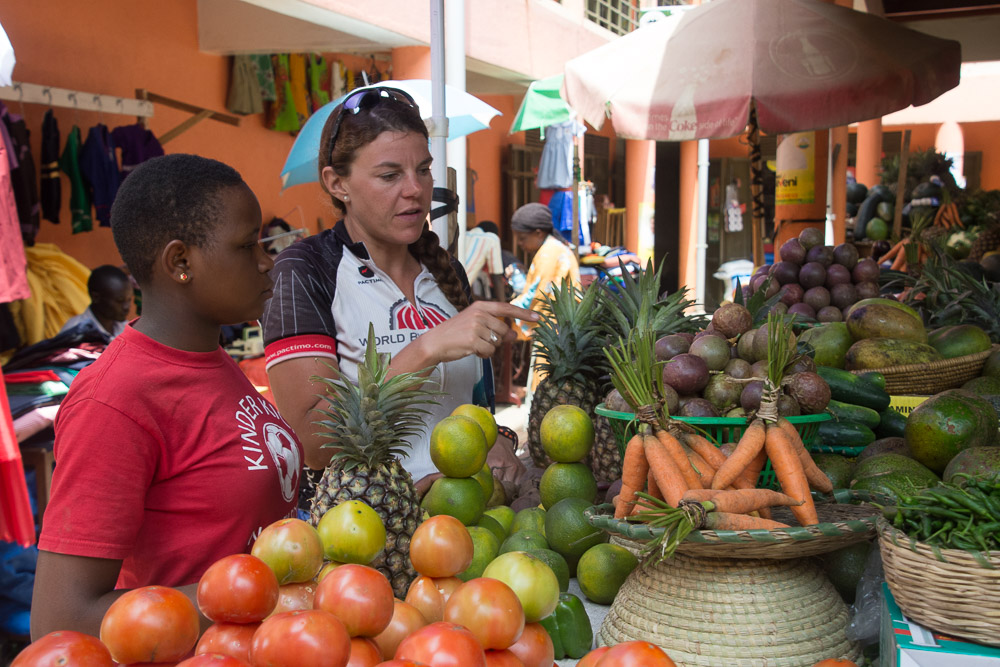
We’ve had some of the best fruit and veg we’ve ever tasted here in Uganda
Electioneering is still in full force. And the government schools are closed until all votes are cast. We leave Fort Portal tomorrow and, for us, it’s a race to get cross the equator and reach the border of Rwanda before the election results are called because there’s talk of trouble on the streets regardless of who wins the election.
If you’ve enjoyed reading this blog post, please donate to World Bicycle Relief. Every penny goes to the great work the charity does in Africa – not to fund our expedition in any way.
What a difference a week makes! Cycling from Lodwar, Kenya to Jinja, Uganda
/in Cairo to Cape Town, Kindness of strangers, London to Cape Town /by Emily Conrad-PicklesUp high: Getting stoned in the Ethiopian Highlands
/in Cairo to Cape Town, London to Cape Town /by James DavisIt was possibly not the wisest choice for two tourists who were about to cycle in Ethiopia for the first time to watch an episode of “The World’s Most Dangerous Roads” the night before we set off. In the episode in question, British comedians High Dennis and David Baddiel drive their sturdy 4×4 the length of Ethiopia and warn of the dangers of poor road conditions and unskilled driving made worse by long distance drivers that are high on khat (pronounced ‘chat’), a leafy plant, which acts as a stimulant when chewed. Together with the mountains we had to climb and warnings of stone-throwing kids, we left Gondar with a sense of trepidation.
It didn’t take long for the warning bells to ring true.
Within minutes of mounting our bikes, each and every man, woman and child shouted at us in some way.
Men would shout “you!” Women would shout “money!” and kids would shout “You, You, You! Money! Money! Money! You You You You You You! Give! Pen! Pen, Pen, Pen”. And so on.
A slight variant was the shout of “Where you go?” A grammatically-incorrect phrase which, after hearing thousands of times a day, becomes irritating. I tried to correcting a few people by telling them “No, it’s where are you go-ING”
But it was the children that were the worse.
Ethiopia has once of the fastest-growing and youngest populations in the world. In fact, 44% of the population is aged 15 and under. And it appeared that every one of those 41 million kids came out to ‘greet’ us as we cycled the 730km from Gondar to Addis Ababa.
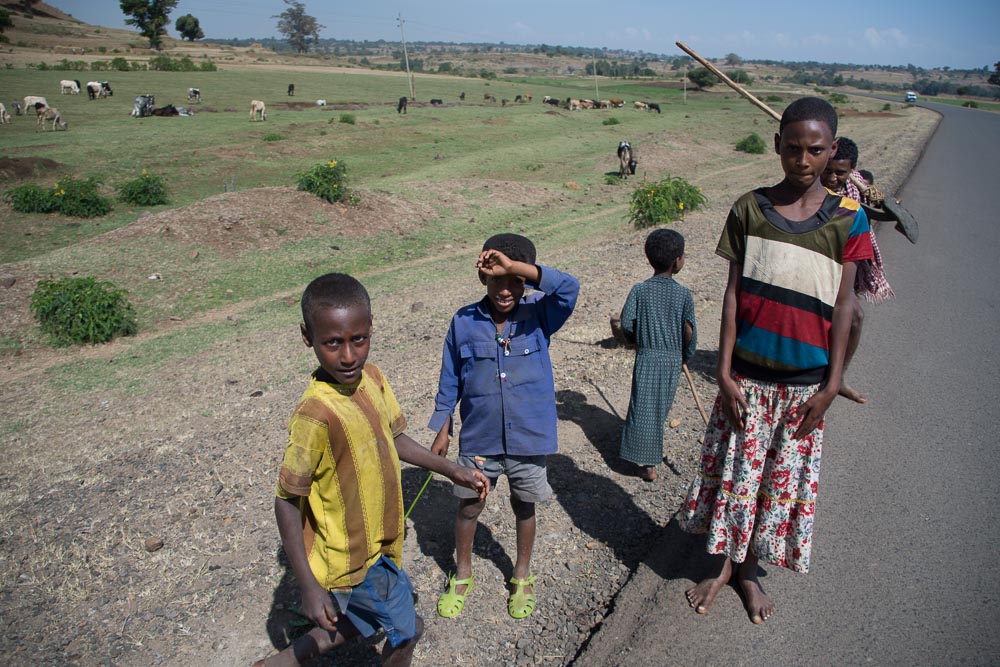
One of the smaller bands of ‘supporters’
Kids by the side of the road would shout at us. Once they’d spotted us, the children who were further away would run hundreds of meters across fields to reach us as we passed in the hope that we’d respond to their shouts of “You! You! You! Money! Money! Money!”
It didn’t take long before the first rock was thrown.
We’d passed a particularly pesky group of children who’d run alongside us for a few hundred meters. When they gave up the chase, rocks were hurled in our direction. Emily got one square in the back.
These kids, although small, would make great cricketers. Stick one on the square leg boundary and they’d have the arm to hit the top of leg stump 9 times out of 10.
They’re great little runners too. Whole swarms of kids would run alongside us shouting “Money, Money, Money!” or “Pen, Pen, Pen!” as we attempted to negotiate the notorious Ethiopian highlands. At times, particularly tenacious kids would follow us all the way up a hill (our heavy bikes often limit us to 5kph up hills) so they could often keep up; this regularly tested our patience immensely.
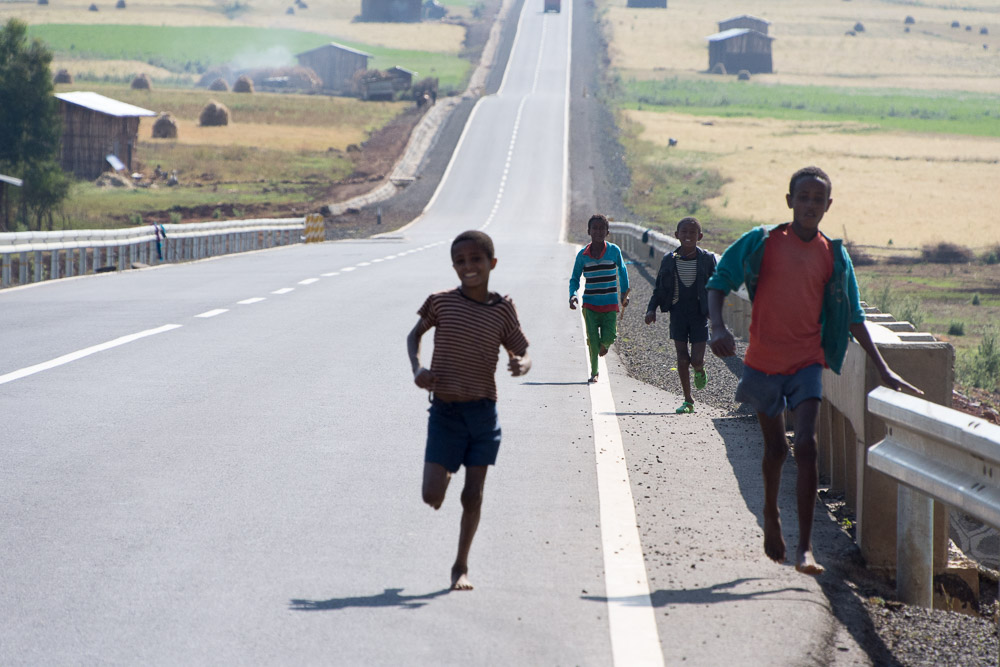
Kids would run for miles for the opportunity to shout at us
We learnt over time that the best tactic was to smile and greet the kids as we approached and then simply repeat everything they said back to them. It didn’t stop the shouts, but it flummoxed them a little. The best way to avoid the rocks being flung was to turn and face the kids as we cycled by until we were out of reach. Which, with their throwing arms, meant cycling whilst looking backwards for a considerable distance!
The shouty and stone-throwing kids are only really a problem in the rural areas. Here, they’re given a few animals to look after when they’re 6 years old and that’s their life. No school. No prospects other than small-scale farming.
In the bigger towns where kids have been able to get an education (albeit in an education system where some schools are so overcrowded that kids have to attend school in alternating shifts) the people are a little more welcoming.
Education is key. That’s why the shouts of “Money! Money! Money!” is so frustrating – and it’s why we’re proud to be supporting an organization, World Bicycle Relief, that exists to help educate kids in rural communities across Africa. Please support them too: donations are being doubled until 31st December 2015.
Please donate to World Bicycle Relief.
Donations are being doubled before the end of December 2015.
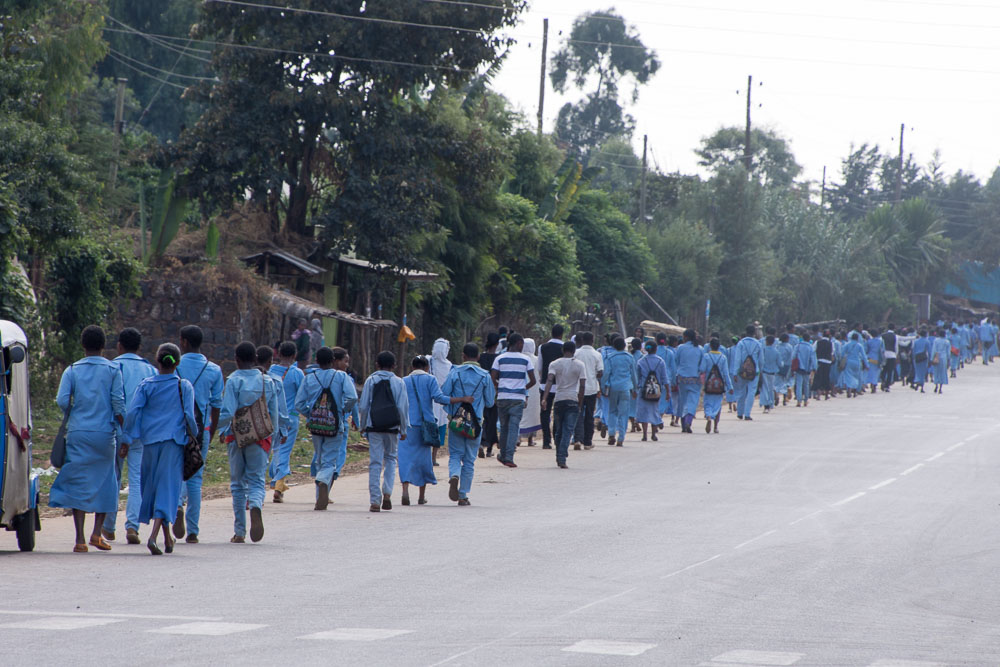
These kids are lucky to get an eduction. Although Ethiopian schools are so stretched that kids have to attend school in shifts.
Midway through one morning, a truck driver coming in the opposite direction saluted us as he passed. With his beer bottle.
Don’t come to Ethiopia if you crave solitude. Wherever you go and whatever you try to do, someone will pop up from the middle of nowhere. Literally, it’s insane. This makes loo stops particularly challenging. And it also makes camping difficult. In fact, as we discovered that you can stay in hotels for around £1.50 a head, we often opted to sleep indoors in Ethiopia to get a little privacy for a few hours.
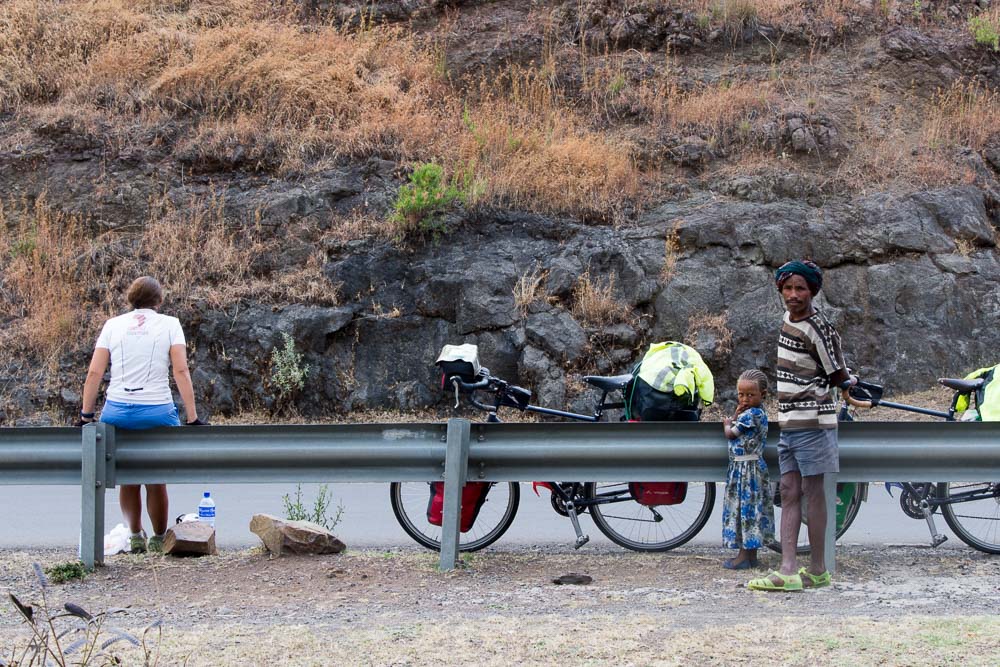
Even a roadside breather is an event
On our first night from Gondar we found a small patch of grass on a steep embankment just off the road and pitched our tent – all witnessed by a throng of kids at very close quarters.
We reached Lake Tana and checked into the Bahir Dar Hotel, a simple guesthouse where the small rooms were set around a quiet courtyard. There was free WiFi when the electricity was on but the whole town suffered regular power cuts – something that’s common across Ethiopia. It was only when we returned to the hotel after dinner when we sensed the atmosphere had changed somewhat and we realised that the oldest profession in the world was still going strong at this establishment. Still, for 100 birr (£3GBP) a night, it was easy for two weary cyclists to turn a blind eye and get a reasonable night’s sleep.
We hit the road early the next day. We’d just ventured past the city limits when a ladies cycling team took us by surprise as they whizzed by. Over the next 20km 3 further large groups of cyclists passed us on their training rides, each group giving us a wave as they achieved speeds we could only dream of.
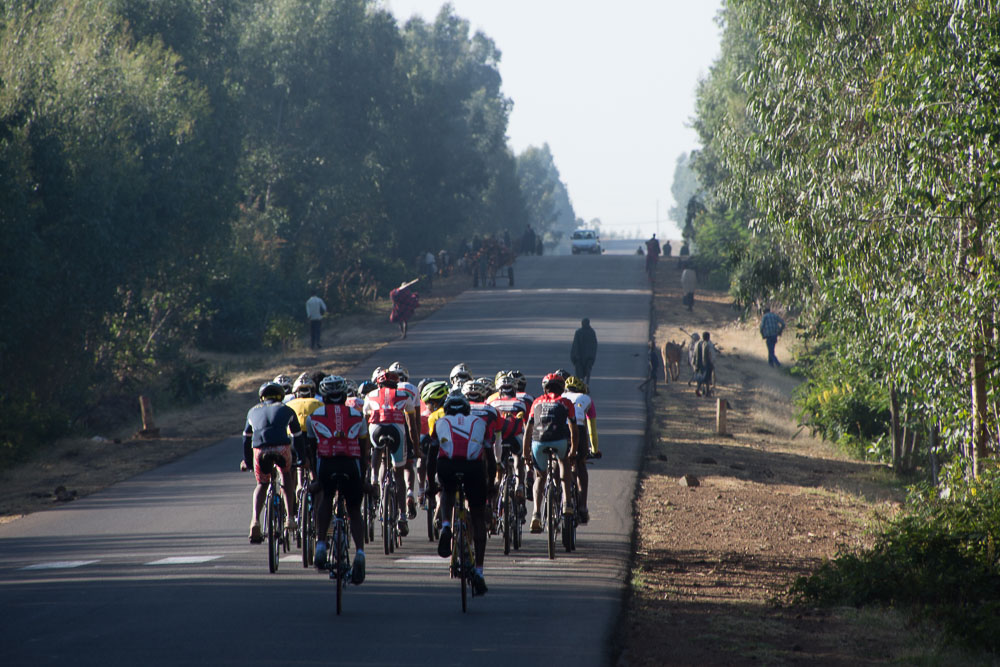
The Amhara Region Cycling Team whizz by
50km from Bahir Dar Emily’s back wheel started clicking so we stopped to take a look at a small village called Wetet Abay. We were helped at the roadside by a couple of lads who’d been cycling alongside practicing their English us but our arrival caused the whole village to come out, crowd round us and stare whilst we tinkered with the bike.
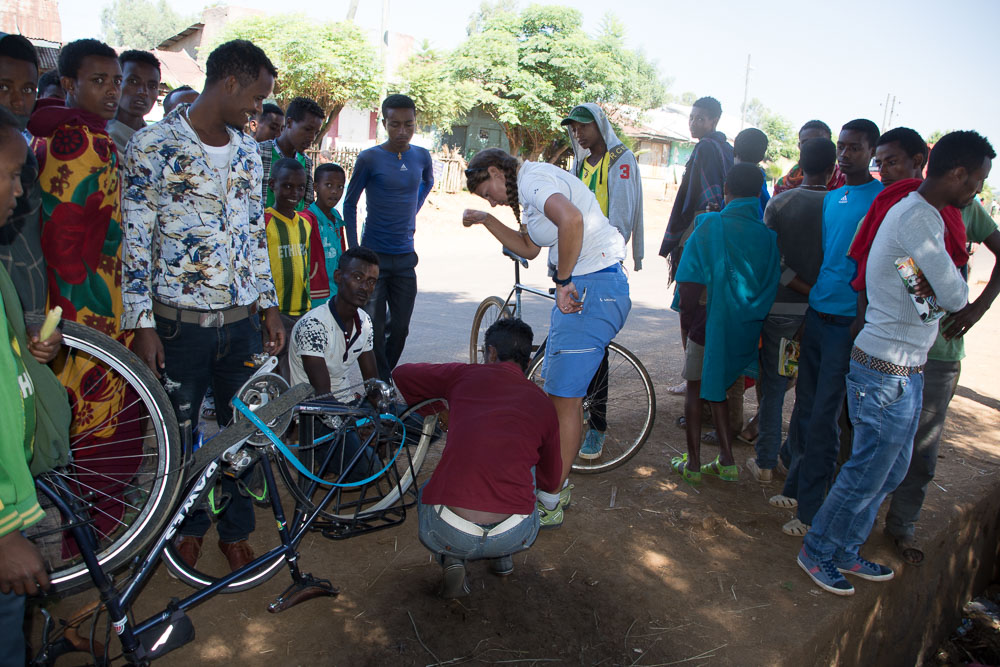
A broken spoke becomes the most exciting thing ever to happen in this village
On inspection, we found a spoke had broken. We thought it would be a simple job to replace but, frustratingly, we had to remove the rear cassette to do so. A job that required a special tool (a chain whip) that we didn’t have.
We were assured the larger village 10km up the road had a mechanic who could help so we flagged down a minibus, hauled our bikes onto the roof and made the short trip. There, the mechanic didn’t have a chain whip either and he started bashing the wheel and used a wrench to undo the rear hub. When he revealed the bearings, we called a halt and decided we wanted to put our trust in someone else who had a bit more knowledge and, ideally, the correct tools for the job. We decided to return to Bahir Dar.
On the minibus back we looked up the Bahir Dar-based cycling team and sent them a few messages to see if they could help us and, once back in the city, we checked back into our guesthouse-come-brothel for another night.
It was by sheer fluke that, later that day, we bumped into a member of the cycling team we’d seen on the road that morning. Molla agreed to meet us the next morning to help us.
At 12:30 Ethiopia time (06:30 foreigners’ time) we met Molla and he took us to the team headquarters of the Amhara region Cycling team. They have a small compound with dormitories, a communal dining area and dozens of battered bikes and parts that have been begged, borrowed and acquired from around the world.
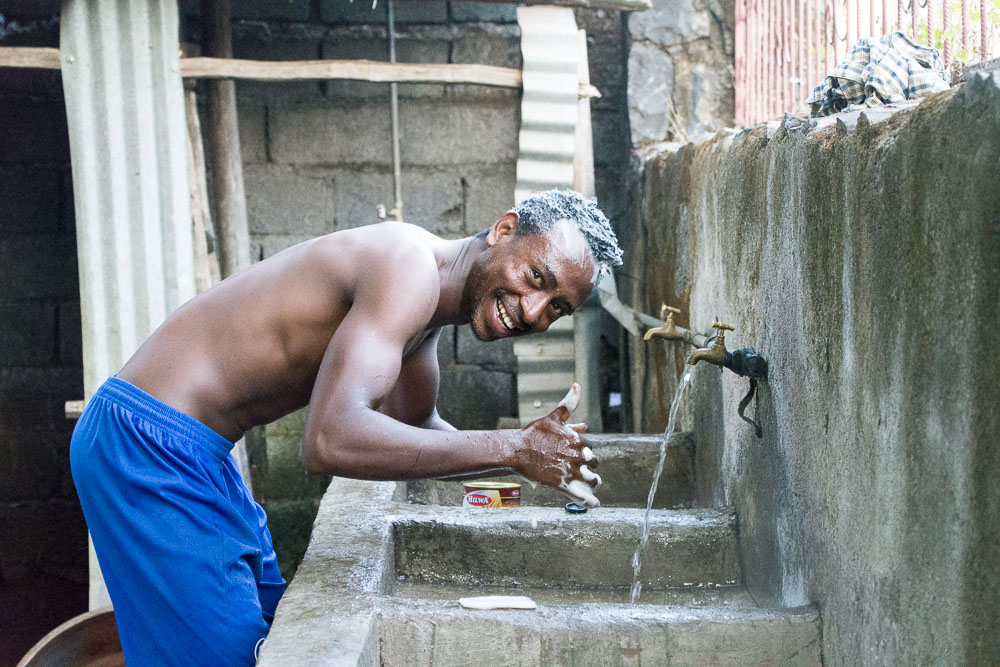
The Amhara Region Cycling Team’s base is a fun environment!
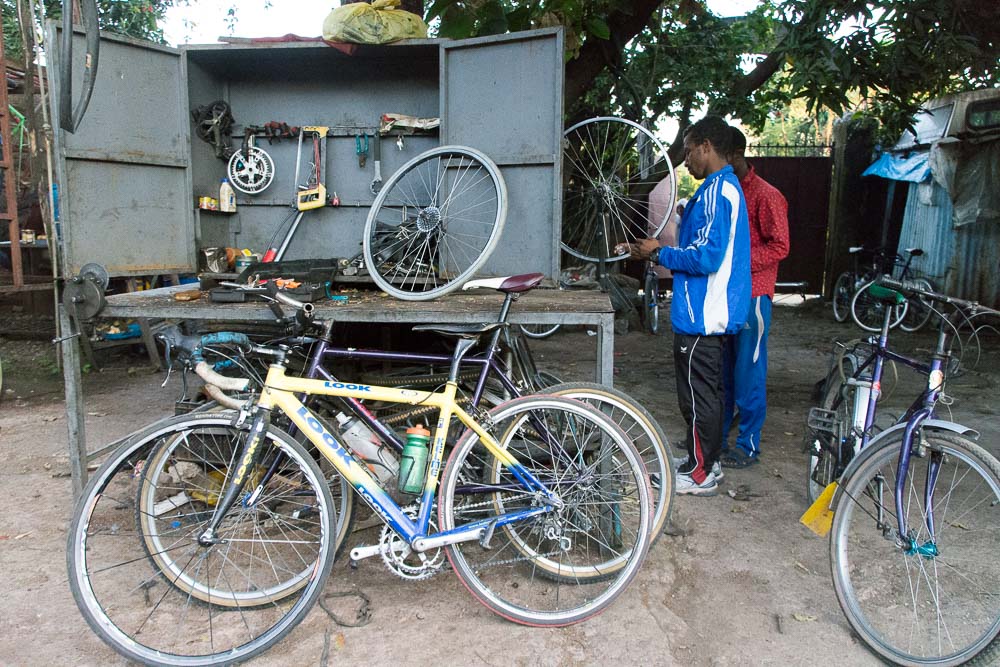
Amhara Region Cycling Team
Molla and his friends set about fixing Emily’s wheel. Not only did they have a chain whip but also they had a wheel-truing stand! Outside, the A-team mustered for a training ride whilst Molla stayed behind to tell us more about the team’s successes and ambitions over breakfast. These guys are incredibly dedicated cyclists but we were astonished by their lack of kit. One rider was using a bike with carbon frame that had snapped. He’d simply taped it up to get back on the road.
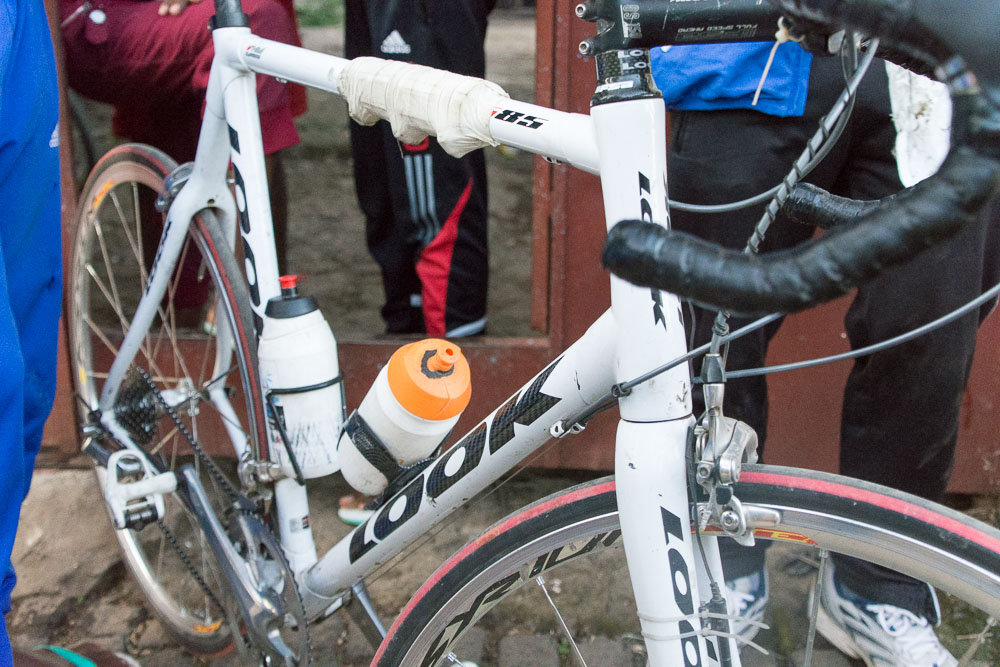
An old carbon frame is taped up to keep it going
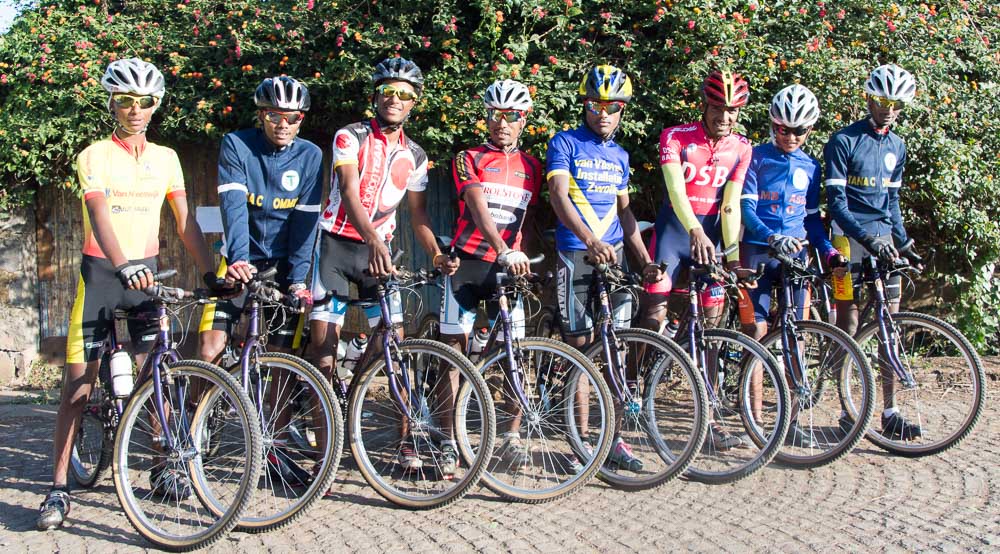
Some of the Amhara Regional Cycling Team prepare for a training ride
We said our goodbyes to Molla and found a minibus to take us back to where we’d stopped yesterday and continued our ride towards Addis, only half a day behind schedule, having promised to do what we could to encourage donations of used cycling kit (such as saddles, pedals, shoes and sunglasses) from friends and cycling clubs back in the UK to help them compete with other regional teams who have access to more.
Back on the road, we made it 170km from Bahir Dar when Emily’s spoke snapped again. A passing charity worker gave us the short 2km lift back up the hill in his pickup to the town of Finote Selam where the mechanic there didn’t have a chain whip either. There was no choice but to ask for Molla’s help again.
We locked our kit and bikes in a hotel room and took a minibus 170km back to Bahir Dar. By the time the driver had stopped countless times to make pick ups and drop offs the journey took 4 and a half hours.
A chain whip (or strap wrench) is a long, bulky and heavy tool and, prior to departure, we’d pondered long and hard as to whether we should take one with us. We reasoned that it was highly unlikely we’d need one so took the risk to omit it from our kit list. Something we now regretted.
We were grateful that Molla and the cycling team were able to fix the wheel again and, as we left, the joker of the team waved us goodbye saying “see you tomorrow!” We are looking forward to staying in touch with Molla and his team to follow their progress and will definitely do what we can to try and help them when we can.
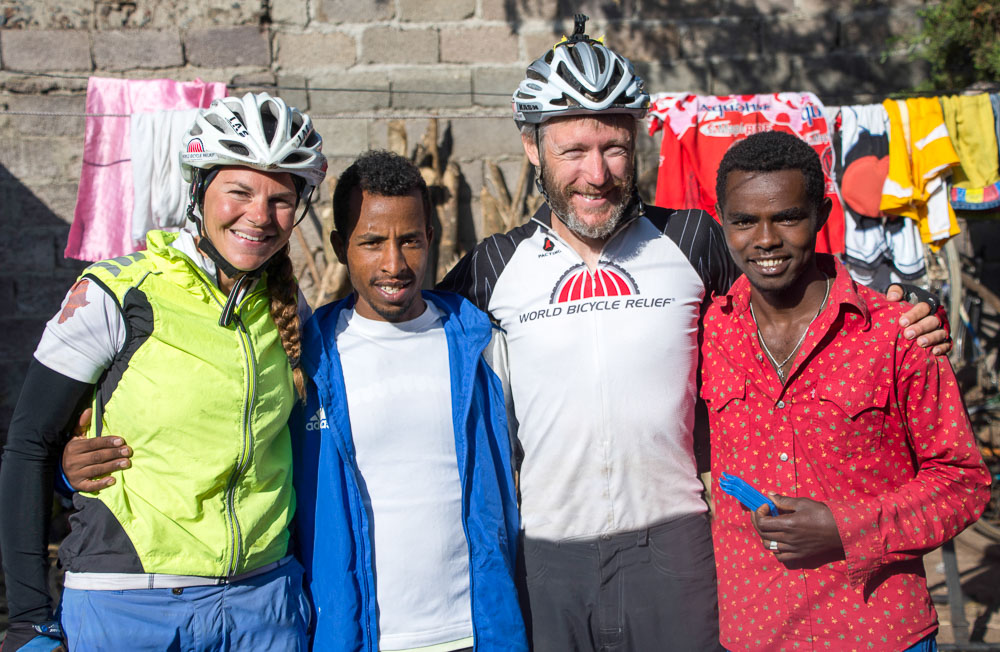
Thanks to Molla and friends at the Amhara Regional Cycling Team for getting us back on the road
By the time we left the cycling team it was now dark and no local minibuses were departing Bahir Dar. The only options were to check back into the Bahir Dar brothel or get a minibus bound for Addis Ababa to drop us off en route. Fearing for the security of our kit in the hotel, we paid over the odds for two seats to Addis. I made a point of getting up close to the driver to smell his breath for any signs of alcohol before we squeezed ourselves into the back seat of a Toyota HIACE minibus.
Not long after departure, the driver pulled over at a brightly lit shop and returned with a big bag of leaves. Khat. This is what we were dreading. Now in the middle of nowhere, we had no option but to hope the effects of the drug, which is a class-C drug in the UK, would only kick in after he’d dropped us off in 150km time.
We made it back to our hotel in one piece. Although it took some time to get the blood back into our legs after enduring the cramped conditions on the back seat.
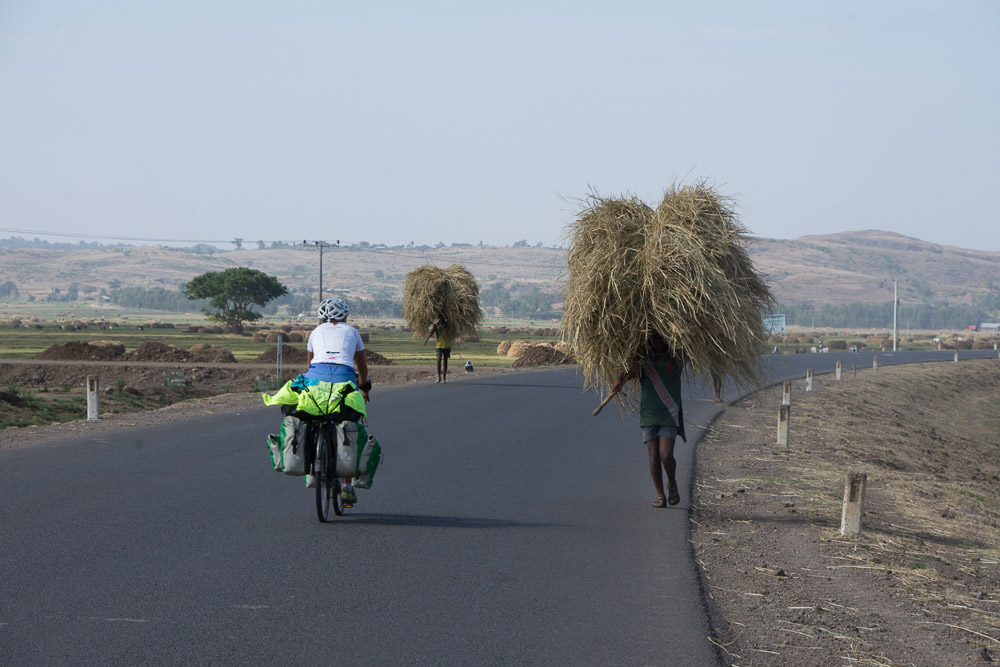
Most farm work is done by hand
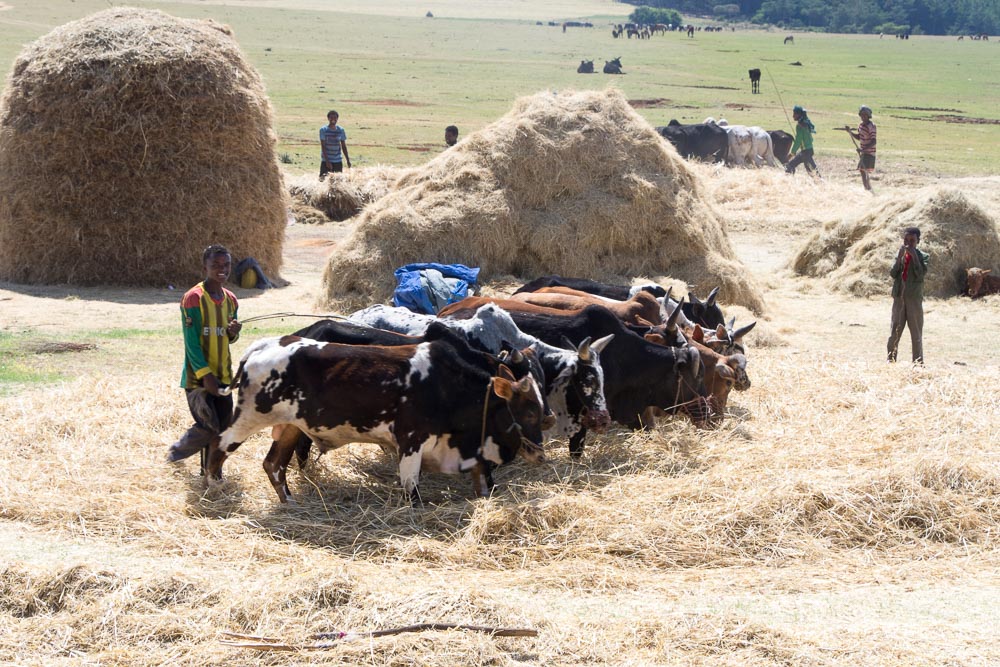
Cattle are used to tread the hay
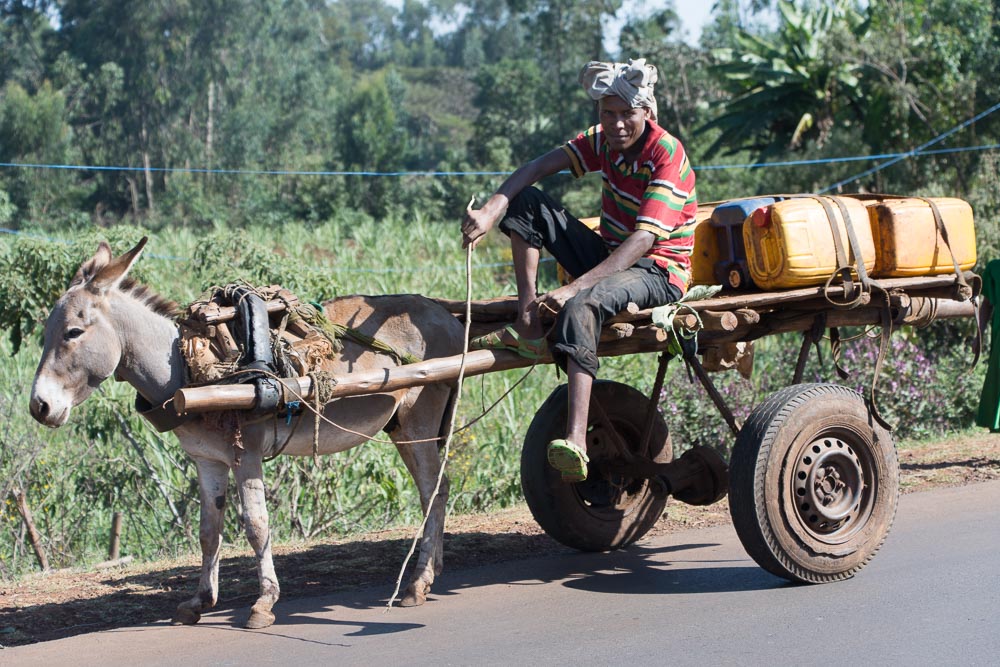
After a couple more days’ ride to the soundtrack of “You! You! You! Money! Money! Money!” we checked into a hotel in Dejen with the aim of getting a good night’s sleep before taking on one of the biggest climbs of the expedition, the Blue Nile Gorge, in the morning.
Our room appeared reasonable on first inspection but, for the life of us, we couldn’t work out how to turn the main light off. The switch in the room controlled the bathroom light. We fetched the manager. After a bit of investigation, we discovered the light in our room was controlled by the switch at the top of the stairs, which was round two corners of the corridor from our room, how logical. We had just drifted off to sleep when guests ascending the stairs illuminated our room as they tried to find their way to their room. I used our precious duct tape to hide the offending switch from further guests.
It’s not just the lights that have kept us awake. The hotels we’ve stayed at have had very bars, which have played very loud music well into the night. Also, Christian Orthodox prayers are broadcast across the town form loudspeakers. Bad luck if, like us, your hotel is close to one. Prayers on a Sunday morning start at 2am and go on through the early hours. The prayers in this video had been going on since 2am and were still going strong at 7am when Emily was racking her panniers.
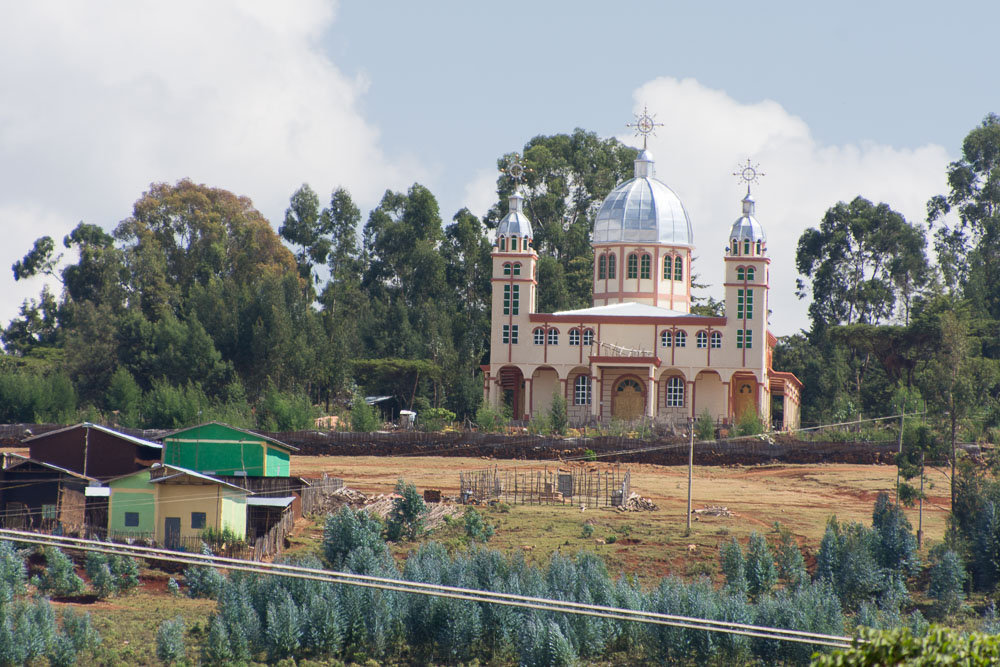
A Christian Orthodox church. The source of some very loud early Sunday morning prayers!
The sign at the top of the Blue Nile Gorge warned of rock falls and “sloppy” conditions. The descent itself was more suited to mountain bikes than fully laden touring bikes. The road surface was rutted and gave way to gravel in some parts as countless lorries had churned up the surface. Our disk brakes took a pounding for the 90-minute descent.
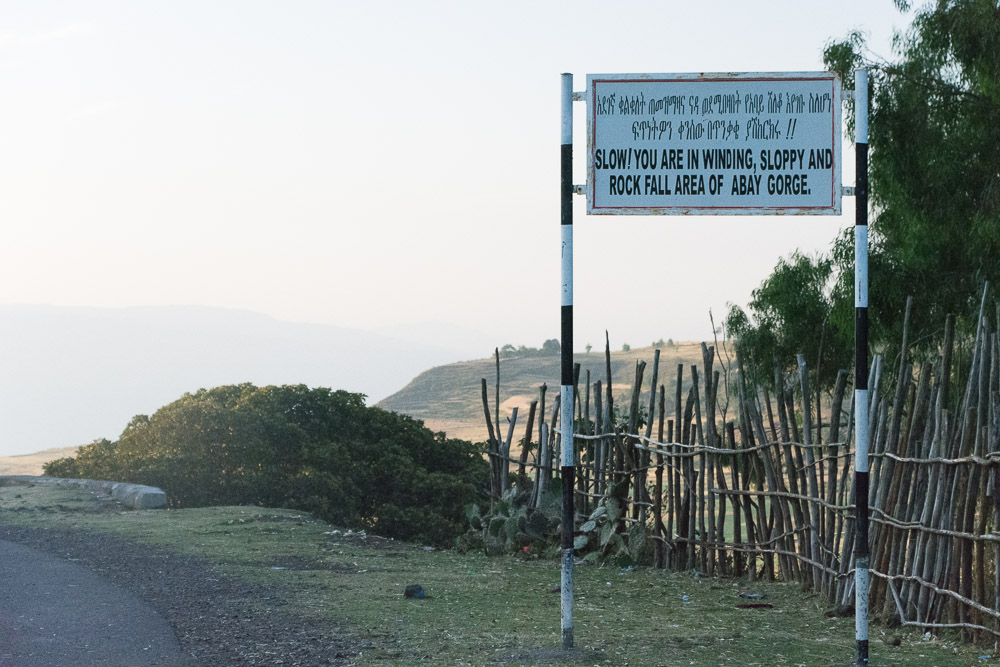
The Blue Nile Gorge is very “sloppy”, apparently.
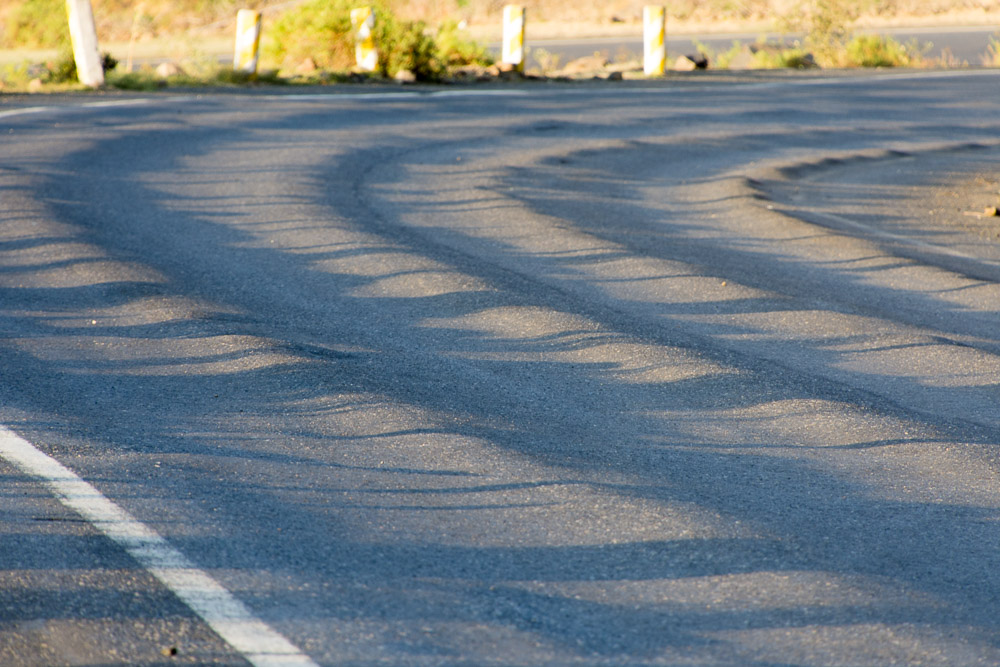
The road down was terrible
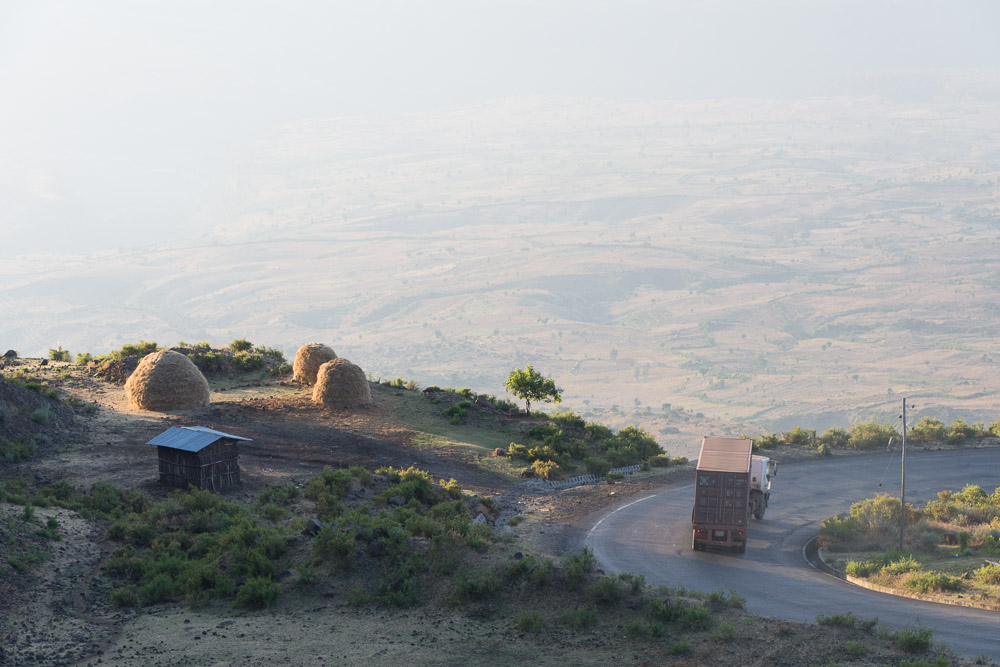
Blue Nile Gorge descent
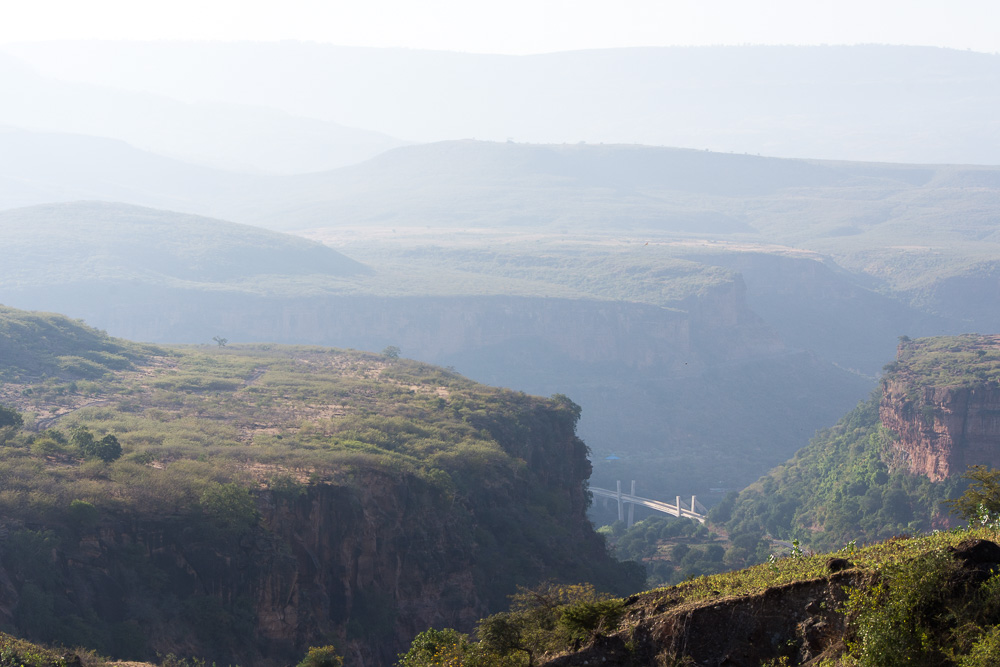
Blue Nile Gorge bridge. Guards prohibit photos any nearer.
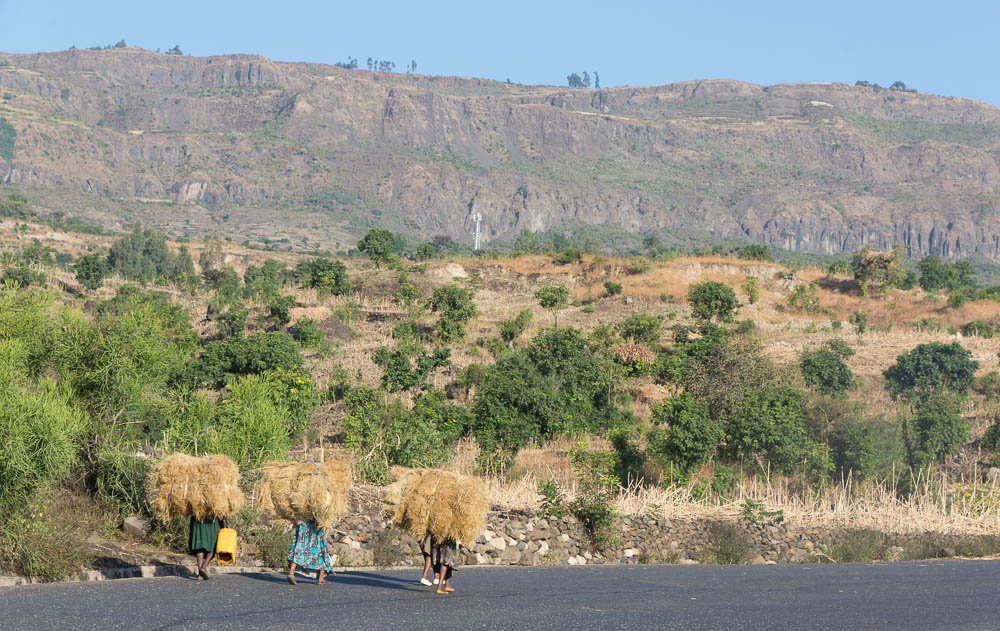
Haystacks being carried up the Blue Nile Gorge
The Blue Nile Gorge world’s second largest canyon and it’s truly breathtaking. But, for us, it was the prospect of the climb out of it that took our breath away.
It’s a 1,360m climb over just 20.05km with an average grade of 6.8%. Several stretches are over 10% and the switchbacks exceed 15%. It took us 5 and a half hours of lung-busting effort to get to the top. Our progress hindered by the altitude, the trucks that belched thick black exhaust into our faces as we struggled up the switchbacks and the countless children that followed with the familiar shouts of “Money! Money, Money!” But, we’re proud to say we made it!
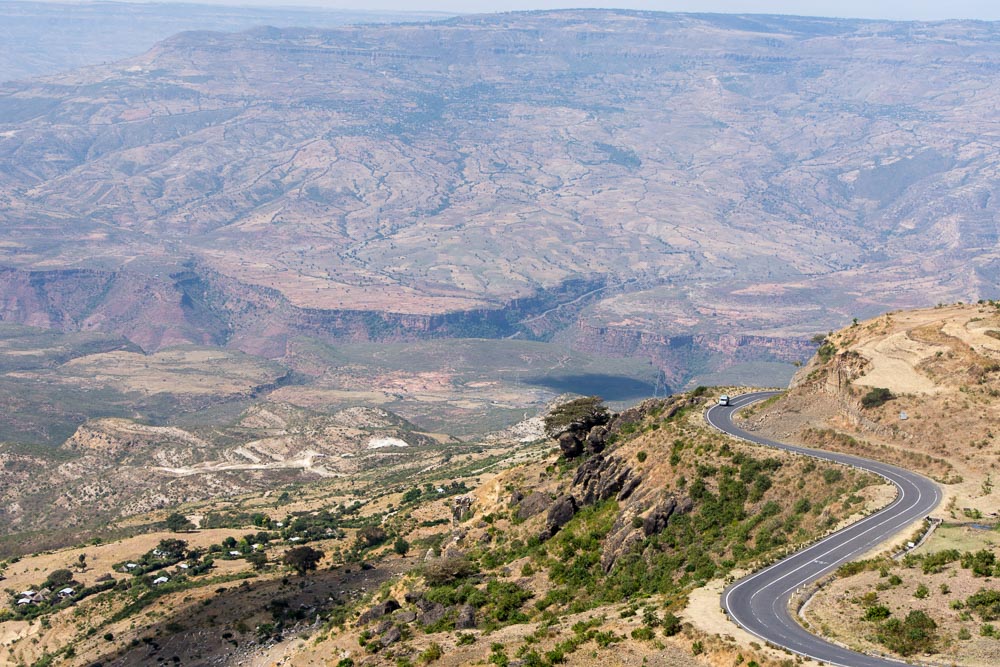
The long, winding and steep road up the Blue Nile Gorge, Ethiopia
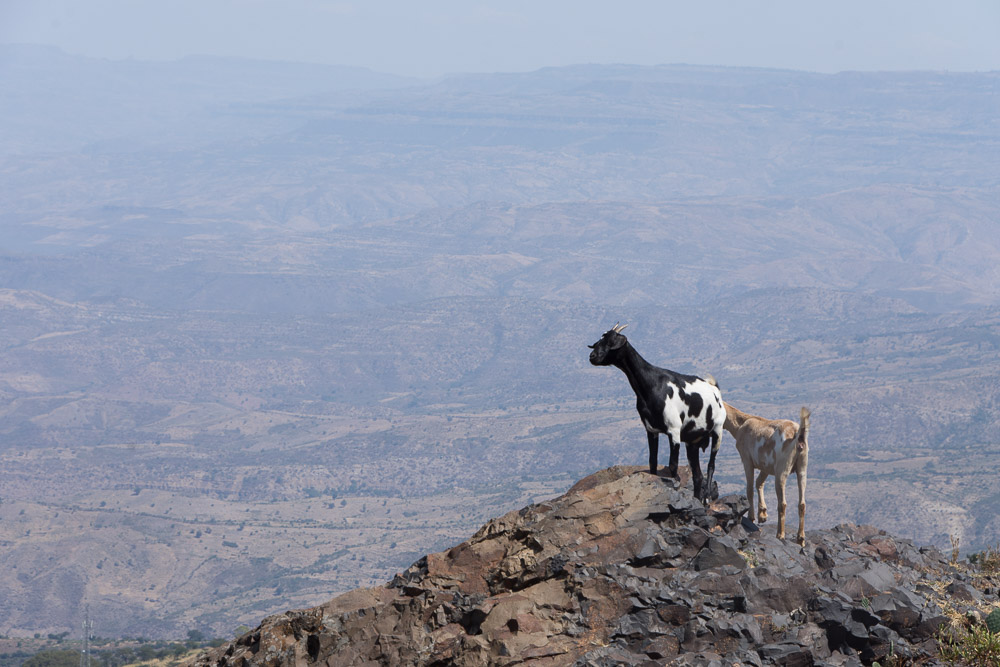
Mountain goats peer into the abyss of the Blue Nile Gorge
Exhausted from the climb, we were descending through the village of Tulu Milki, when, without looking, a woman drove her donkey into the road in front of us. Emily veered left. I had to make the split decision. Do I hit the donkey or do I hit the woman? I knew that injuring or killing a donkey would be expensive (drivers have to compensate animal owners if they kill or injure an animal) so I made the decision to aim for the woman. I veered off the road and down the sloping embankment, taking the woman with me, which propelled me into a wooden roadside shelter where I came to an abrupt stop. I’d knocked the woman’s leg with my front pannier. Apart from shock, she appeared ok. This was until the village surrounded us and talked to her…when, all of a sudden, she started to behave like Ronaldo getting a tap on the ankle. She was dramatically rubbing her leg and wincing. It didn’t take long for the requests of money to come. “You must help this woman” said one man whilst a girl grabbed my arm and shouted for “birr!” I made 100% sure the woman was ok. She didn’t have any cuts or marks so I straightened my handlebars and pushed through the crowd to escape without opening our wallets. The only lasting damage was a wobbly front wheel, which we hoped to fix soon. The donkey was unharmed and took the opportunity to earn a moment’s freedom by running off down the road.
Our traverse of the Ethiopian highlands also took us up to the highest point of the expedition. At 3,115 meters (10,220ft) the air was cold and we battled for breath in the noticeably thinner air.
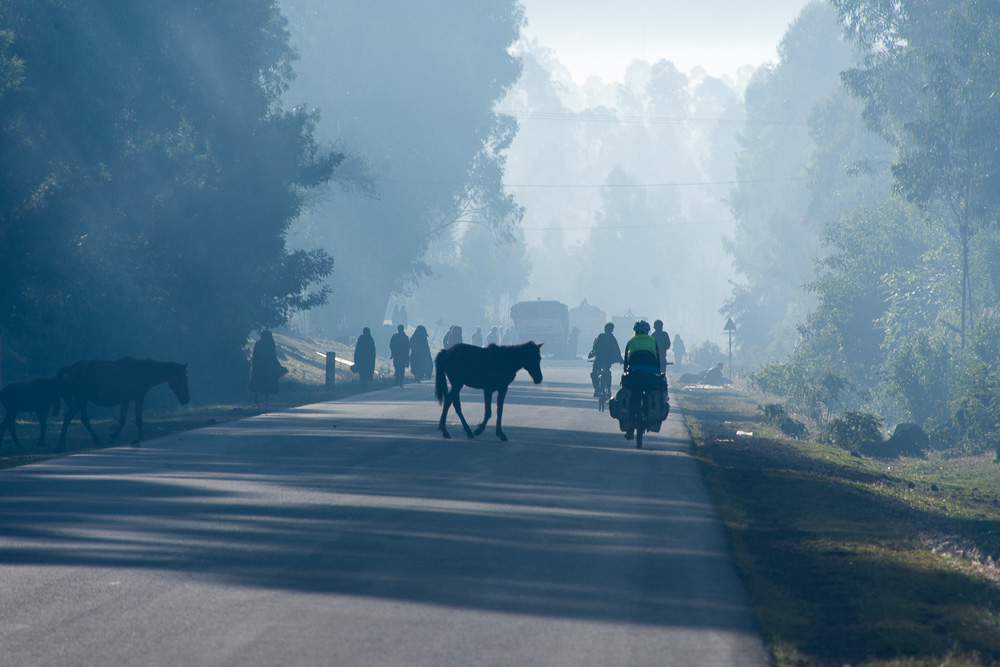
The morning air is filled with smoke from fires in people’s houses.
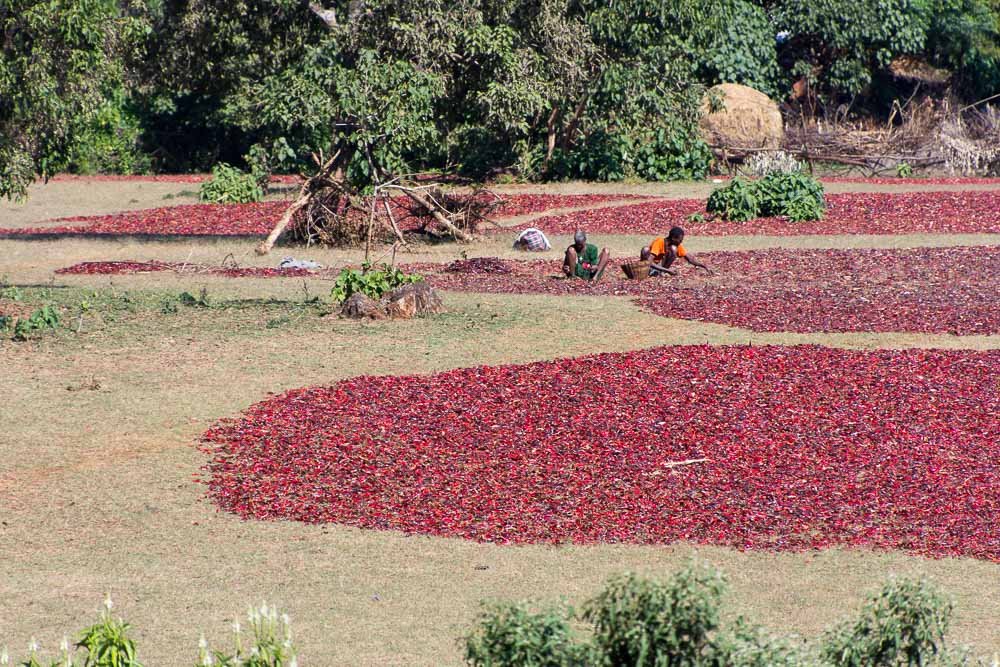
Passing chillis drying in fields
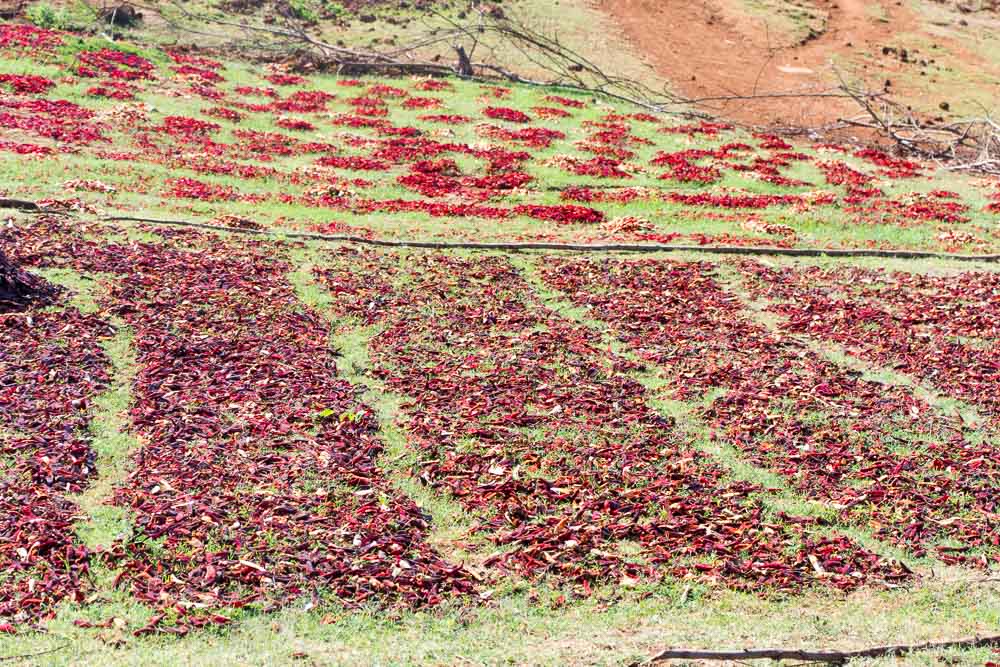
Passing chilli fields
We’d been receiving news that there had been protests across Ethiopia. Some of which were apparently violent demonstrations, which caused casualties and disruptions to roads and traffic. We learnt that the Sudan-Ethiopia border at Metema, which we’d crossed only a couple of weeks ago, had been closed for two days due to clashes.
Of particular concern to us were reports of heavy clashes between protesters and security forces in Sululta, 20km north of Addis Ababa. Heavy gunfire had been heard and the main road blocked – potentially barring our passage to the capital.
As we approached the region, we noticed an increase in police and military presence. Soldiers in full riot gear passed in the back of one truck. Policeman patrolled towns.
We passed through Sululta early one morning and saw evidence that burning barricades had been built across the road but, for us, thankfully we passed through safely without incident.
We learnt that the protests are due to the government’s desire to increase the size of Addis Ababa by building in nearby towns and villages. Something to which locals oppose. From speaking with a few people we have learnt that the government has been in power now for 25 years (unelected) and run a dictatorship internally but gives the external impression that Ethiopia is a thriving democracy.
A travel warning remains for the southwest Oromiya Region where we’ve heard reports that up to 75 protestors have been killed by the government. It’s a region we’ll be cycling close to, but not through.
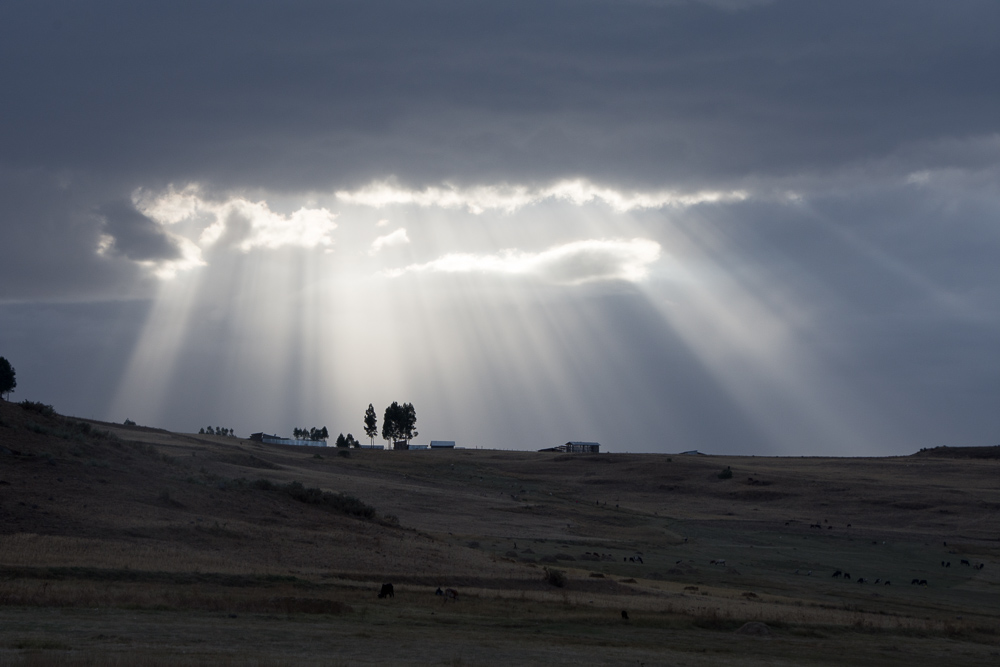
The clouds threatened but we still haven’t cycled in the rain since Romania
In Addis Ababa, we are incredibly fortunate to have been hosted by Celine and Arnaud, teachers at the International School. Although sadly we missed them by two days, they’ve opened their house to us and we’ve spent a couple of days enjoying the use of a washing machine and the luxury of a kitchen. Who would of thought that making spaghetti Bolognese would be so exciting!
We also met up with Miko, a cycling friend of Molla’s, who, with his brother, helped us straighten our wheels after the incident with the donkey. We are incredibly helpful for his help.
Addis Ababa marks the half-way point of our cycle from London to Cape Town. We’ve been on the road just over 5 months and have another 10,000km to go before we reach Cape Town in June 2016.
We’re back on the road tomorrow (23rd December) to make the 800km dash to the border with Kenya at Omorate before our visas expire. We’ll be thinking of and desperately missing friends and family back at home as we cycle south on Christmas day knowing you’ll all be tucking into your turkeys. Please raise a glass to us in the form of a small donation to World Bicycle Relief. Donations are being doubled until the end of December 2015.
Wishing you all a very merry Christmas!
Cycling from Khartoum, Sudan, to Gondar, Ethiopia
/in Cairo to Cape Town, Kindness of strangers, London to Cape Town /by Emily Conrad-PicklesA lot has happened in the past week. Not all of it good. Our stay in Khartoum was extended after I endured two separate stomach bugs but, once rested and all systems were back up and working properly, we set off on our 5-day ride to the border with Ethiopia. The plan was to cross at the Gallbat/Metema border before heading into cooler climes and mountain air, something we were both excited but apprehensive about.
The ride out of Khartoum was quieter than we expected and, although we were cycling on a main road, we had plenty of space. Actually in Sudan the lorry drivers are incredibly patient and will wait their turn to pass you if there is oncoming traffic and most will wave and beep their horns at you. The buses however were another story – coaches whizzing across the country at an extraordinary pace pass you with far less patience and on many occasions forced us off the road.
On our first evening after leaving Khartoum, we’d stopped in a small town to pick up some vegetables and a cold drink – we have often found it hard to pay anything for vegetables in Sudan as the market vendors continue to tell us that we are their guests and refuse payment! Cycling out of town to find a spot to camp we were stopped by a man on the road, “Welcome! Welcome! Where are you going?” which is perfectly normal in Sudan however he then added, “But where will you sleep?” – so we stopped to chat and before we knew it our new friend, Ihad, had invited us to spend the evening with his family in their compound.
Both exhausted, we kindly accepted his invitation, as we were keen to learn more about daily family life in Sudan – and we were not disappointed. Ihad lives with the majority of his extended family (25 or so) in a compound just by the Blue Nile and we spent a fantastic evening meeting his children and his two sisters’ children and shared a meal with his immediate family.
By now, it was nearing 9.30pm and way past our usual bedtime so we were starting to make our excuses to get to bed when I was ushered away by his wife and sister to go and see where we were sleeping. They, however, had hatched another plan and I was whisked away into a room where they wanted to give me a “Sudanese bath”. Now, I know I was probably pretty stinky but I was not expecting what happened next. First, I was given a nightie to wear and told to hover over a scented fire and then before I knew it, they were lathering my body in a sort of body scrub which was rubbed into my arms and legs until most of my skin had fallen off. I have to be honest; I found the whole thing a little traumatising as I sat there trying to be polite, but at the same time slightly overwhelmed by my impromptu scrub! I just about managed to convince them that they shouldn’t put a bottle of olive oil in my hair, as it would run into my eyes the next day. I was then given a traditional Sudanese outfit to go and greet James before bed!
The next morning we were invited to a breakfast celebration as Ihad’s niece’s 2-year old son was getting circumcised. So, after tea and biscuits, we made our way across the town to the party.
Ihad had been to the market early to buy a lamb to feast on. Thankfully, by the time we arrived, the lamb had already been slaughtered and the circumcision had been performed – both tasks James had been willing to perform with our Swiss Army Knife.
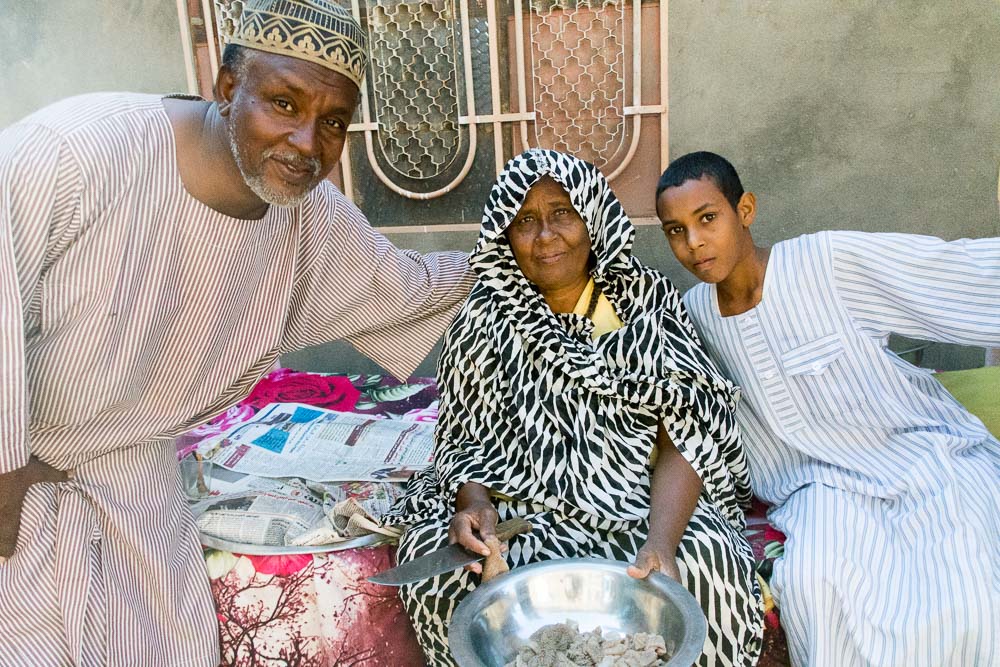
Ihad, his mother and son. Ihad’s mother was preparing the sheep’s stomach for the celebratory breakfast.
Sadly we couldn’t stay for too long as we needed to get on the road but the Sudanese hospitality was amazing and we felt very lucky to have been invited. Although we couldn’t help notice the forlorn look on the face of the poor lad who’d had the circumcision as he lay on a bed recuperating quietly whilst his extended family celebrated around him.
Back on the road, we made our way to the border where we were due to arrive on Monday afternoon – 3 days ride away and around 340km. The landscape was beginning to change. It’s harvest time in Sudan and the farmers were busy in the fields and as we passed through smaller villages we started to notice a change in the people too with lots more shouting from the sidelines! The conditions were tough – a fierce cross wind had rejoined us and the temperatures were soaring once more; our Garmin actually hit 58 Celsius at one point but nothing we were not used too.
But then something changed. At the end of the next day I started to feel ‘not quite right’. We put it down to dehydration and stopped a little early for the day to rest up and drink lots of delicious warm filtered water! For the next two days, things didn’t improve; I was managing around 30 minutes of cycling at a time before having to stop to sit down off my bike, it was like someone had turned off the generator, there was nothing left. We took the decision to have much shorter days, stopping for water and Cokes whenever we could and it was a matter of taking things one step at a time.
Just to add to the fun, I left my wallet behind in a small town where we had stopped for a few hours so that I could rest which left us in quite a tricky situation. We returned 20 minutes later but it had gone. We were still a couple of days from the border and faced with the prospect of no money for food and most importantly, in the state I was in, for sugary drinks. An exceptionally kind man came to ask us what he could do to help us although short of getting the wallet back, there was not much that he could do.
Panic set in – not because of the contents of the wallet as we have always been careful to only keep one credit card in there and limited cash – but due to the lack to cash and the seemingly never ending road to the border ahead.
What followed was unexpected and quite amazing – the kind man turned to the dozens of people crowding round us and organised a whip-round asking people to spare some money for us. He apologised on behalf of his people and handed us around 70 Sudanese Pounds (around £7) – which was more than enough to buy enough bread, vegetables and eggs to keep us going! We have been touched by the extraordinary generosity of the people here and will be forever grateful for his help.
Another day had passed and progress continued to be slow. After another extremely hard day, we camped around 25km from the border to Ethiopia, which we made the next day by around 11am after an early start.
An incredibly hard decision needed to be made. We could continue to cycle, knowing full well that the mountains were right in front of us, knowing that we were not going to pass through any decent towns until the city of Gondar, 180km across the border, or we could take a bus.
We both agreed before we left home that we were not going to take a bus unless it was an emergency, our bikes were broken, the road was completely impassable, security risks or for health reasons. And I’ve never been one to quit – no matter tough it is – we set out to cycle to Cape Town and raise money and awareness for an incredible cause and did not want to have to stop. However, I just did not have anything left in my body whatsoever. Every time I tried to cycle I thought I was going to fall off my bike and I have lost count of the tears I have shed in the process and so, regretfully, once we were over the border into Ethiopia, we took a bus to Gondar where we are now resting up in a little hotel (L-shaped hotel) which has warm water and a bed. I’ve no doubt all will be right as rain within a couple of days once I have rehydrated and I’ve managed to eat some more and we can continue our adventure in the Ethiopian Highlands.
One thing is for sure; I could not have got through the past few days without James and his tireless support, words of encouragement, patience and love. I feel bloody awful that I have forced us onto a bus, but I know that it was for the best and now it is all about a focus on recovery and regrouping.
Getting a bus: James’s perspective.
When we set off for London on 12th July, the aim was to cycle all the way from London to Cape Town as ‘purely’ as possible. By pure, I mean that we would only be forced off our bikes if absolutely necessary.
Yesterday we got a bus. And I want to explain why we did so.
Sudan has been relentless. Sure it’s been flat. But the lack of gradient only goes some way to make up for how tough it’s been.
Imagine cycling the equivalent of Land’s End to John O’Groats through barren desert with only 4 towns of any significance en route, no shade, very limited water resources and battling against ferocious winds that whipped up sand that stung the skin. We arrived in Khartoum shadows of our former fighting-fit selves.
Add stomach bugs to the mix. I was able to get over mine by the time we reached Khartoum but, throughout the stay in Khartoum, Emily was unable to rest and rehydrate as she would have liked.
We extended our time in Khartoum but the following days were the toughest we’d experienced. Emily wasn’t in a great place so progress was slow and we dramatically reduced our daily distances. Where before we were cycling 120km per day we were now barely managing 60km. Emily had to stop every 2km or so and cower under thorn bushes for shade and retched at the roadside.
Emily is not a quitter. A GB (age group) triathlete and Ironman competitor, her fitness is not an issue. She’s also been whacked by a few lacrosse balls in her time so knows what real pain is.
One of our stated objectives before we set out was to ensure the expedition was safe. The remote Sudanese plain is not the place to get ill. It was 500km back to Khartoum or 200km ahead to Gondar. Staying put was not an option. Firstly, we were far from medical help. Secondly, even resting in a stifling tent, which in itself can be hotter than outside, was not an option.
Taking the decision to get a bus was painful. But not as painful as seeing Emily suffer and deteriorate visibly without showing any signs of recovering.
Taking the bus meant we missed a 197.5 km section of sealed road which had an ascent of 3,452 meters and descent of 1,947 meters. We’ll be sure to make this up when we get back on the road, hopefully in a few days’ time.
Crossing the desert from Aswan to Khartoum
/in Cairo to Cape Town, Kindness of strangers, London to Cape Town /by Emily Conrad-PicklesThere are two ways to travel independently from Egypt to Sudan. The first is to take a ferry from Aswan to Wadi Halfa and the second is to cross the recently re-opened land border. Neither of which you can cycle (unless, of course, you are Mark Beaumont setting World Records with a full police escort, a lightweight bike and the ability to cycle 300km in one day!). The bus company was not keen to take us with our bikes so we opted for the well-travelled route by ferry.
Our extensive research told us that we needed to be prepared for this trip – we had read a number of blogs where travellers had been refused ticket sales and bumped off boats due to overcrowding even though they had a ticket, so we were keen to ensure that this was not to happen to us. Once we had our precious Sudanese visas we headed to the ticket office tucked away on an Aswan back street and asked for two 3rd class tickets. “Sorry, no 3rd class tickets available”. First class gives you a tiny cabin, second class entitles you to a chair and third class is deck space only. Since we were happy to sleep in our own space on deck on our sleeping mats third class was more than good enough. But not for foreigners it seems. Eager not to cause any fuss, we bought two second-class tickets for the weekly ferry on Sunday.
We got ourselves packed up and ready to go, bought enough food and water for a couple of days and alarms were set for 4am ready to cycle to the port. You see, we’d been warned that we’d need to arrive really early to get to the front of the queue to ensure we got on the boat (one blog we had read mentioned a queue of over 100 people by 6am). So, after practically no sleep we made the one-hour ride through Aswan’s dusty back streets in the dark and made it to the port by 6am. We arrived to find a ghost town. Were we in the right place? Turns out we were so we set up camp by the gate in time for it to open at 9am, bought some tea and did what us Brits do well, formed an orderly queue all by ourselves. It felt a bit like we’d arrived to start queuing at Wimbledon a week early by mistake.
Before long, fellow travellers did start to arrive, with lorries laden with fridges, furniture, fruit & veg and many more household possessions. Still, not nearly as much as we were expecting. Finally the gates opened and the fun started. No less than 10 stages of bureaucracy and border control later, taking at least a couple of hours, we were at last free to get onto the boat. We whizzed onto the boat keen to get a good spot on deck only to find that we were the only people on the boat! Where was everyone? Still feeling a little like we had perhaps got onto the wrong ferry, we set up camp under the life rafts (the only place to guarantee shade all day) and went to sleep for a couple of hours. Around 6pm, once the boat had been fully loaded, we set sail for Sudan, although the deck was still pretty much empty.
After a very cold and windy night, the boat docked at Wadi Halfa around 10am the next morning and before we knew it, we were cycling in Sudan!
Exhausted from two nights without sleep we decided to spend the night in Halfa. We checked into a lokanda, the local name for a budget guest house (at $3 a person, it was a revolting as you might imagine and I wasn’t too sure they were that keen on having me there either). We needed to register with the police on arrival in Sudan, pay our entry fees as well as register for permits to travel outside Khartoum which took some time but was all done at the police station. Next stop was to get our photography permit which turned into a two hour wild goose chase as we were sent from one end of town to another a few times. Finally we found the right place but the man in charge was not there so he told us over the phone not to worry about the permit…we have not had any issues to date in Sudan without this permit and have subsequently picked one up in Khartoum.
From Wadi Halfa we took the road to Dongola, which tracks the Nile most of the way. The wind was behind us and we managed our longest day yet (170km) before wild camping amongst piles of bat poo in a disused building behind a water stop.
In Sudan, you can find water pots alongside the road relatively frequently to allow people to fill up with water – which is vital in the extreme summer heat when temperatures hit around 55 Celsius most days. We’d timed our entire trip to ensure we did not endure these sorts of temperatures and although we did have one day when the Garmin told us it was 50 degrees, it has mainly been between 32-40.
The road to Dongola was very much the same for the next couple of days, although the wind was not quite so favourable. Along the road were small Nubian villages and mining towns where people were so incredibly kind and welcoming. We had heard how friendly Sudan is and it has been amazing meeting so many lovely people. If you stop by the side of the road and someone sees you, they will immediately come and shake your hand and say you are welcome before leaving you to your own business.
We stopped over in Dongola in a small guesthouse and stocked up on supplies before our first desert crossing to Karima, which would take two days. We had plenty of food and enough water with us however, we were now heading southeast and the wind had picked up again blowing into our sides, slowing us down considerably. We’d had our first stomach upset and when, by4pm, we’d still not passed any water stations, tensions were rising somewhat at the prospect of having to ration our water until the end of the next day. We had just about enough with us, but it was going to be tight. Around 5pm we saw what we thought was a building in the distance…praying that it was not a mirage we steamed on ahead to check it out and, to our huge relief, we discovered there was a well and a couple of men living in a big concrete house. We were duly given as much water as we could drink, some dates and offered a bed inside for the night which we accepted without hesitation!
The next day was 120km to Karima, a town famous for its pyramids and home to Jebel Barkal, the southern most point of the Egyptian empire. Along the way, we met our first overlanders! Libby and Paddy and their two young girls were taking a year to drive from Cornwall to Cape Town – it was so lovely to see such friendly English people (the first English people we had seen since Cyprus!) and hear about their adventure.
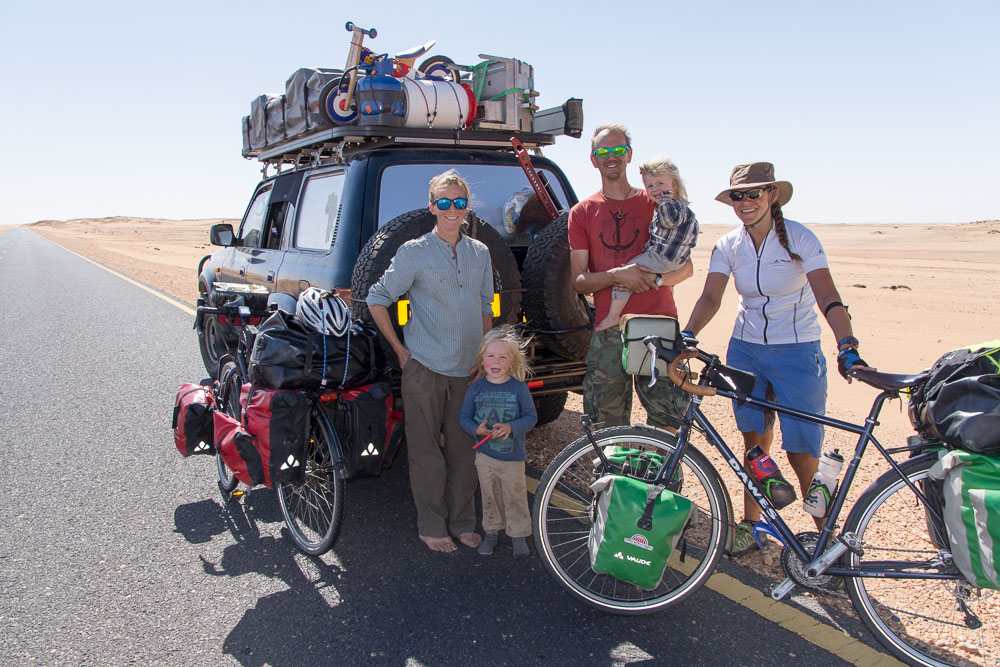
It was great to meet Libby, Paddy and their lovely daughters driving all the way from Cornwall to Cape Town
We mentioned that we were going to wild camp at the Nurri pyramids so we tentatively agreed to meet them later on. The day got the better of us both – the solitude of the desert and driving cross winds were exhausting and we rolled into Karima around 4pm and found somewhere to buy a coke and recharge. We had another 20km to our camp spot and just enough daylight to get there so we set off, excited at the prospect of camping at the pyramids and chatting some more with our new English friends. Unfortunately this was not to happen. Our route took us on a short cut through the town that ended up on a track with deep sand that made pushing our bikes painfully slow and exhausting so after 30 minutes we agreed we were just not going to make it and should fill up with water and find a camp spot. As if out of nowhere, we found a set of water taps and just beyond was a large shelter made from palm trees – a perfect place to camp out of the wind and out of sight! Just as we were setting up our tents two big 4x4s turned up and some extremely charming Sudanese men wanted to check that we were ok! They were on their way to prayers in town and after we assured them that we were fine and had an enclosed tent so no scorpions could get in they pressed on – but ensured that they checked in on us on their way back home! Such has been the welcome we have enjoyed almost everywhere in Sudan!
Once our tent was up and we’d washed, we sat in our chairs to relax for a bit before making some delicious rice and tinned beans. It was only then that we realised that we had accidentally camping right outside the tombs and pyramids of Jebel Barkal just in time for sunset! So, we may have missed the pyramids we were aiming for but we had a lovely surprise! We hope we might bump into Paddy and Libby again on the road as true to their word, they were waiting for us at Nurri Pyramids, just such a shame we never made it there.
From Karima it was time to do our second desert crossing to reach Atbara – this time the Bayuda desert – which would take us 3 days. Unsure what we could buy on the road, we stocked up with enough food for the duration and took as much water as we can carry (around 12 litres each).
It was an incredibly tough three days with a crosswind with us for almost the duration limiting our speed to 12-15kpm most of the way.
We were still having to pinch ourselves though to remember how much we had been dreaming about cycling across a desert and here we were – living our dream (it would be boring if it was easy right???!).
On the second night it was James’s turn to have a stomach upset which left him drained and exhausted for our final day on this stretch – but all was good, it was just 100km to Atbara we could get through it. Not so fast. Overnight a mild haboob had started brewing and, although it was not as bad as some of the storms we have heard about, cycling for an entire day with sand blowing into your face and frankly everywhere else made for a thoroughly miserable and incredibly exhausting day on the bikes. Of course in hindsight we can now look back on it with a smile and put it down as one of our more adventurous days!!
From Atbara we cycled a further three days to Khartoum along a much busier road carrying trucks to and from Khartoum and Port Sudan. Our first night was spent wild camping at some more pyramids – this time the Pyramids of Meroe – the ancient tombs of the ancient Nubian Kings and Queens of Meroe. Meroe was the capital of the Kingdom of Kush and it is thought that these pyramids are over 4,600 years old. Sadly an Italian explorer called Giusepe Ferlini destroyed many of them in a fruitless search for treasure and, although some are being reconstructed, we were shocked at how unsympathetic the reconstructions are. We’ve since learnt that hundreds more pyramids are being discovered every year here in Sudan and it is thought that there are more pyramids in one small section of the northern Sudanese desert than there are in the whole of Egypt! We felt hugely privileged to be able to enjoy these pyramids to ourselves and have the opportunity to camp just behind them and watch the sun go down. All that we were missing was a gin and tonic!
Finally, after 11 days on the go (our longest stint yet without a break) we arrived in Khartoum, somewhat worse for wear. We are extremely lucky be staying at KICS, the Khartoum International Community School and to be hosted by Nigel, Natasha and George (Nigel is the school Principal). I’m not too sure what Nigel thought when we arrived looking a little bit like shrivelled up desert prunes covered in sand dunes! After a shower and some food, we started to feel a little more like human beings and enjoyed our first night in a comfortable bed for some time!
We feel very lucky to be staying here at KICS – thank you so much to the incredibly lovely Winnard family for making us feel so at home (and Natasha we are so sad you could not be here too). This school is extraordinary. Both James and I have both decided we would like to go back to school here and start our education again. Nigel’s philosophy on education is inspiring and the children passing through his school are very lucky. We’ve enjoyed meeting and chatting to many of them during our stay.
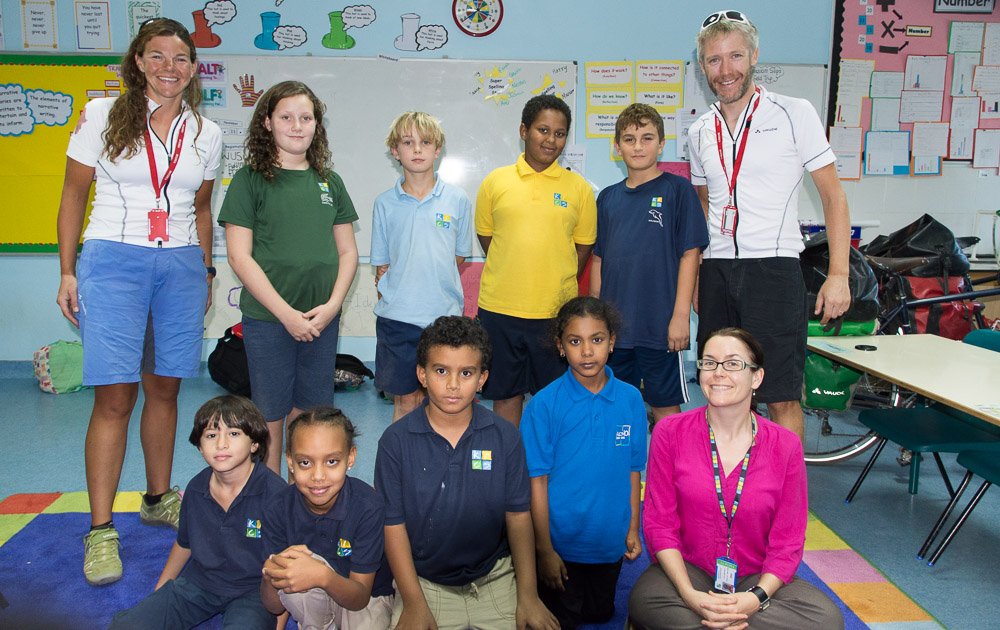
It was our pleasure to meet the Primary Student Council at Khartoum International Community School (KICS). They had some great questions and we were able to tell them about the @powerofbicycles
So, Ethiopian visas in hand, we are getting our kit together to hit the road once again with around one more week in Sudan, we should arrive in Ethiopia by the end of the month. Then life will change as we head into the mountains. Eek.
If you’ve enjoyed reading this blog post, please donate to World Bicycle Relief. Every penny goes to the great work the charity does in Africa – not to fund our expedition in any way.

